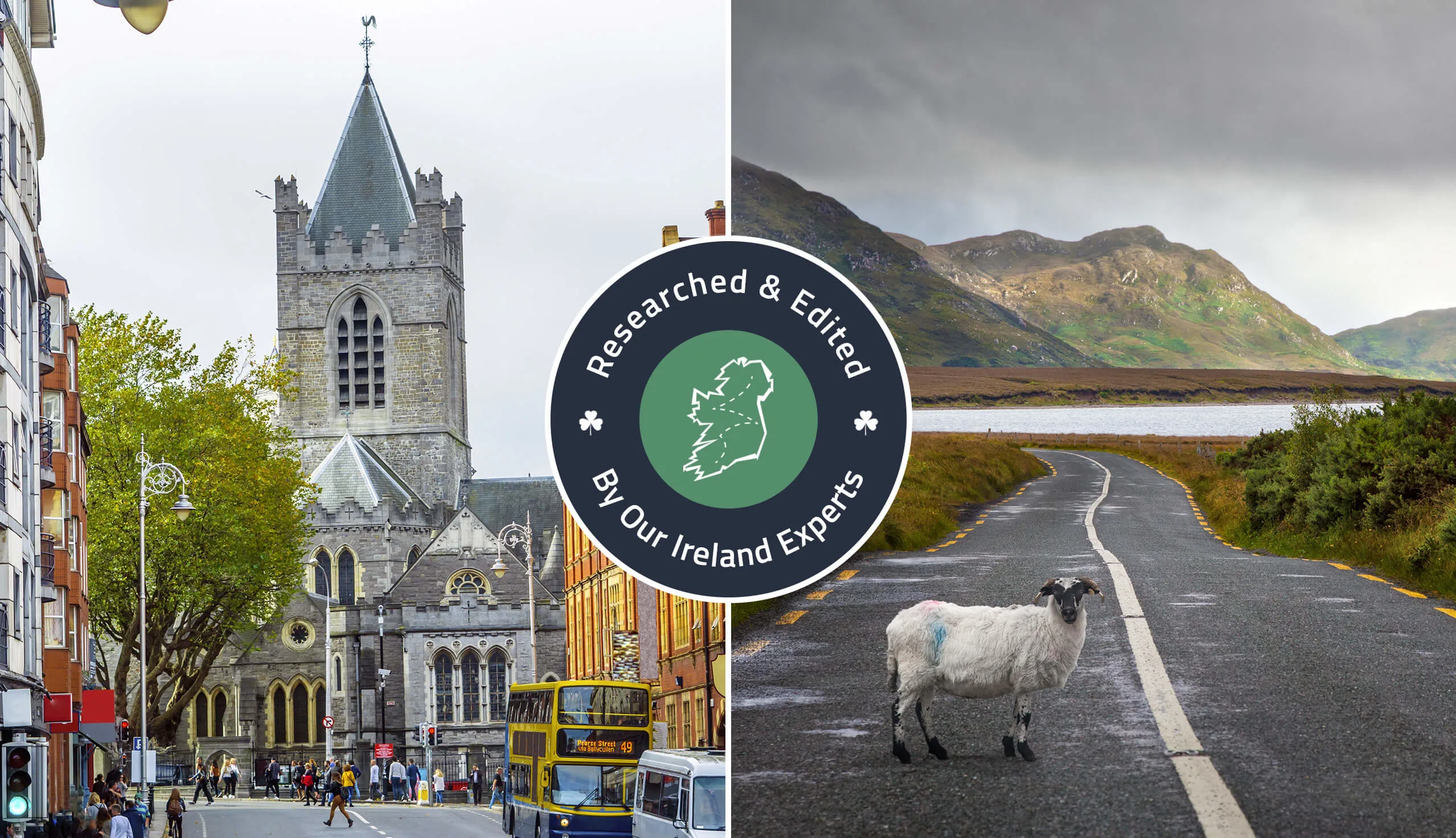Planning a 12-day Ireland itinerary using only public transport can be a pain in the backside… So, we’ve done all of the hard work for you!
We’ve spent 25+ years travelling around Ireland…
The itinerary below has taken that experience (and the many mistakes we made along the way) to create an itinerary that we’re confident you’ll love!
In a nutshell, this 12-day itinerary:
- Has been meticulously planned for those only using public transport
- Has an hour-by-hour itinerary for each day to save you time/hassle
- Follows logical routes that take you to hidden gems, tourist favourites and great pubs and restaurants
Who this itinerary will suit
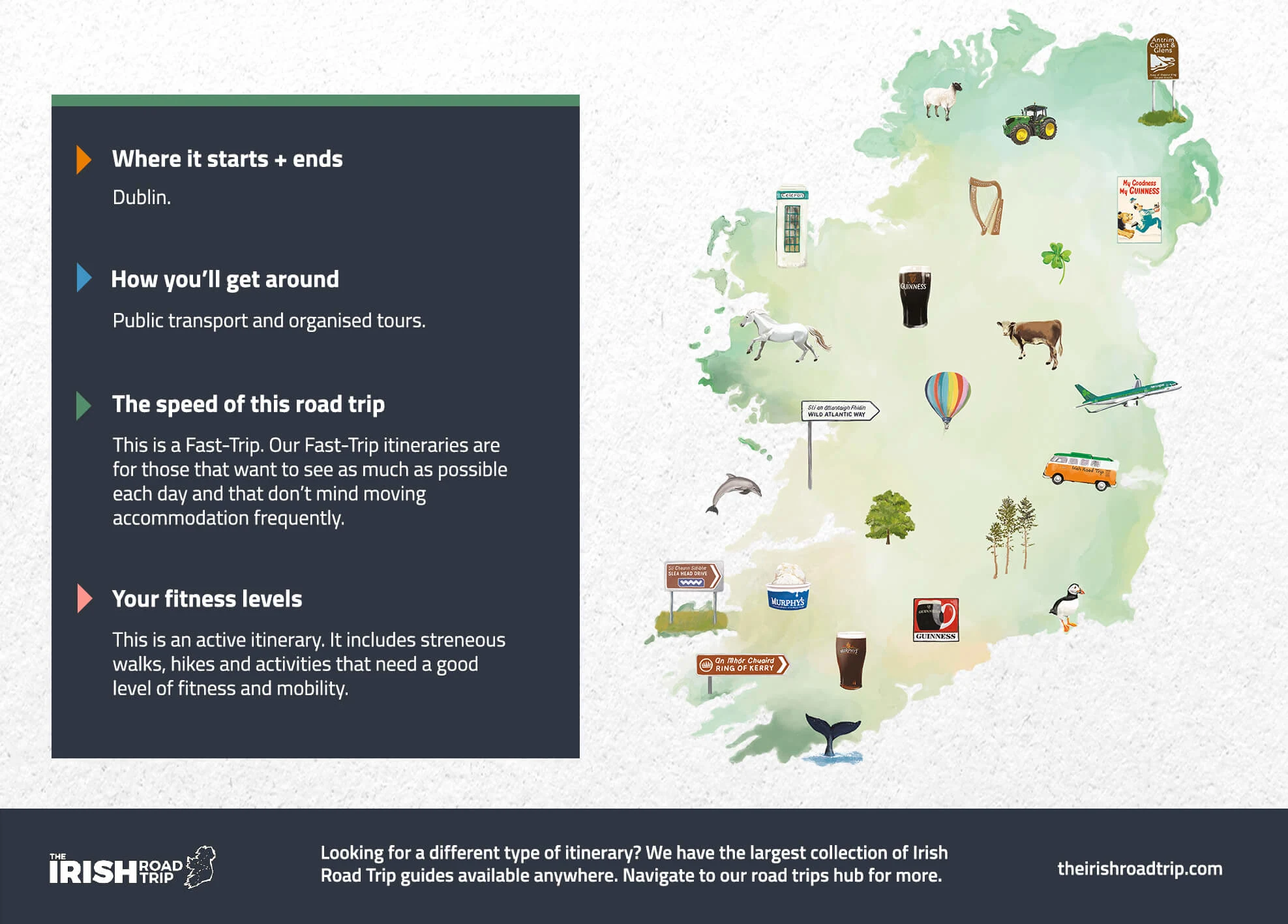
It’s important that you take a look at the graphic above as each of our road trip itineraries have been tailored to specific needs.
This road trip is specifically for those of you:
- Starting in/near Dublin
- Using public transport and organised tours
- Looking to explore at a fast pace
- With a good level of fitness (i.e. it includes long walks and hikes)
- Remember, we have hundreds of different itineraries here if this one doesn’t suit you
An overview of this 12-day itinerary
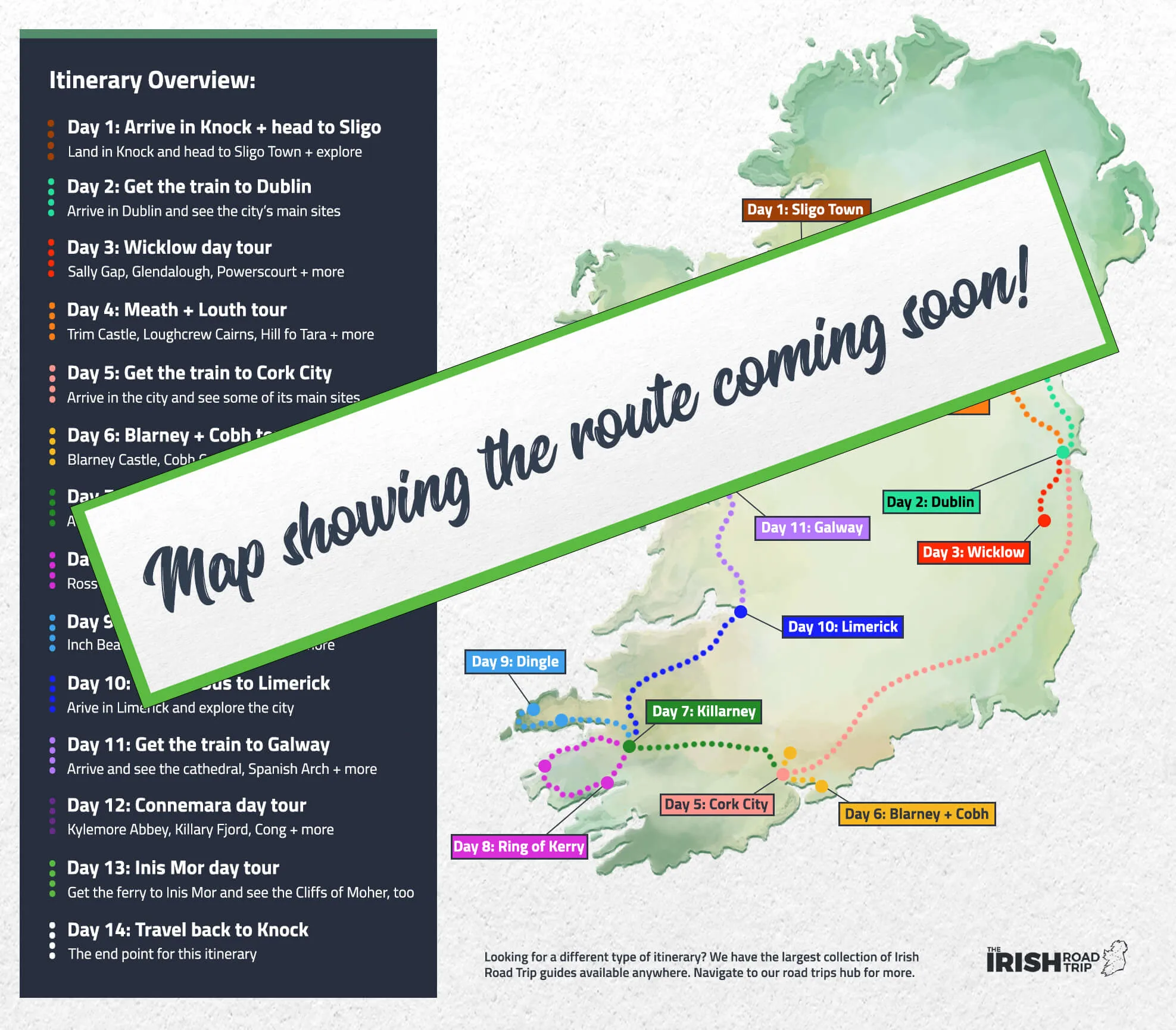
The map above gives you a very high-level overview of where this route will take you.
It uses several bases (e.g. Dublin for 4 nights) and provides you with day-long road trips you can head off on, so you avoid having to change accommodation constantly.
Now, I’ll stop rambling on – here’s a day-by-day insight into each of the days below!
Day 1: Arrive in Dublin
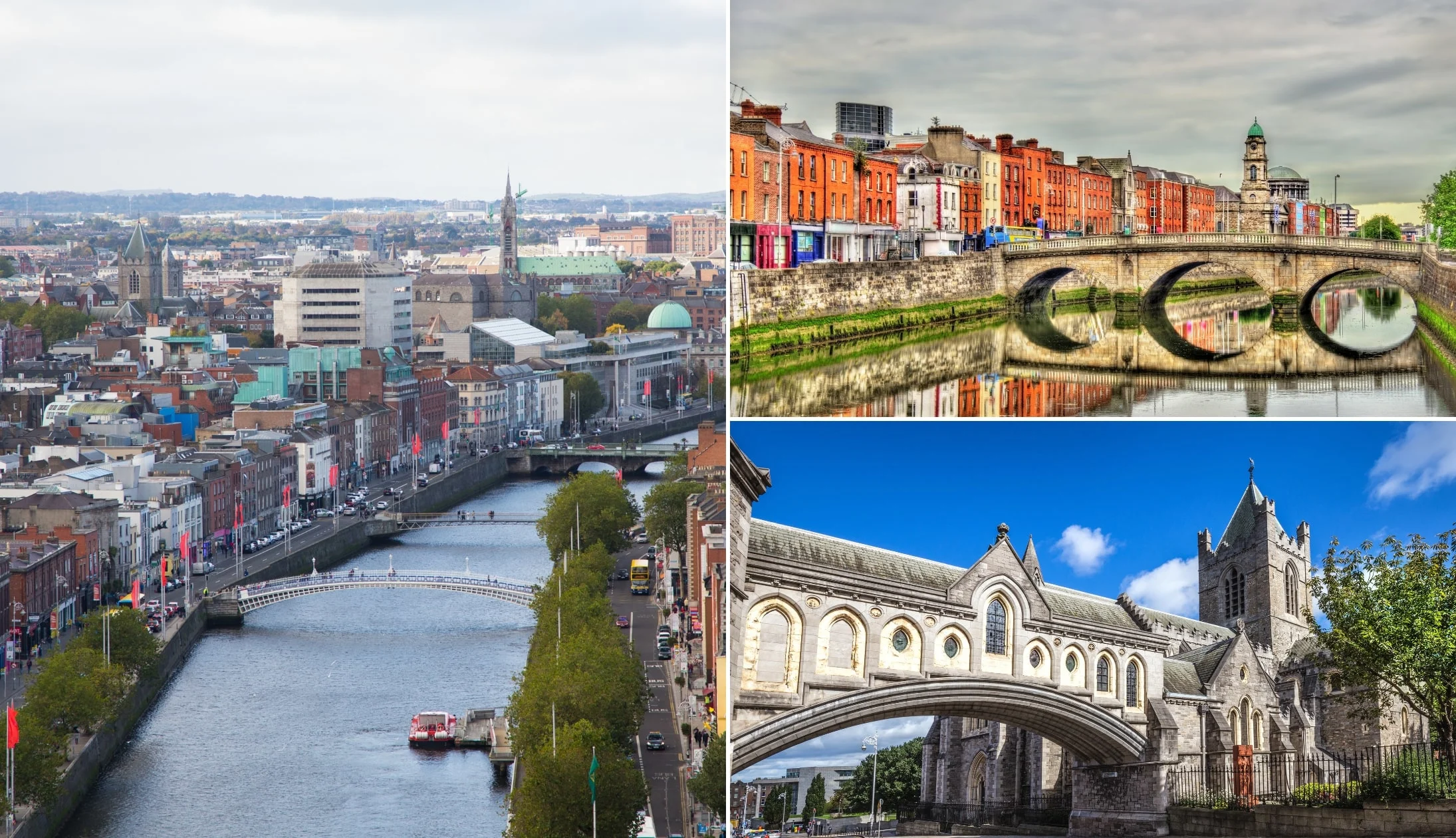
Photos via Shutterstock
Day 1 of this 12-day Ireland itinerary is going to be very dependent on the time that you arrive into Dublin.
For this itinerary, we’re going to make an assumption that you’ve landed in the morning and are ready to explore from mid-afternoon.
Recommended accommodation in Dublin
- Budget: Abigail’s Hostel (Temple Bar), Jacobs Inn (central hostel) and the Generator Hostel (short walk from the city)
- Mid-range: Dublin Skylon Hotel (just outside the city), Wren Urban Nest (Temple Bar) and the Harding Hotel (very central)
- Luxury: The Merrion (St. Stephen’s Green – very central) and The Westin (just off Grafton Street)
Getting around Dublin + money savers
- Time savers: If you want to avoid walking where possible, it’s worth getting a ticket for the Hop On Hop Off Bus around Dublin. It goes to or near all of the main sites on this itinerary plus plenty more.
- Money saver: If you’re visiting the ‘main’ Dublin attractions, the Dublin Pass can save you €€€ (here’s how)
Stop 1: Lunch
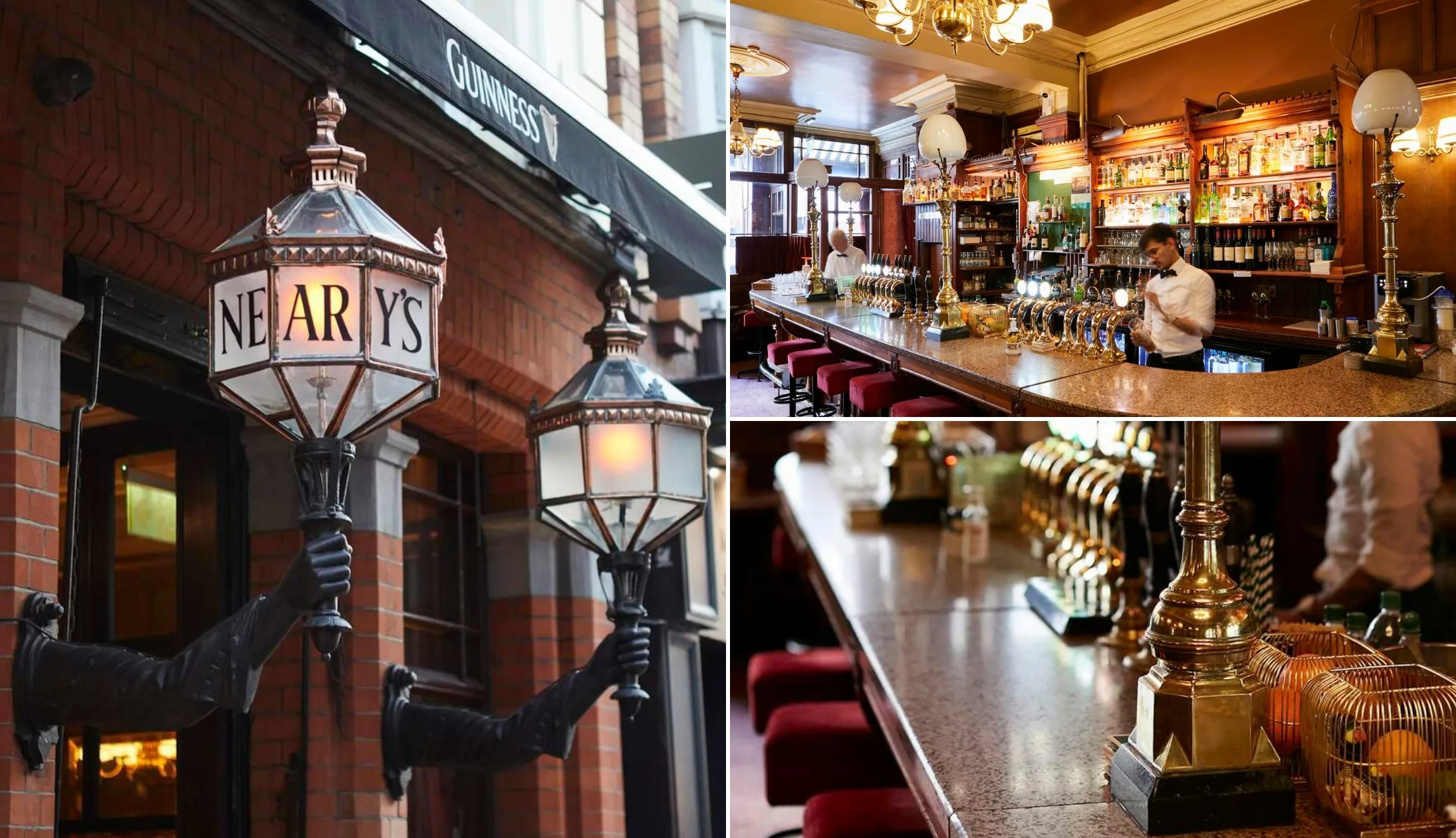
Photos © Tourism Ireland
There’s plenty of great restaurants in Dublin that serve up a delicious lunch, but if you fancy a tasty bite in a lovely old-world-style pub, Neary’s just off of Grafton Street is hard to bate!
They serve simple dishes (like soups and sandwiches) that are packed with flavour and great value for money. Alternatively, Sprout and Co. on Dawson St. is also a great choice.
They have a range of hearty salad bowls, with good options for vegetarians and vegans.
Stop 2: Trinity College
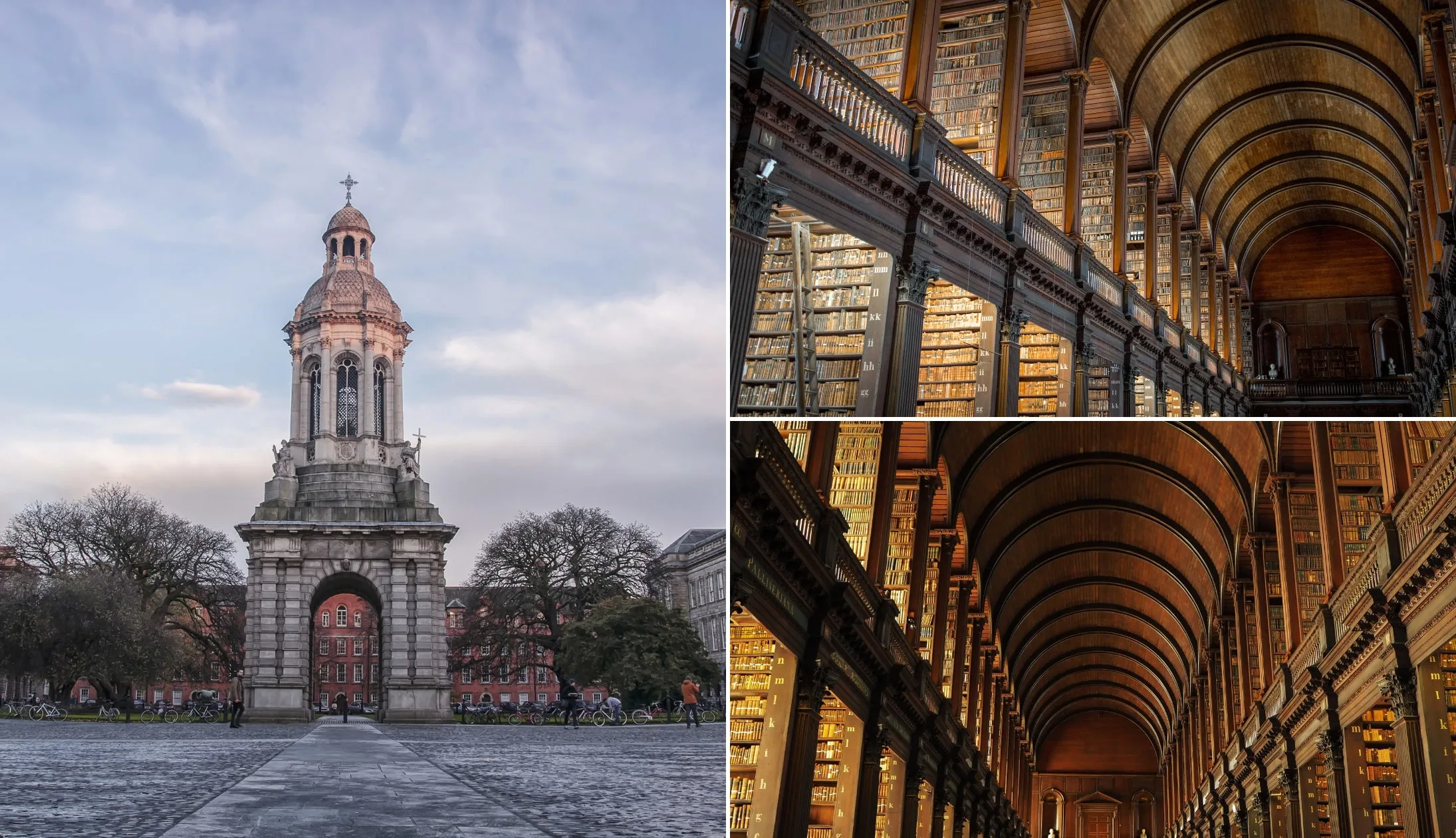
Photos via Shutterstock
Now you’re all fuelled up, it’s time to head to Trinity College to see the Book of Kells, arguably the most famous cultural attraction in Dublin.
If you can, we highly recommend pre-booking your tickets online, as the queues can get really long (bordering on ridiculous!). This fast-track ticket allows you to dodge the queue and gets you into Dublin Castle, too!
Spend around one hour seeing the Book of Kells, walking around the exhibit, and taking in the beauty of the Old Library. After that, give yourself another 20 minutes or so to walk around the university campus.
Stop 3: The Ha’penny Bridge (via Temple Bar)
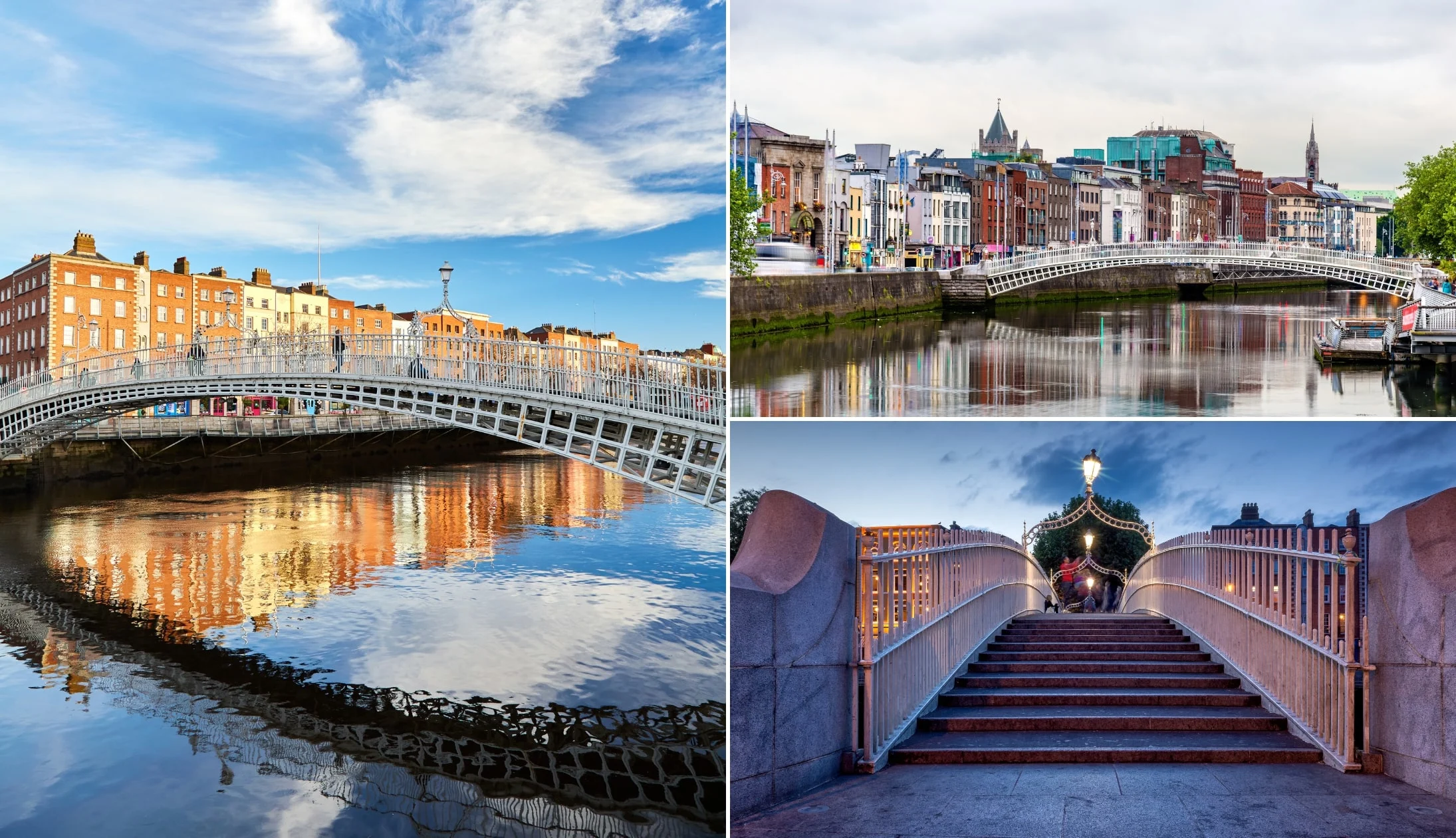
Photos via Shutterstock
The Ha’penny Bridge (officially named the Liffey Bridge) dates back to 1816 and was the first pedestrian bridge over the River Liffey!
It’s a seven-minute walk from the Trinity Gates, but feel free to take your time as you make your way through the lively streets of Temple Bar.
Now, Temple Bar can be a bit of a tourist trap. If you fancy a pint, here are several pubs in Temple Bar worth trying (the Palace is our go-to).
If you feel like an afternoon coffee, there are some great cafes in the Temple Bar area or on the other side of the river. Joe’s Coffee and Vice Coffee are two of our favourites across the water.
They’re both just a short stroll from the north side of the Ha’penny Bridge.
Stop 4: Dublin Castle
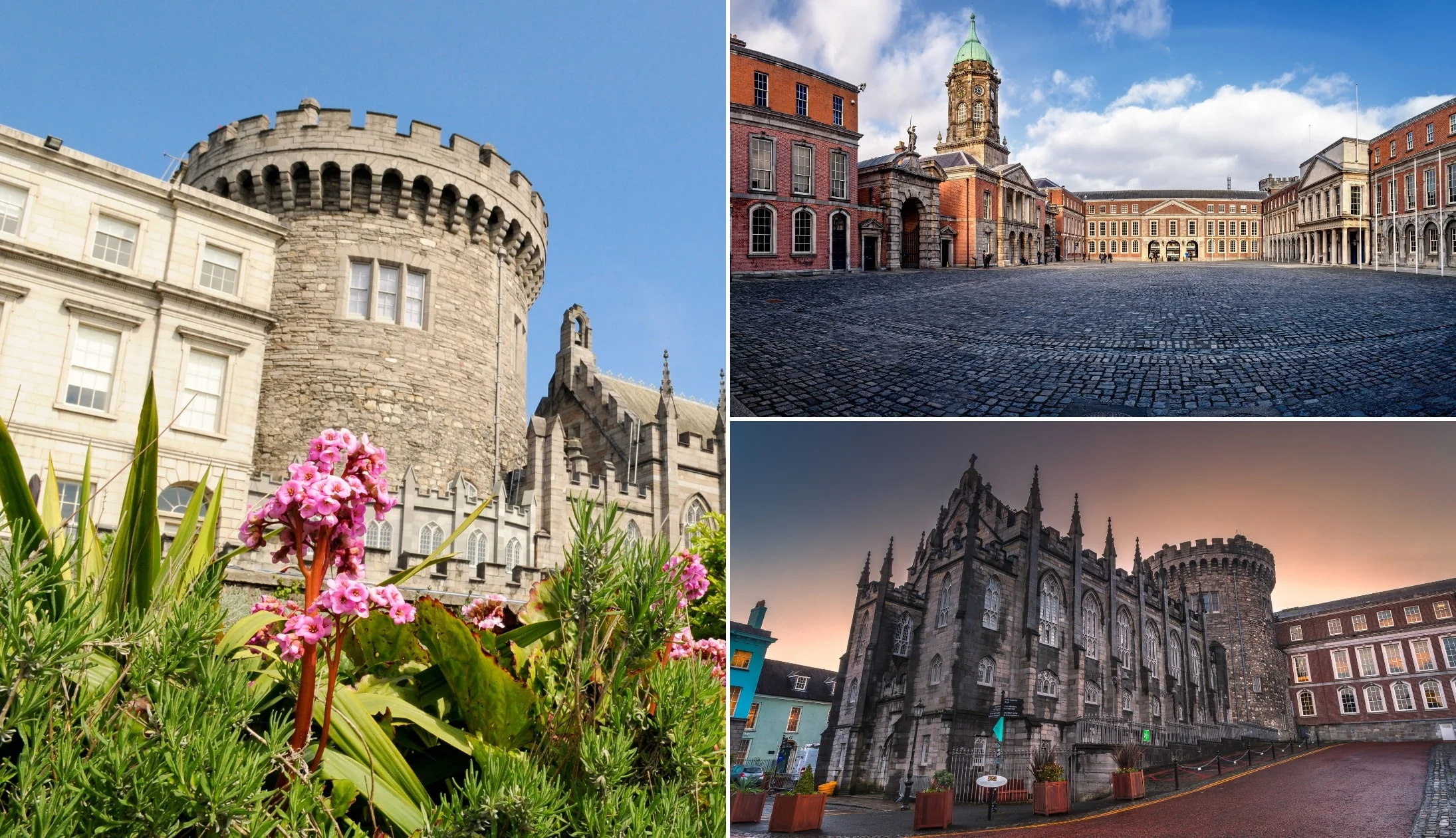
Photos via Shutterstock
Next on the itinerary is Dublin Castle. Nestled in the city centre, the castle dates back to the 13th century and was the seat of the English for over 700 years.
Today, it’s an important government complex and the site of Presidential Inaugurations and key State events. The castle is around 10 minutes from the Ha’penny Bridge on foot.
There’s no admission fee to explore the grounds, but if you want to have a look inside you’ll need to purchase tickets for either a self-guided tour or a guided tour.
Guided tours include access to the State Apartments, Exhibitions, Chapel Royal, and the Mediaeval Undercroft. Self-guided tours include access to the State Apartments and Exhibitions only.
Tickets for guided tours can be purchased on the day of your visit at the ticket booth.
Stop 5: Christ Church Cathedral
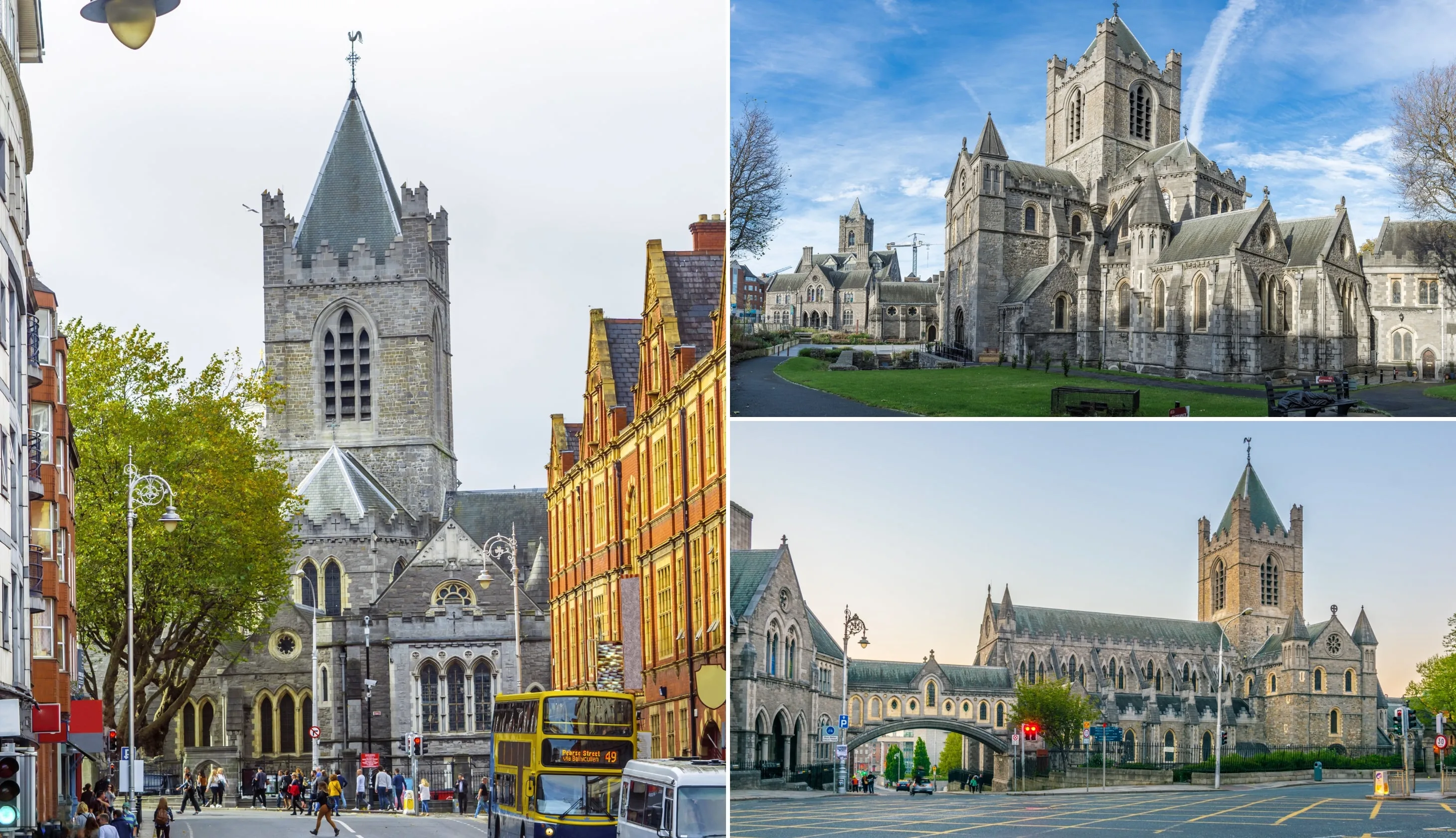
Photos via Shutterstock
Christ Church Cathedral dates back to the early 11th century when it was founded under Sigtrygg Silkbeard, a Norse King of Dublin. It was rebuilt later in stone, largely thanks to the first Anglo-Norman archbishop, John Cumin, in the late 12th century.
The cathedral is only a 4-minute walk from Dublin Castle and a really interesting place to visit. Some highlights are the restored crypt houses, Strongbow’s tomb, and the Treasures of Christ Church exhibition.
You can grab a ticket online here – these include an audio guide that comes in several languages, with three themes to choose from – ‘Power and Politics’, ‘Music and Spirituality’, and ‘Christ Church and the City’.
Self-guided tours with an audio guide usually last around one hour.
Stop 6: St. Patrick’s Cathedral
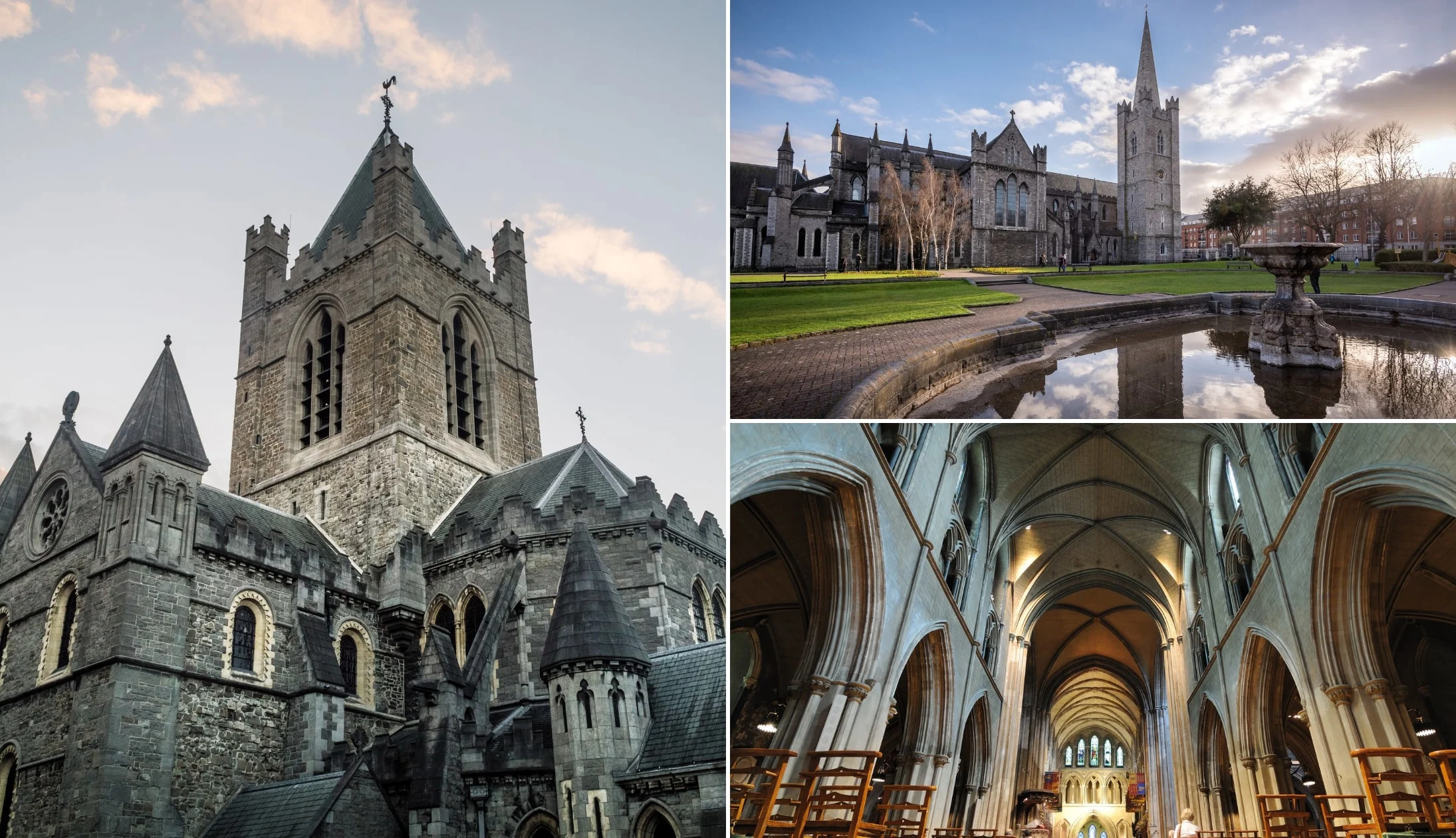
Photos via Shutterstock
St. Patrick’s Cathedral is just a short 7-minute walk from Christ Church Cathedral. The magnificent cathedral is one of the city’s top attractions as well as one of the few remnants of Medieval Dublin!
It dates back to the 12th century and is Ireland’s largest cathedral. As you may expect, St. Patrick’s Cathedral has a long and rich history. The cathedral has fallen into disrepair and has been damaged several times, most notably in the early 19th century.
During this period, it was restored by none other than Benjamin Lee Guinness (the first Lord Mayor of Dublin and owner of Guinness).
Stop 7: Teeling’s Distillery
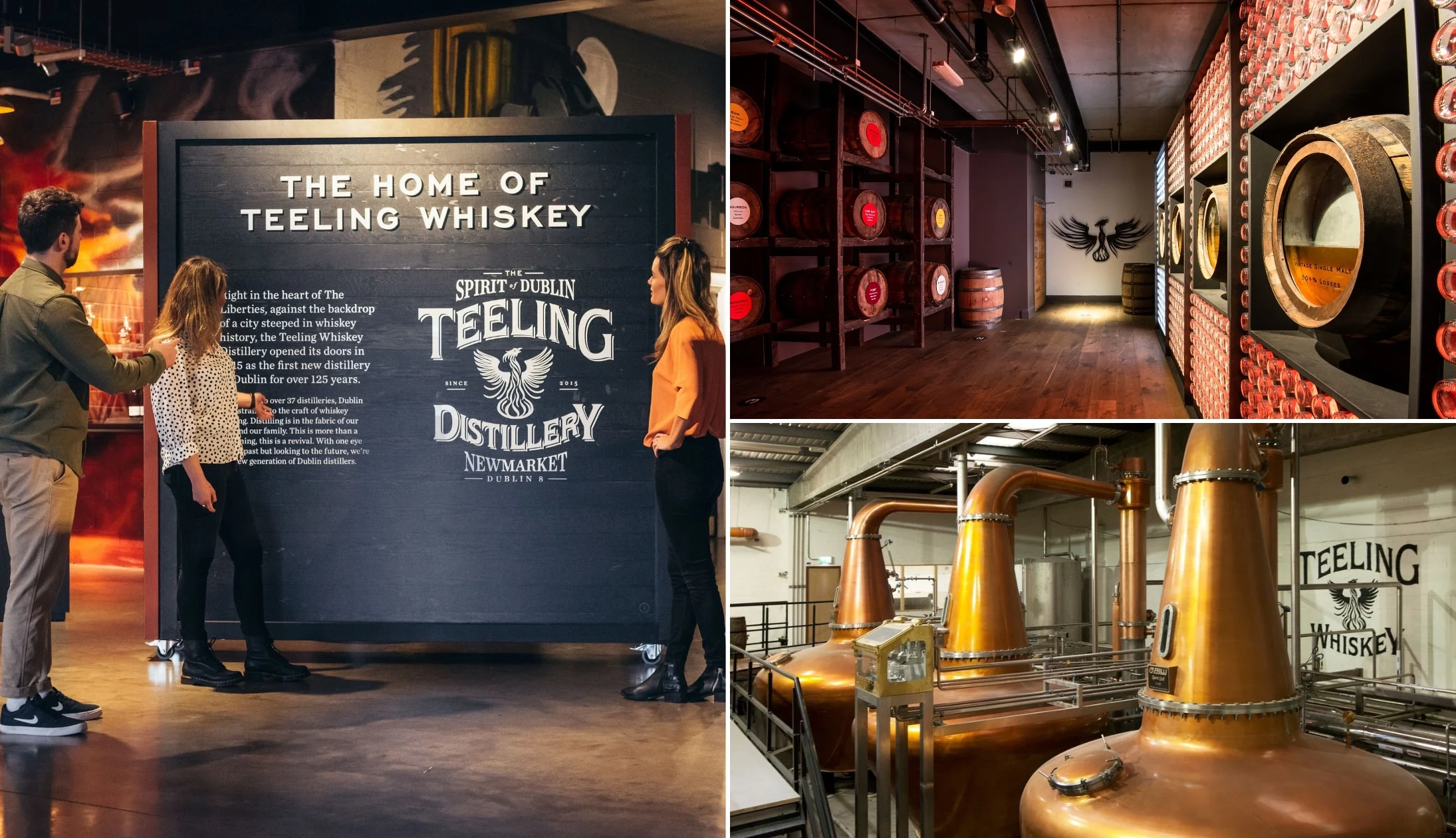
Photos courtesy Teeling Whiskey Distillery via Failte Ireland
Once you’ve had your fill of St. Patrick’s, head on over to the Teeling Distillery, an 8-minute walk away. Founded by the Teeling family in 2015, the Teeling’s Distillery was the first new distillery to open in Dublin in over 125 years!
However, the family’s expertise span back generations, as they established a small craft distillery on Marrowbone Lane in 1782. Today, the new distillery stands just a few streets away from the family’s ancestral distillery.
They have several tours available, each of which has great reviews online. You can grab a ticket online before you go that includes a fully-guided tour of the distillery, followed by a tasting.
Stop 8: Dinner, drinks and live music
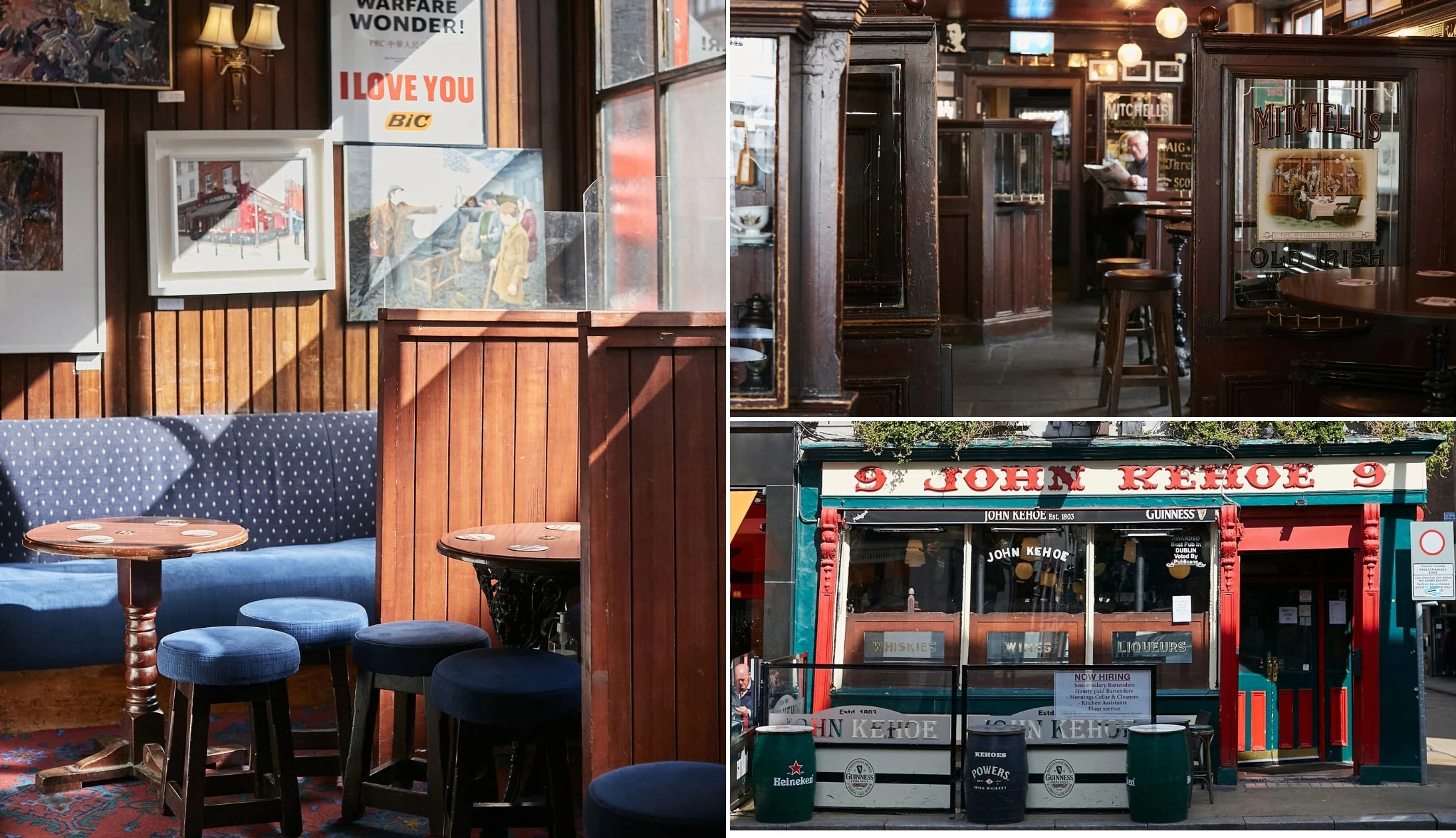
Different trad bars in Dublin. © Tourism Ireland
By now, you must be getting hungry.
Dublin has heaps of options for dinner, but we’ve got a couple of suggestions for you!
Our dinner recommendations
If you’re looking for something close by, Spitalfields is a stone’s throw from the Teeling’s Distillery. It’s a little bit pricey, but the atmosphere is great and the food is top-notch!
However, Spitalfields is 16+ only, so it’s not suitable for young families. Otherwise, check out The Bull and Castle across the street from Christ Church Cathedral.
Their menu has F.X. Buckley Steaks (renowned in Dublin), plus a great selection of local craft beers. The restaurant can get booked out pretty quickly, but you can always eat in the bar upstairs, which also has steak on the menu.
Live music and trad bars
If you want a taste of what Dublin’s best pubs are, see our detailed Dublin pubs guide. If you’re solely looking for places that do exceptional Guinness, see our guide to Dublin’s best pints.
If you fancy a bit of live music, there’s plenty on offer. Pipers Corner on Marlborough St. has some great tunes, with live music from 9pm every Tuesday to Saturday, and from 8pm on Sunday.
The inside has more of a modern feel, but you’ll be guaranteed authentic Irish music.
For the full experience, O’Donoghues Bar on Merrion Row has live music every night of the week. It’s about as traditional as Irish pubs get, with a brilliant atmosphere.
The Celt is another fantastic pub with live music every night from 9pm, although it’s not always traditional.
Day 2: More Dublin City sites
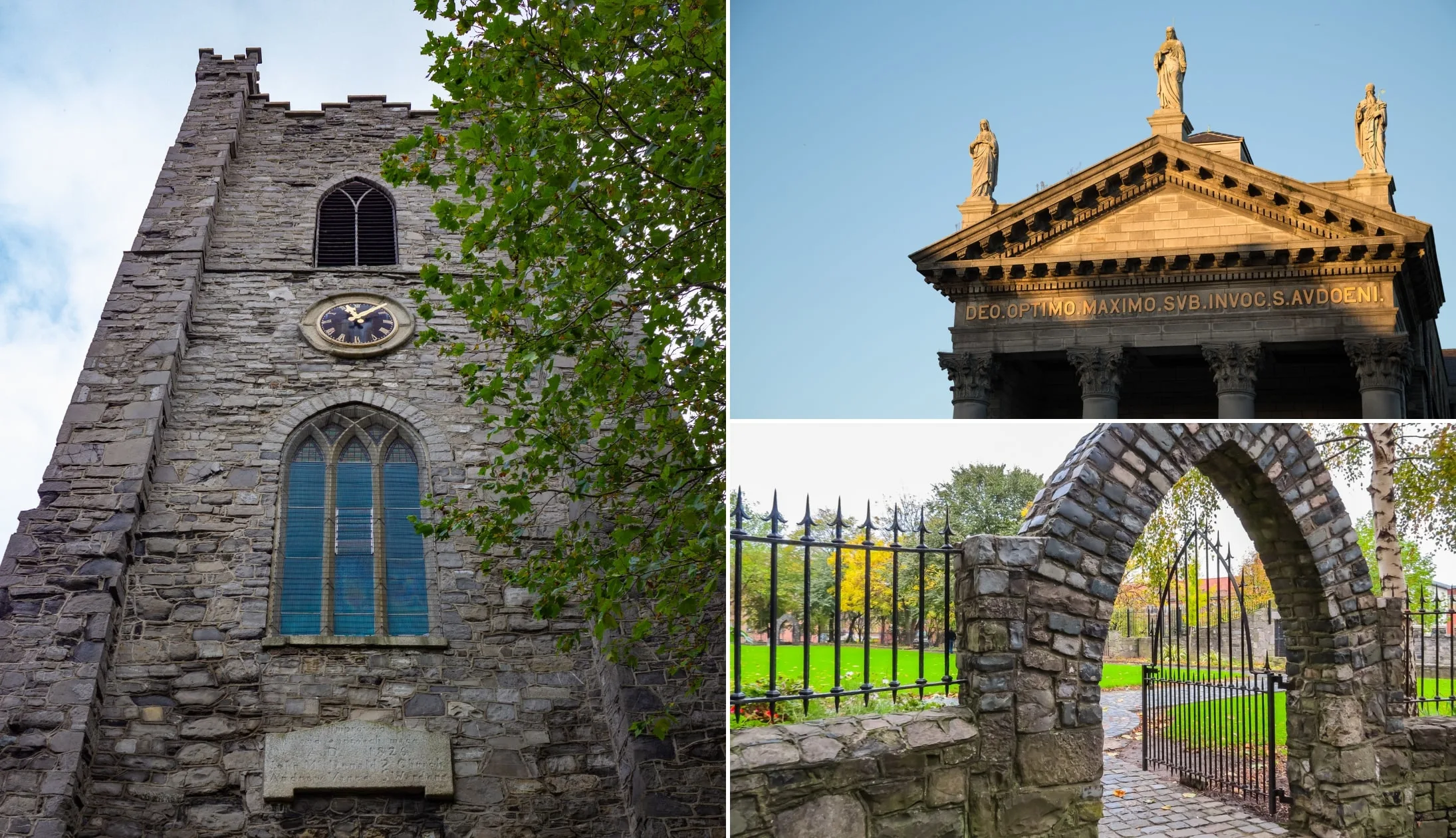
Photos via Shutterstock
It’s day 2 of our 12 days in Ireland itinerary, and there’s a full day of Dublin sightseeing ahead of you.
Now, although we’ve focused on the city for day two of this itinerary, you could easily change this day and explore the coast of Dublin.
For example, you could get the train out to Howth Village, tackle the Howth Cliff Walk, grab lunch in the village and then take the train over to Malahide Castle.
Or, you can take it easy and stick to the city, like we do in the itinerary below.
Stop 1: Breakfast

Photos via Shutterstock
It’s time for day 2, so grab some breakfast at your accommodation or grab a quick bite from a nearby cafe. We recommend stopping by Cool Hand Coffee Roasters on Emmet Road.
They’re a short 3-minute stroll from our next stop (Kilmainham Gaol), serving speciality coffees and a selection of pastries.
Stop 2: Kilmainham Gaol
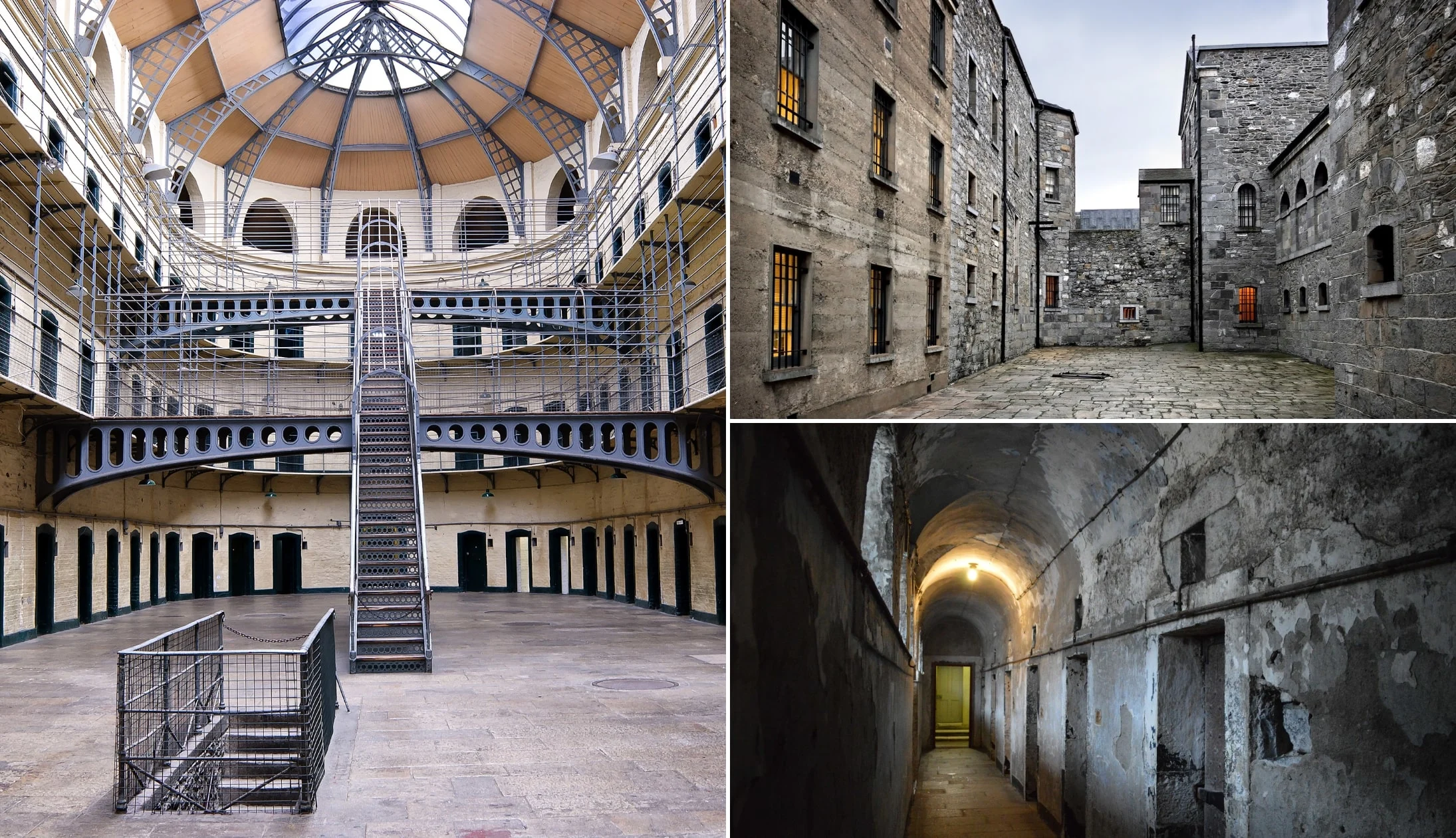
Photos via Shutterstock
Kilmainham Gaol is an extremely popular Dublin attraction, so you’ll need to buy tickets in advance as they tend to sell out quickly.
We recommend allowing an extra 30 minutes before/after your tour so you can visit the museum.
The gaol has a history spanning over 100 years, and during its time, it housed prisoners from the 1798 rebellion, the Anglo-Irish War, and the Irish Civil War.
Visitors will have an interesting insight into what imprisonment was like in the gaol and the role it played in Irish history.
We’d recommend making your own way here via the Luas Red line from the city centre. You can get off at Heuston Station and take the 15-to-20-minute walk to Kilmainham Gaol.
Stop 3: Irish Museum of Modern Art
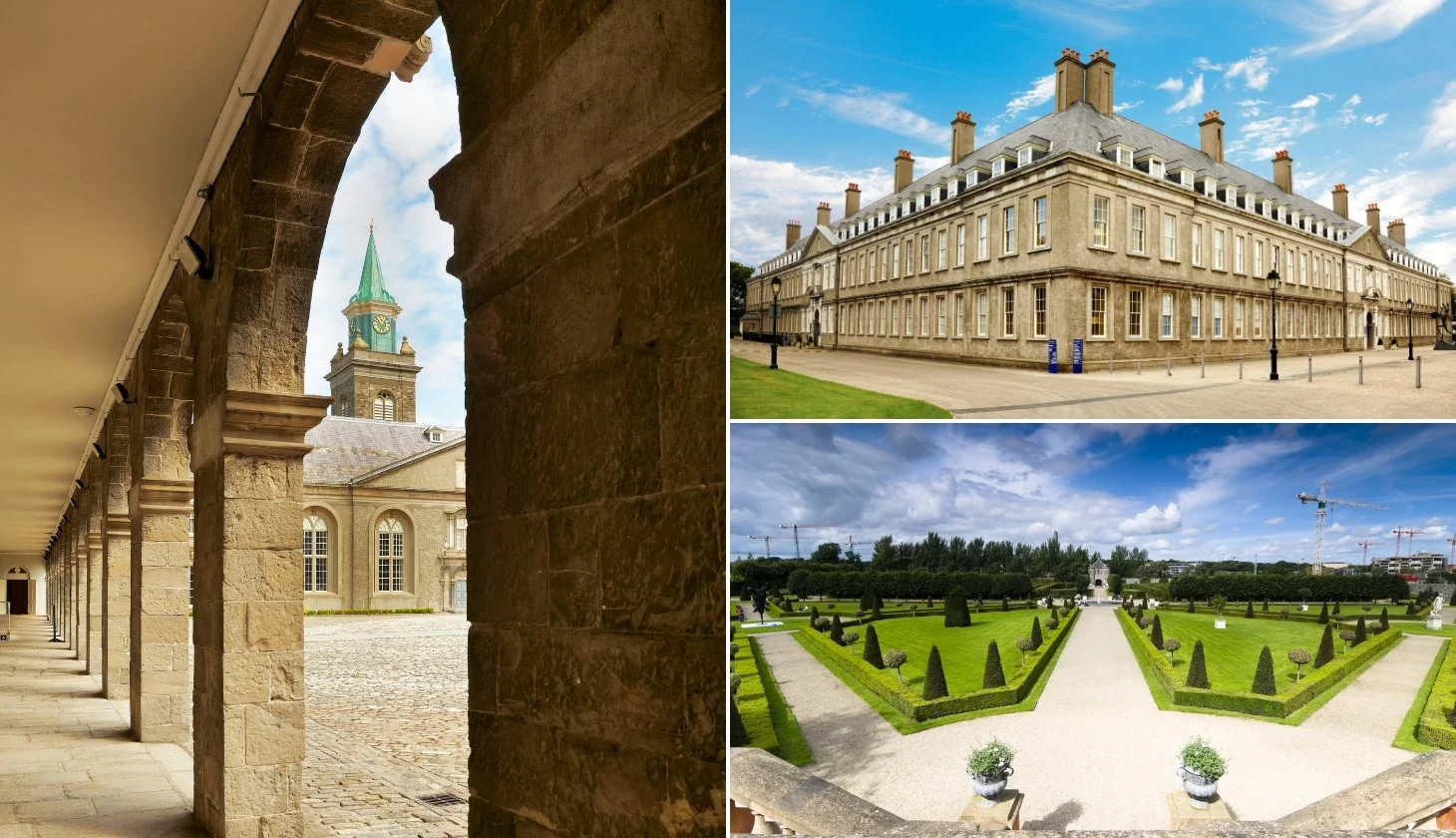
Photos via Shutterstock
Make your way to the Irish Museum of Modern Art (IMMA), a 10-minute walk away from Kilmainham Gaol. The museum is housed in the beautiful 17th-century Royal Hospital Kilmainham, tucked away on 48 acres of grounds.
The IMMA has a wide variety of exhibitions showcasing 3,500 modern and contemporary art pieces by local and international artists.
It’s free to visit (although some exhibitions may charge a small fee), and throughout the week there are free 30-minute tours – please check their website for up-to-date tour times.
If you’ve got the time (and the weather is in your favour), take a quick turn around the grounds to check out more artworks and the Formal Gardens.
Stop 4: St. Michan’s
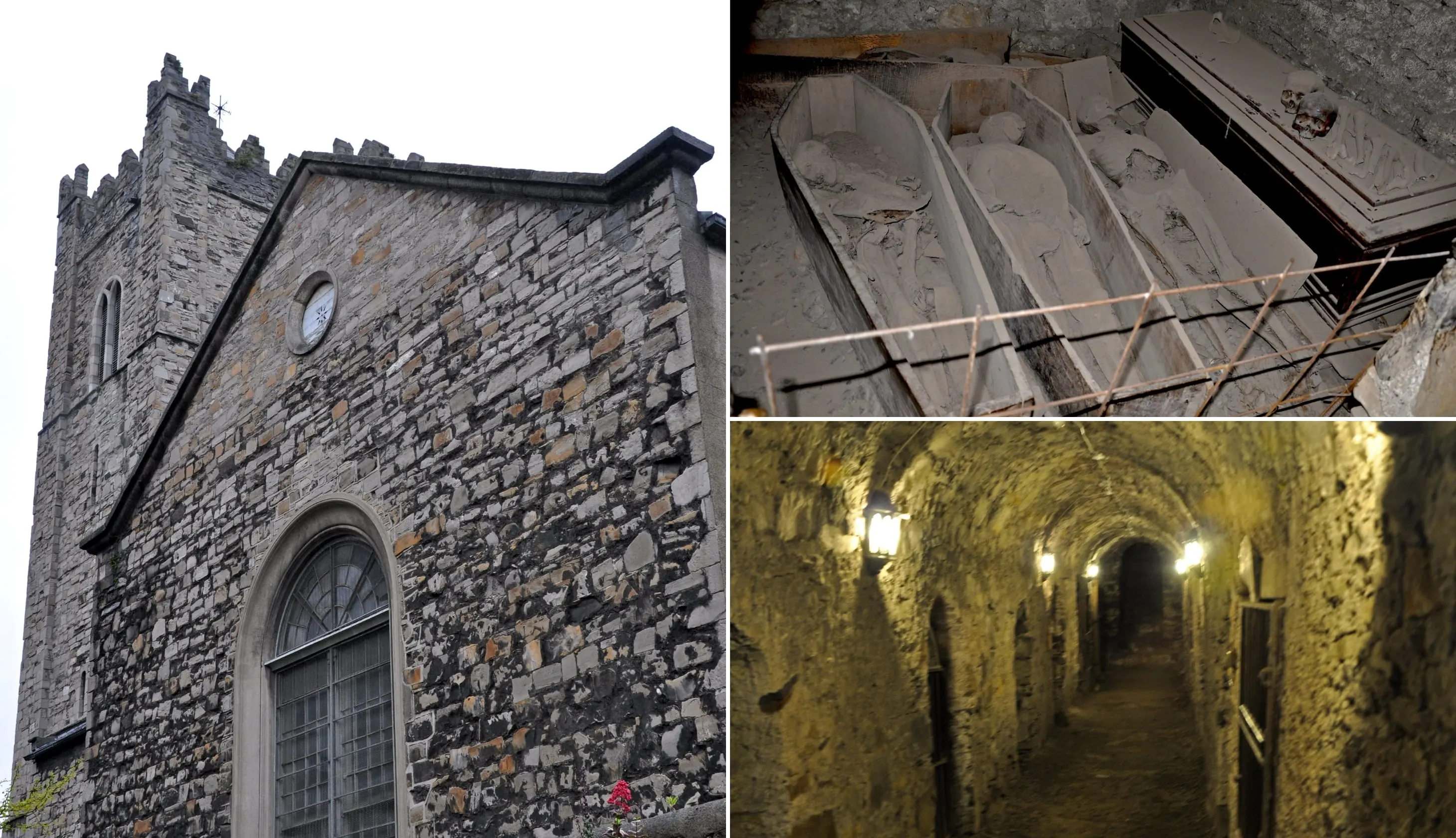
Photos with thanks to Jennifer Boyer
St. Michan’s is a 25-minute walk away from IMMA, but if you’re feeling tired, you can head to Heuston Station and jump on the Luas towards Saggart.
Get off at Smithfield, which is a stone’s throw from St. Michan’s and close to the Brazen Head, our recommendation for lunch! All in all, this takes 15 minutes.
St. Michan’s is an incredibly interesting church that dates back to 1686, although there used to be a Christian chapel on the same spot, which was established as early as 1095.
Despite its modest size, St. Michan’s is packed full of history. In our opinion, the best way to learn about it is on their guided tour, which gives you loads of interesting info.
During the tour, you’ll get the chance to go into the 12th-century crypts and see real-life mummies that have been preserved for over 500 years; head into the vaults which were frequented by famous author Bram Stoker; and the magnificent organ, which is one of the oldest still in use in Ireland.
Stop 5: Lunch
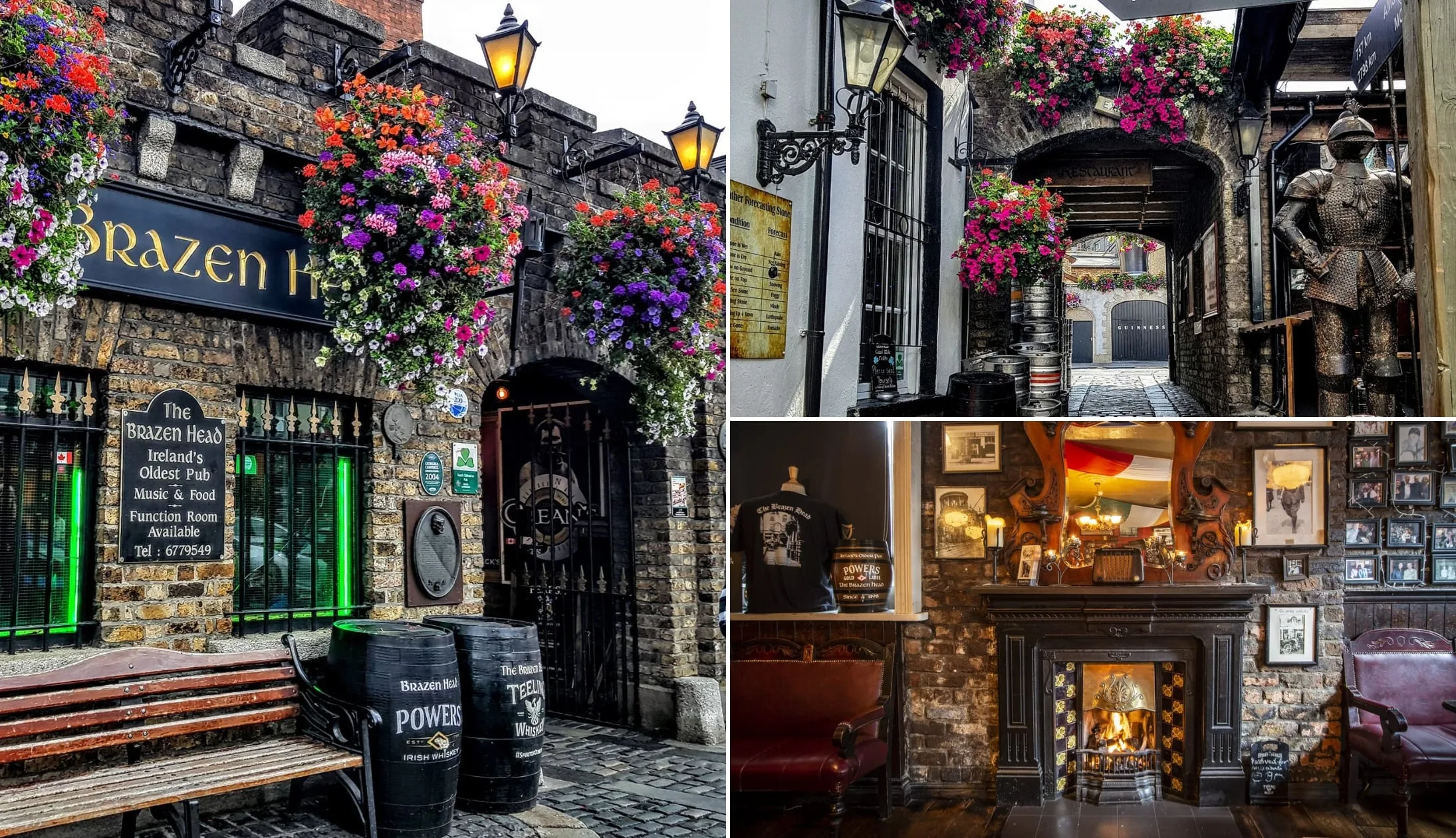
Photos via Shutterstock
There’s some very old pubs in Dublin, but one reigns supreme! When you finish up at St. Michan’s short 7-minute walk to the Brazen Head.
The pub is the oldest in Dublin and one of the oldest in Ireland, dating back to 1198. They serve traditional Irish pub grub and their Guinness beef stew is divine.
You’ve had a busy morning so kick back here, make your belly happy and set yourself up for the next stop of the day.
Stop 6: Guinness Storehouse
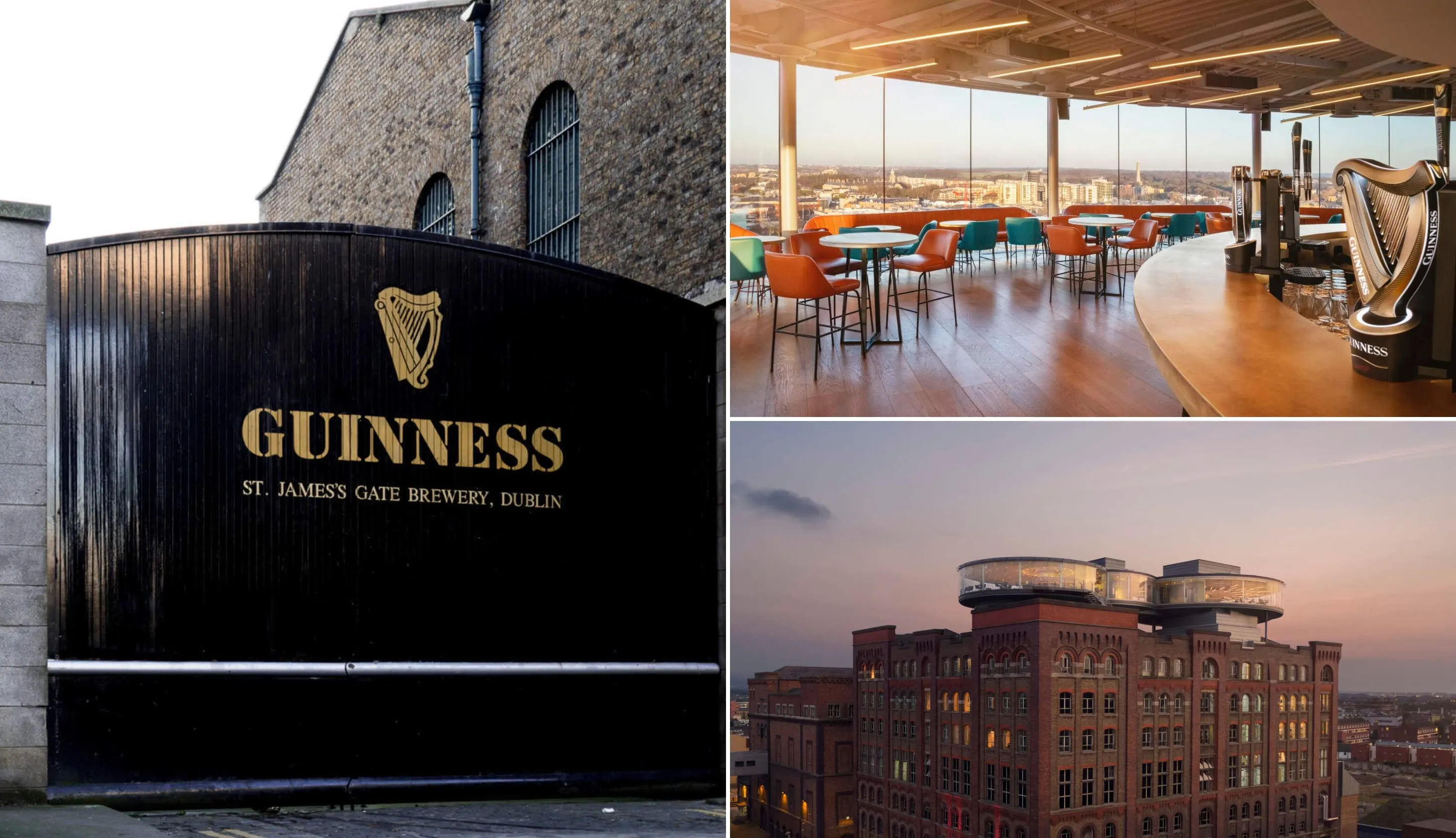
Photos © Diageo via Ireland’s Content Pool
Walk off your hearty pub lunch by taking the short 14-minute stroll to the Guinness Storehouse. It’s at St. James’s Gate, the home of Guinness, and there are several tours available.
We recommend the Guinness Storehouse Experience, a self-guided tour that takes roughly 90 minutes.
You’ll learn about Guinness’ history, its ingredients, and get to enjoy a pint of Guinness and one other Guinness beer (for ages 18+) whilst taking in the views of the Gravity Bar.
Stop 7: St. Audoen’s Church

Photos via Shutterstock
St. Audoen’s Church is a 14-minute walk from the Guinness Storehouse. While it’s well worth a visit, you won’t need too much time here.
The church dates back to 1190, making it the oldest Parish church in the city. However, parts of the church were added/restored at a later date, including the tower, which was damaged in 1596 following a huge gunpowder explosion nearby.
When you stop by, make sure to head to the main porch to have a look at the “Lucky Stone”, a late 9th-century gravestone that traders and merchants used to rub for good luck!
Stop 8: Dinner, drinks and live music

Different trad bars in Dublin. © Tourism Ireland
For your second night in Dublin, we’ve got a few recommendations! For dinner, we love Crow Street Restaurant or Rustic Stone.
But, if you don’t mind going a little further, Richmond in Portobello is a Michelin Bib Gourmand serving modern European Cuisine.
If you can arrive between 5:30 to 6:30pm, they do an early bird special with two courses for €32 and three courses for €38 (prices may change).
Enjoy post-dinner drinks at McNeil’s on Capel Street, Long Hall on South Great George’s Street, or The Palace Bar in Temple Bar. And for trad music, check out our recommendations from day 1.
Day 3: Wicklow’s Wonders
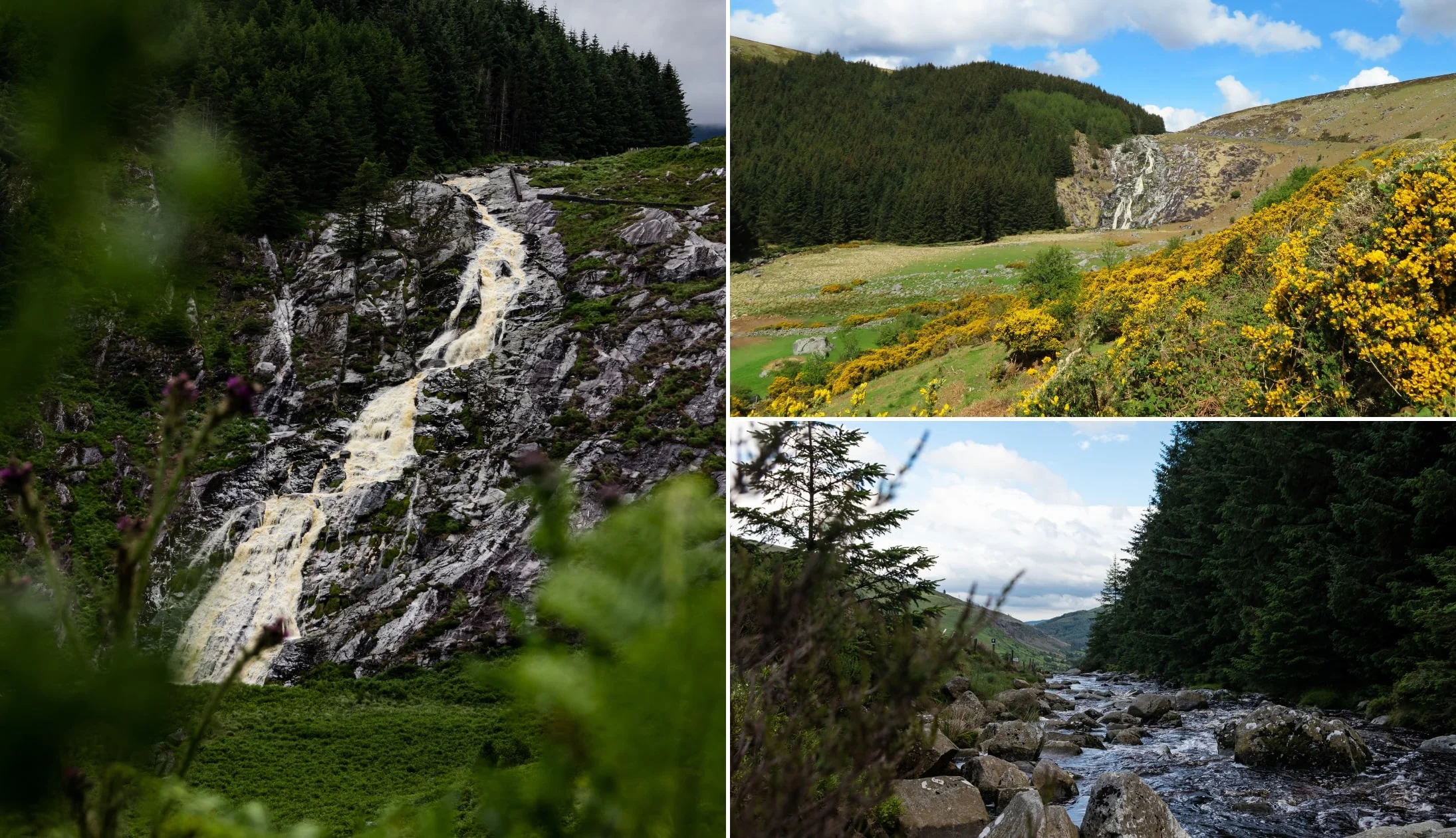
Photos via Shutterstock
On day 3 of your 12 days in Ireland itinerary, and today, you’ll be exploring Wicklow, also known as the Garden of Ireland.
You’ve got a big day ahead of you, so make sure to grab a hearty breakfast before you head off on your bus tour.
The tour leaves near the Molly Malone Statue on Suffolk Street, so if you’d rather eat out, we recommend heading to Keoghs Cafe (just around the corner from the statue) for breakfast and a coffee.
Getting to Wicklow option 1: A guided day trip
This 8-hour day trip includes a fully-guided day tour of Wicklow’s best sights and includes a visit to Powerscourt Gardens (you’ll need to pay into the gardens separately)!
You’ll be driven along the Sally Gap, see iconic film locations used in P.S. I Love You, Brave Heart, and Vikings, and explore an ancient 6th-century settlement.
There are two options for this tour, so make sure to choose the option with the Powerscourt Garden visit, as this is the more easy-going choice.
We’ll take you through the stops below, but note that 1, you may not always physically stop at all of these sights and 2, these tours are subject to change, so always check with the provider in advance.
Getting to Wicklow option 2: St. Kevin’s Bus
We definitely think a guided tour is the best way to explore Wicklow without a car, but if you can’t book onto the tour above, we suggest using St. Kevin’s Bus to get to Glendalough.
Take a look here for an in-depth guide. This should really be your Plan B as the guided tour includes the Sally Gap Drive, which is fantastic!
Stop 1: The Sally Gap Drive
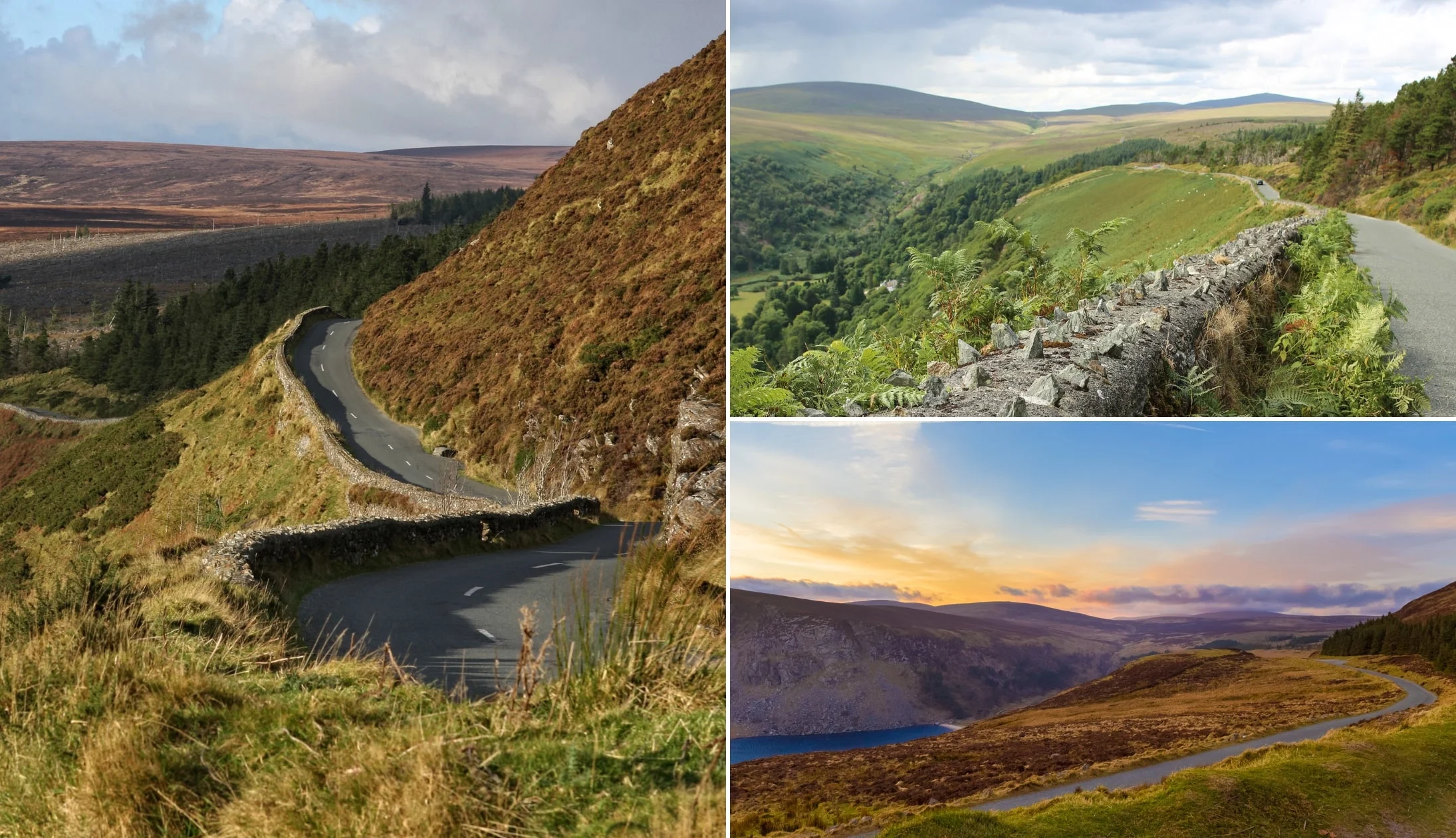
Photos via Shutterstock
OK, this isn’t really a stop. The Sally Gap is a famous crossroad on the Old Military Road through the Wicklow Mountains. The road was built in the early 1800s following the Irish Rebellion of 1798.
It’s a beautiful drive, with spectacular views of the mountains and blanket bog. One of the most notable attractions in this area is Lough Tay (AKA Guinness Lake).
Another is Glenmacnass Waterfall. However, the mountain views and the narrow roads that you drive along are what’ll really make this a corner of Ireland that you won’t forget.
Stop 2: Glendalough Monastic City
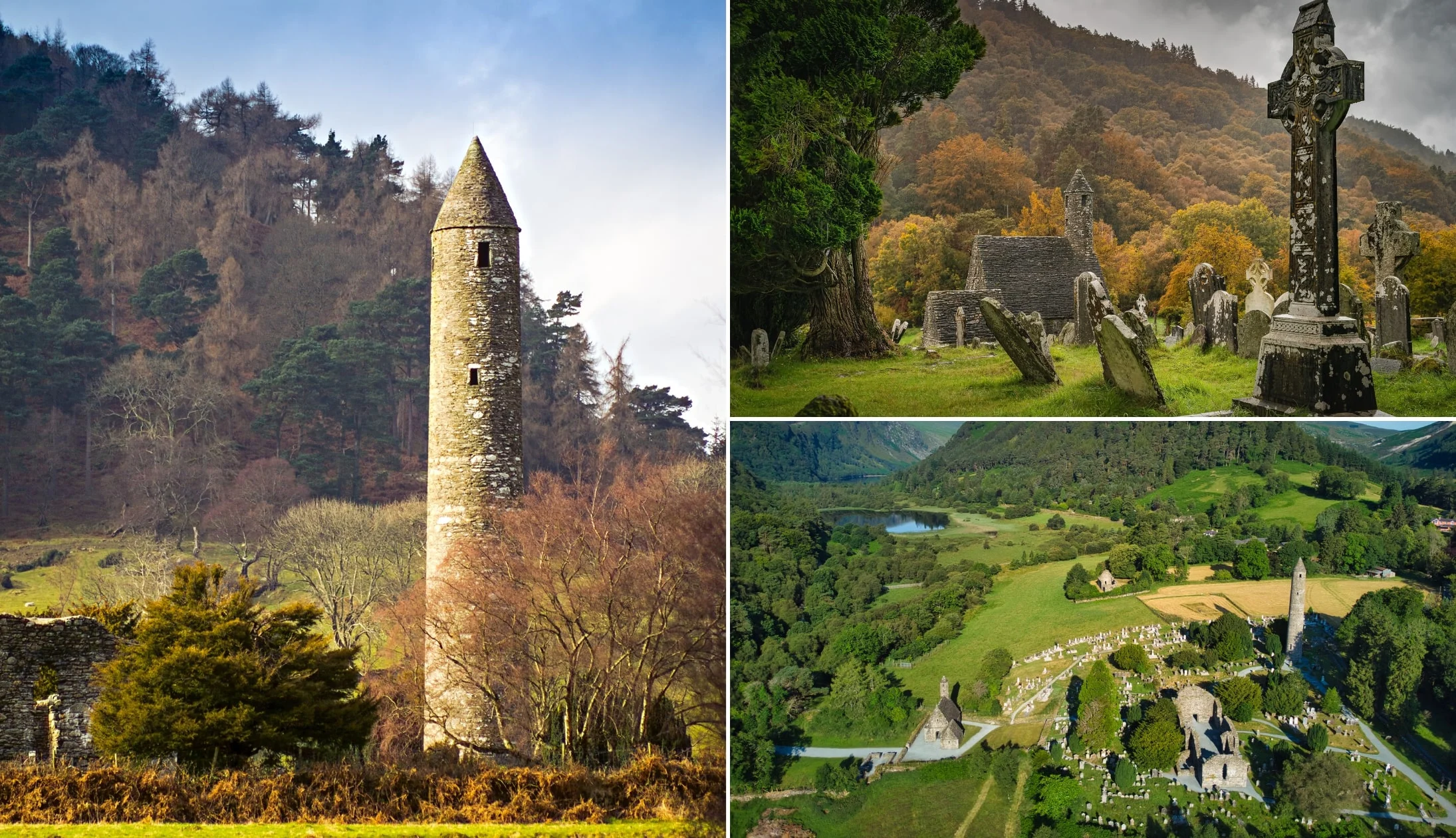
Photos via Shutterstock
The Monastic City was one of the most important monastic sites in this part of the country. The city was founded by St. Kevin in the 6th century and went on to become one of Europe’s most famous religious sites!
Right next to the settlement, there’s a visitor centre where you can enjoy the exhibits and learn more about the site and what made it so important.
After you’re all clued up, walk the 2 minutes to the monastic site and admire the Glendalough Round Tower, Cathedral, and St. Kevin’s Church.
Stop 3: The Lakes at Glendalough
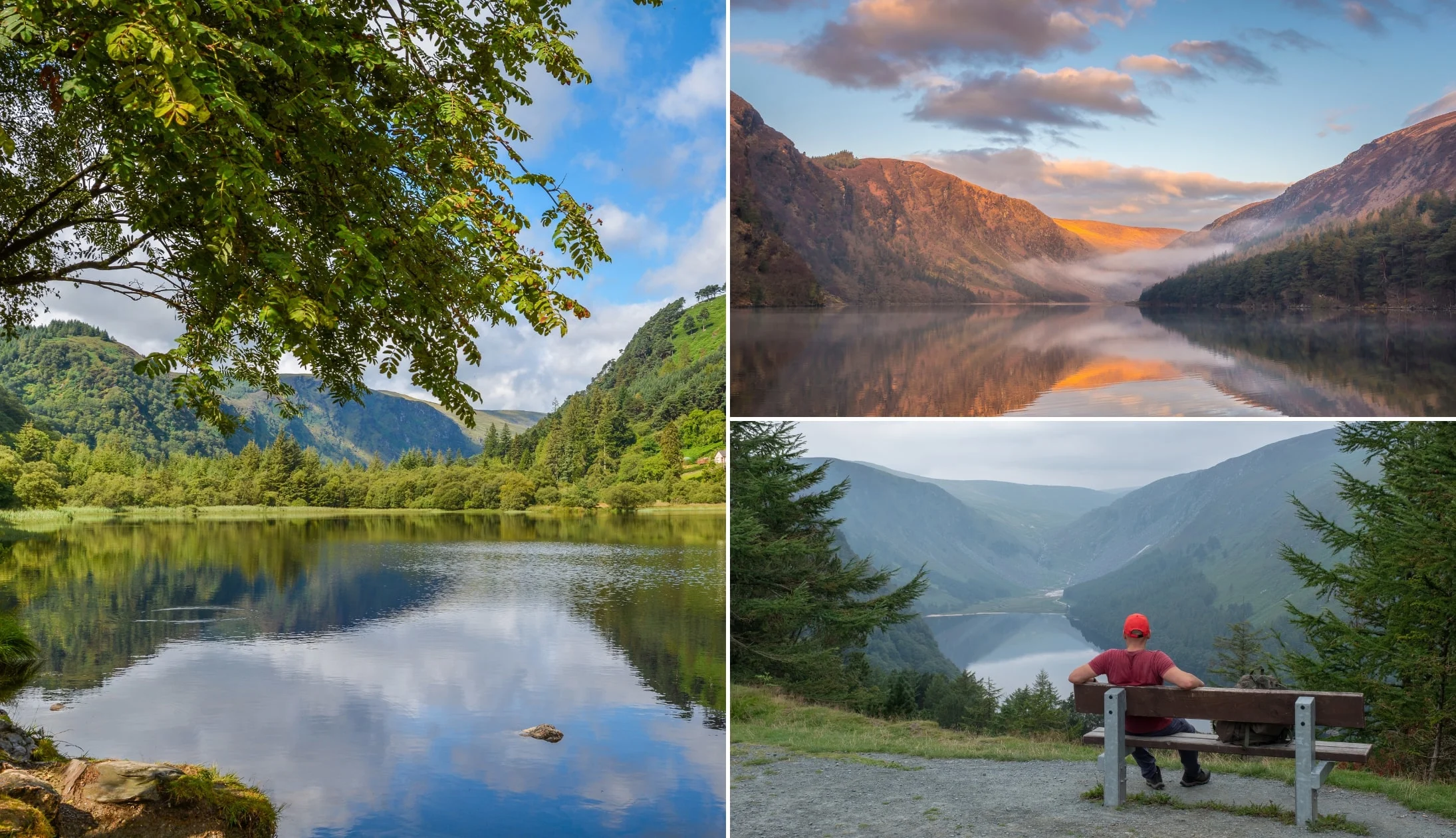
Photos via Shutterstock
Along the way, you’ll be passing by Glendalough Upper Lake and Lower Lake. Carved out by a melting glacier long ago, the upper lake is spectacular, nestled between trees and mountains.
It’s home to St. Kevin’s Bed, a small cave where St. Kevin lived as a hermit for several years before he founded the monastic city.
The lower lake is the smaller of the two, but equal in beauty, with gorgeous views of the mountains and forest.
Stop 4: Powerscourt Gardens
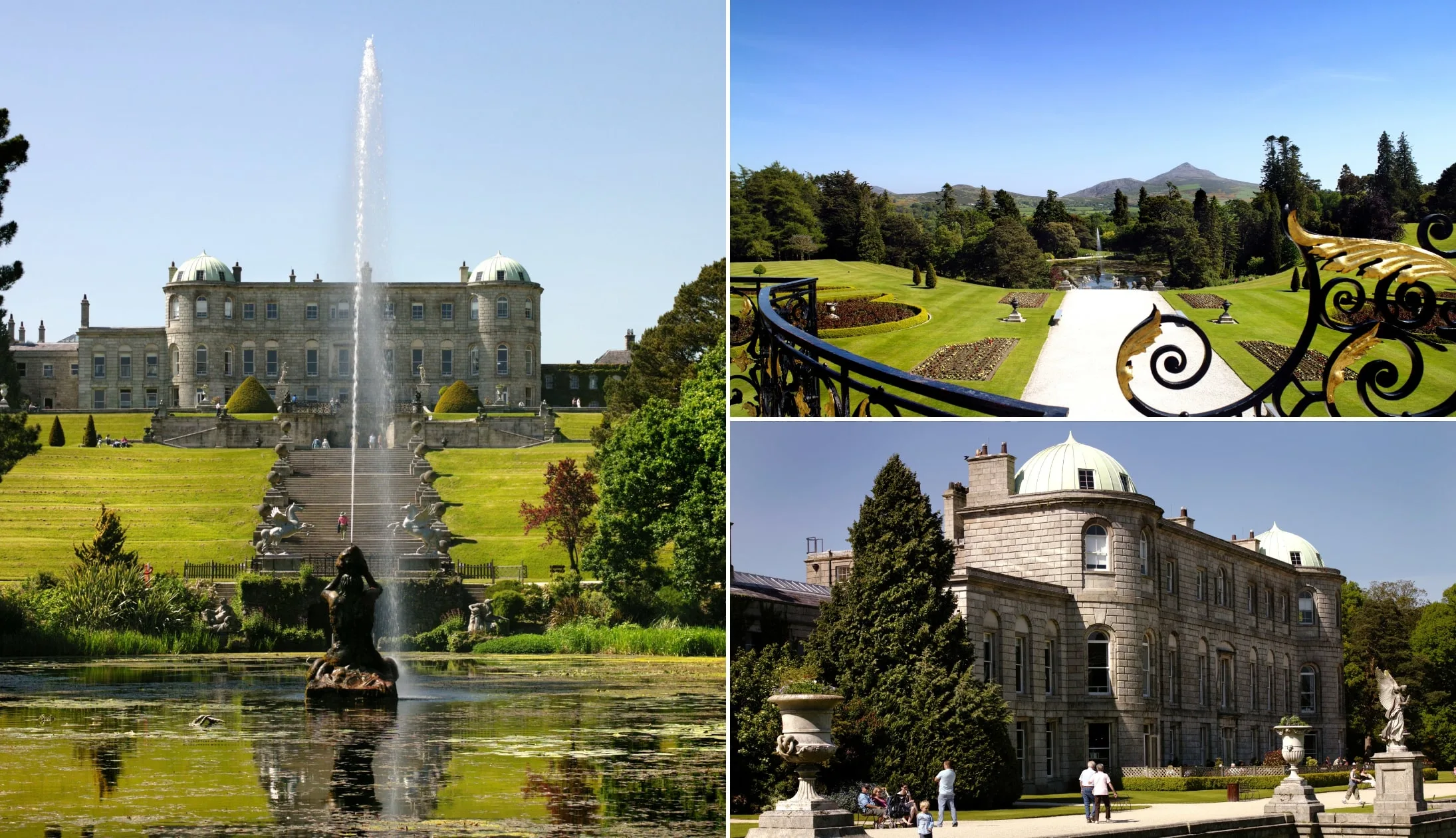
Photos by Chris Hill via Failte Ireland
The Powerscourt Gardens are filled with grandeur and were voted by National Geographic as one of the world’s Top Ten Gardens!
The 47-acre Powerscourt Gardens are managed by a team of five gardeners, who tend to the Walled Garden, the Japanese Garden, the Italian Garden, and more.
The grounds are filled with ornamental lakes, formal gardens, and statues, making them perfect for a leisurely stroll!
Stop 5: Back to Dublin for the night

Different trad bars in Dublin. © Tourism Ireland
After a long day of sightseeing, you’ll be heading back to the city. Nip into your hotel to freshen up before dinner, or if you’re not fussed, head out for something to eat as soon as you get back.
Tonight we have a few suggestions for dinner. If you’re feeling like splashing out, head to Chapter One, a Michelin-starred restaurant in the basement of the Dublin Writers Museum.
The food is pricey, and a four-course dinner will set you back €120 per person, but, the mix of modern Irish and French cuisine is divine and the atmosphere is laid back and relaxing.
If, one the other hand, you don’t feel like going too big tonight, we’d recommend hitting up Bunsen in Temple Bar. They have delicious burgers and the value for money is great.
Dublin is full of great pubs, but some of our suggestions for tonight are Bowes on Fleet Street (for the Guinness) and Mulligans of Poolbeg Street.
Mulligans has had a long history over the years, and several people of note have drank at the pub, like Judy Garland and John F. Kennedy!
For trad music, take a look at our previous day’s suggestions, or have a wander and pop into a local pub if the music is to your liking!
Day 4: The trip to Galway
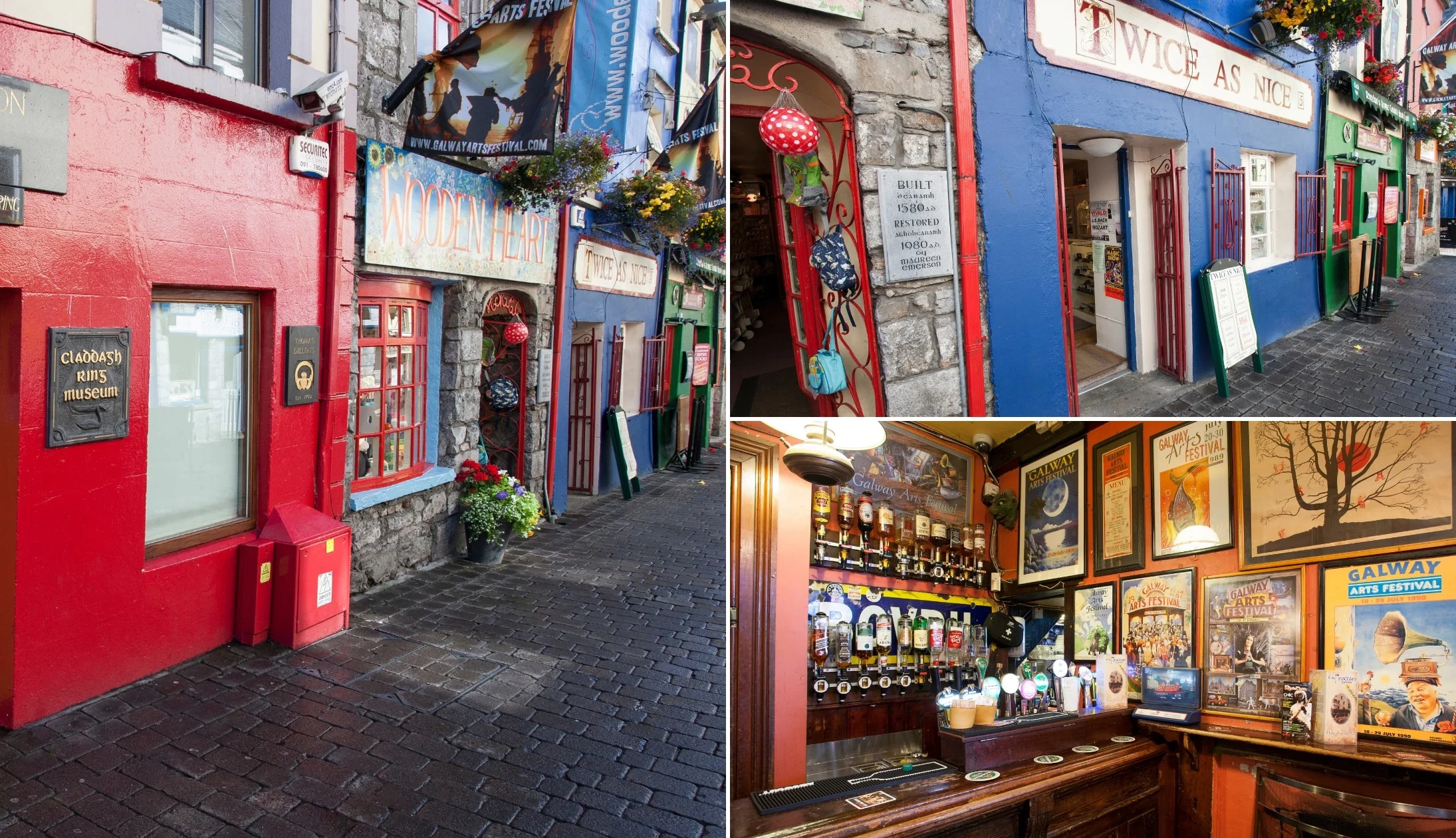
Photos by Stephen Power via Ireland’s Content Pool
On day 4 of this itinerary, you’ll be taking the train from Dublin City to Galway City.
As always, we’d recommend booking your train ticket in advance to ensure you get a ticket and to avail of a lower price.
Recommended accommodation in Galway
- Budget: Feeney’s Audubon Lodge (in Salthill outside of the city by the sea) and Corrib View Guesthouse (a 45-minute walk from Eyre Square)
- Mid-range: Balcony House B&B (10-minute walk from Eyre Square) and Ash Grove House (gorgeous guesthouse near Galway Cathedral)
- Luxury: The G Hotel (luxury hotel in the city) and Glenlo Abbey (one of Ireland’s top hotels – a 15-minute drive from the city)
Today you are taking the train from Dublin to Galway, below is an overview of that trip
Stop 1: Heuston Station
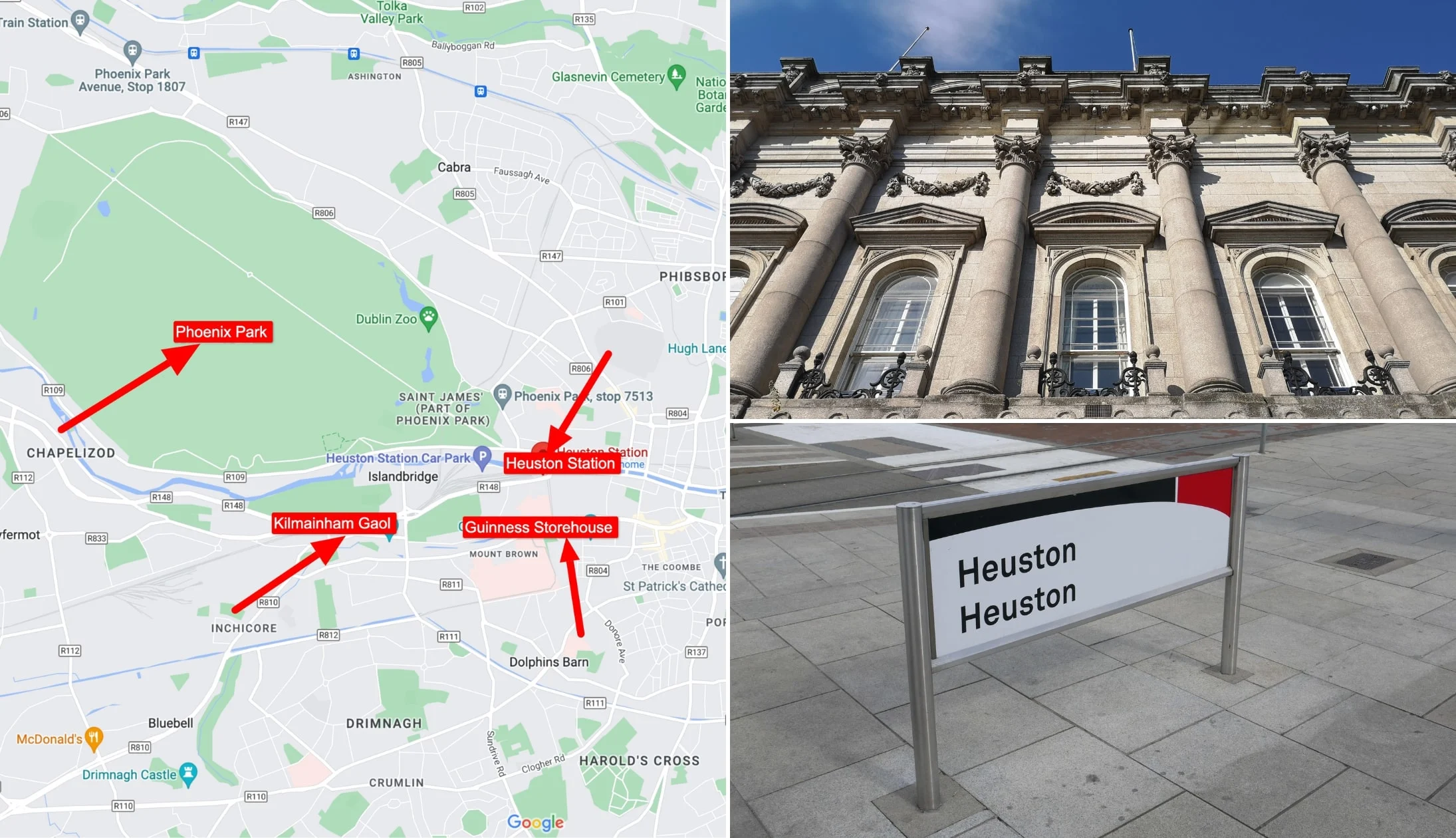
Photo left: Google Maps. Others: Shutterstock
The train to Galway departs from Heuston, you can take a taxi here, walk or take the Luas Red line, which has a stop right out front. The trip to Galway takes about 2.5 hours.
There are shops inside the station where you can grab snacks for the train and breakfast. We recommend buying food for the train instead of waiting to buy something on the train.
Stop 2: Galway Ceannt Station
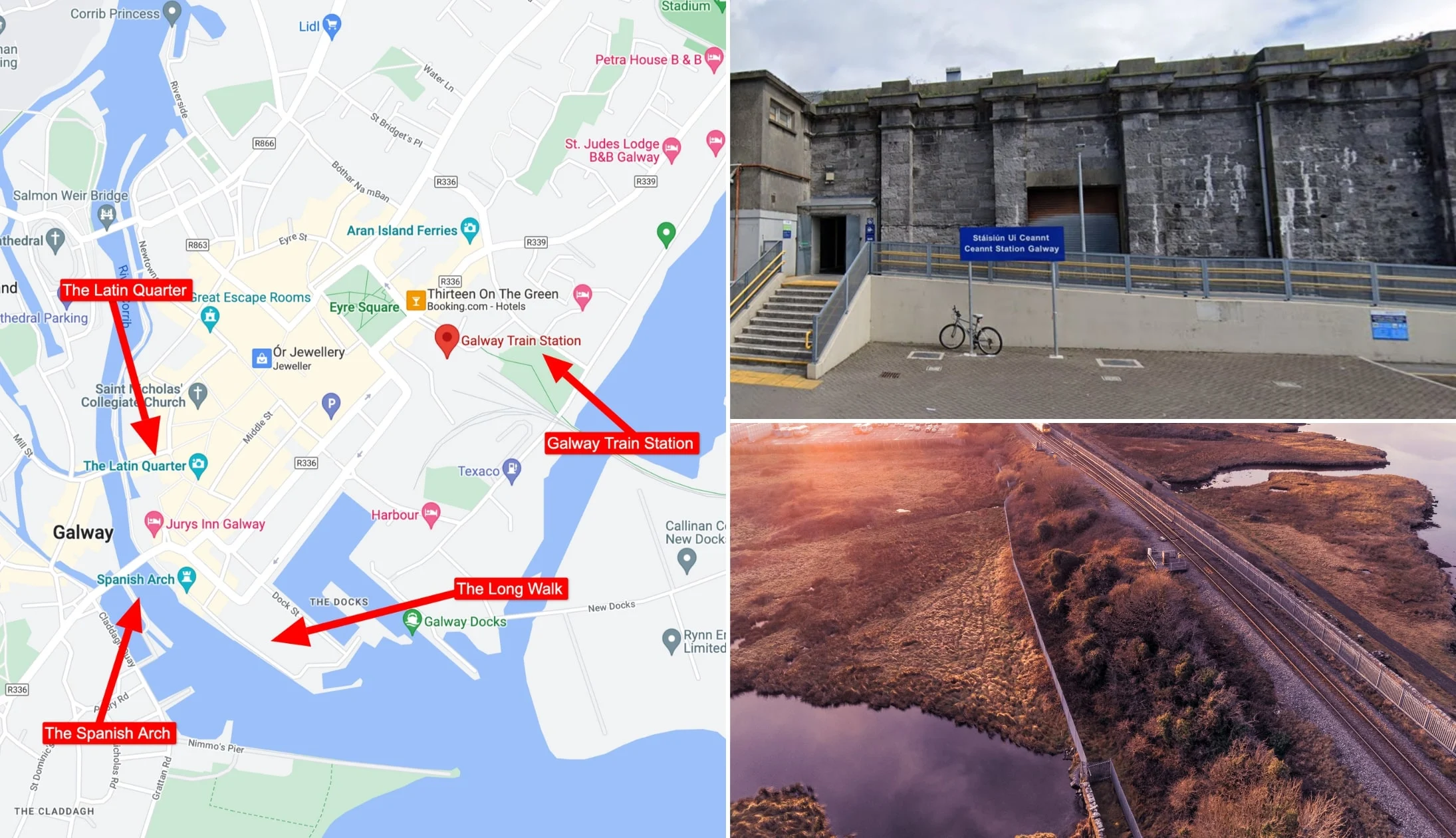
Bottom right photo: Shutterstock. Others: Google Maps
Welcome to Galway! The train station is located in the centre of Galway so, depending on your accommodation, you shouldn’t have to walk too far.
From here, we recommend you go drop off your bags before setting off to explore the city.
Stop 3: Check-in, get lunch and decide between walking/the bus
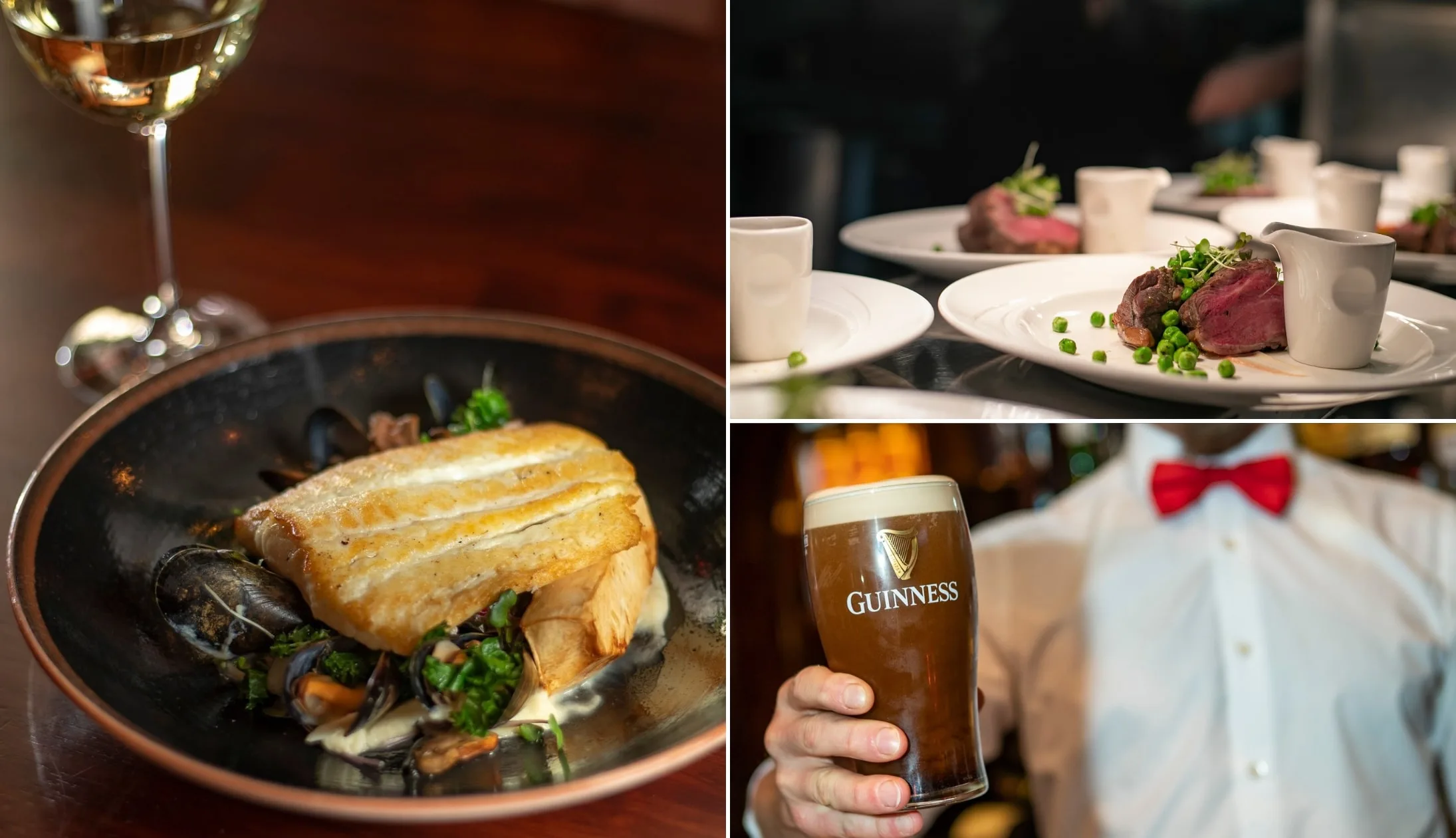
Photos via Blakes Bar Galway on FB
When you land in Galway, head to your accommodation, get checked in and head for lunch.
By now, you must be hungry. There are heaps of brilliant places for lunch in Galway, but if you don’t want the hassle of finding somewhere to eat, we’ve got a few suggestions!
We recommend Blakes Bar (traditional pub grub), Zappis (authentic Italian cuisine), or Tigh Neachtain (Irish and international cuisine).
Now, Galway is a very walkable city, but if it’s raining or if you fancy getting dropped to the ‘main’ attractions, the hop-on/hop-off bus tour is well worth buying.
Regardless of which option you choose, here are some of our favourite sites in Galway City (we’ve listed them in a logical way for you to walk between them).
Stop 4: Galway Cathedral
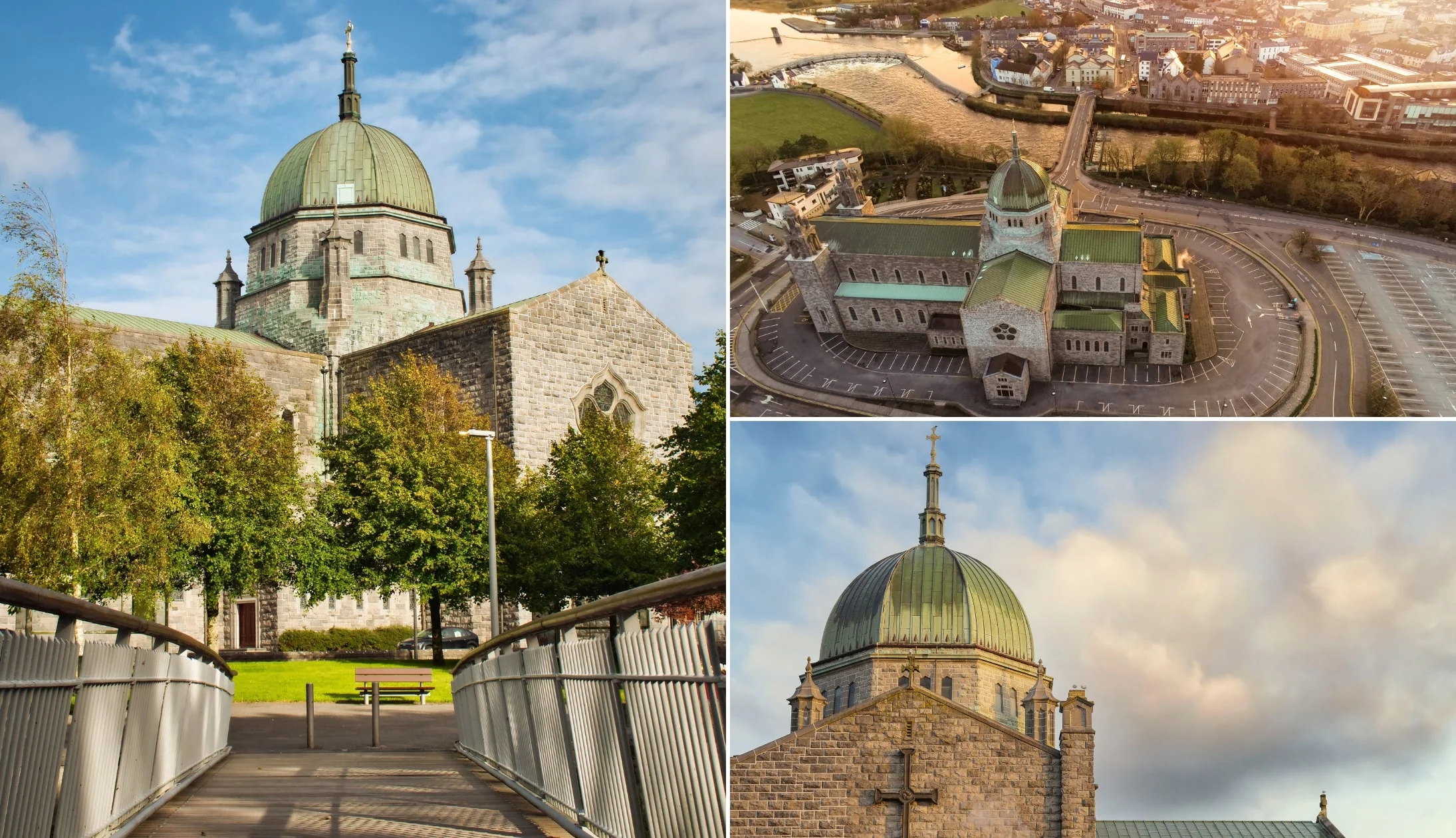
Photos via Shutterstock
Galway Cathedral is wonderfully impressive both inside and out. It’s arguably the jewel in the Galway City skyline and you’ll cop it from many places as you stroll around the city.
Interestingly enough, it’s not as old as it looks, and construction on the building was only completed in 1965, earning it the title of ‘the last great stone cathedral to be constructed in Europe’.
The cathedral is free to enter, but visitors are asked for a donation of €2 to help with the building’s upkeep.
Stop 5: Quay Street and the Latin Quarter

Photos by Stephen Power via Ireland’s Content Pool
Galway’s colourful streets are an absolute joy to ramble along regardless of the time of year.
If you’re walking from the cathedral, you’re a short stroll away from the Latin Quarter and Quay Street where you can have a nosey around.
These streets are alive with the buzz from tourists and locals alike.
Stop 6: The Hall of the Red Earl
One of our favourite places to visit in Galway (especially if it’s raining!) is the Hall of the Red Earl.
The Hall of the Red Earl is one of Galway’s most interesting sites. The ruins date back to the 13th century, with ties to the founding of Galway and the Anglo-Norman De Burgo family.
It was the first municipal building in the city, used for collecting taxes, hosting banquets, and sentencing criminals.
The Hall of the Red Earl was lost as the city grew until 1997, when the ruins were unearthed by archaeologists on behalf of the Office of the Public Works.
Today, you can walk amongst the ruins, view the artefacts, and learn about the hall’s history from the informative displays.
Stop 7: Galway City Museum
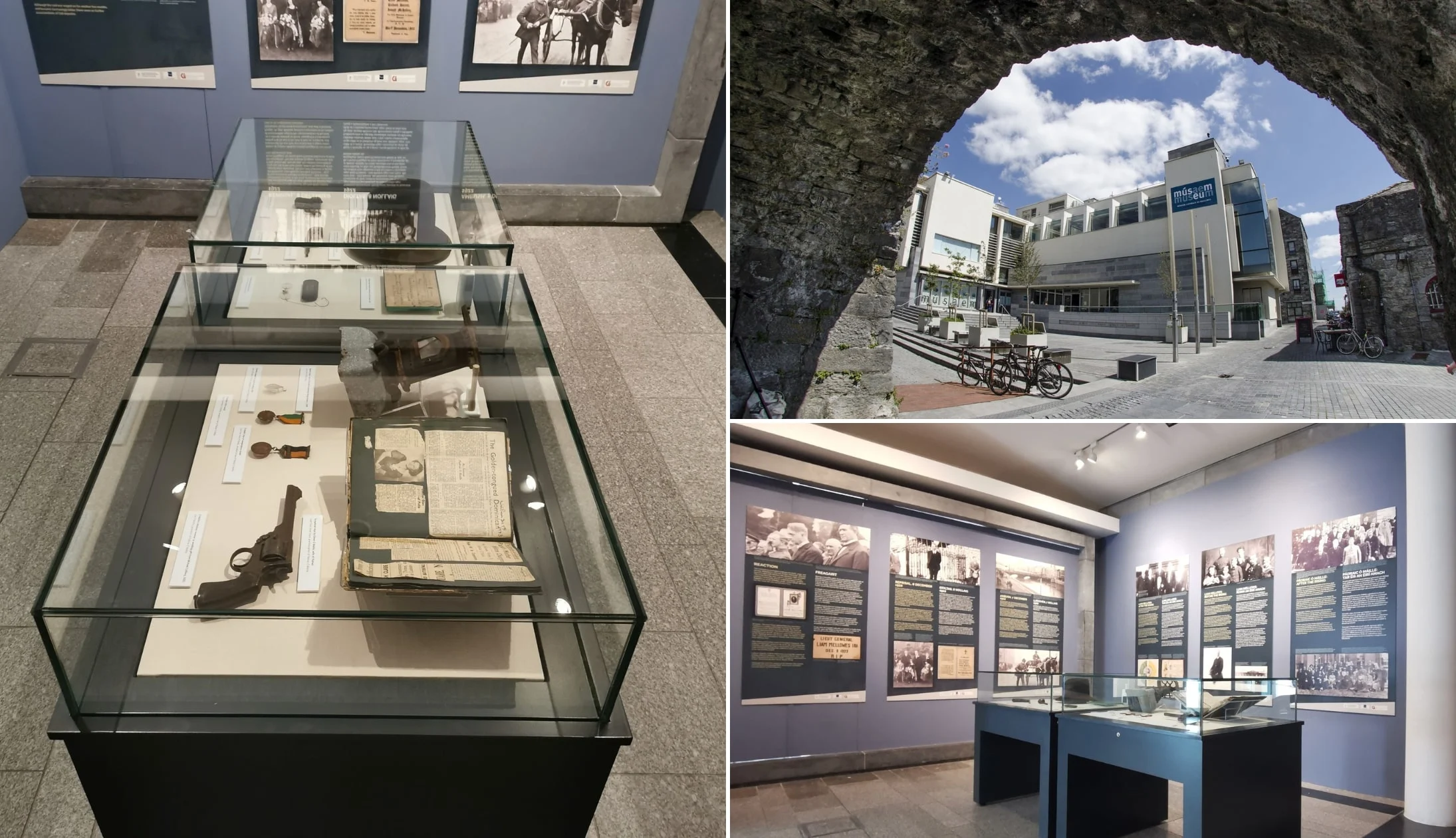
Photos via Galway City Museum on FB
The Galway City Museum is just a stone’s throw from the Spanish Arch. It’s one of the best places to learn about Galway’s history, culture, and archaeology, with collections telling the story of prehistoric Galway all the way through to 19th and 20th-century Galway!
The museum has three floors and seven long-term exhibitions, including The Wild Atlantic – Sea Science, and an exhibition on Pádraic Ó Conaire.
It’s free to visit, although donations are always appreciated.
Stop 8: Spanish Arch and the Long Walk
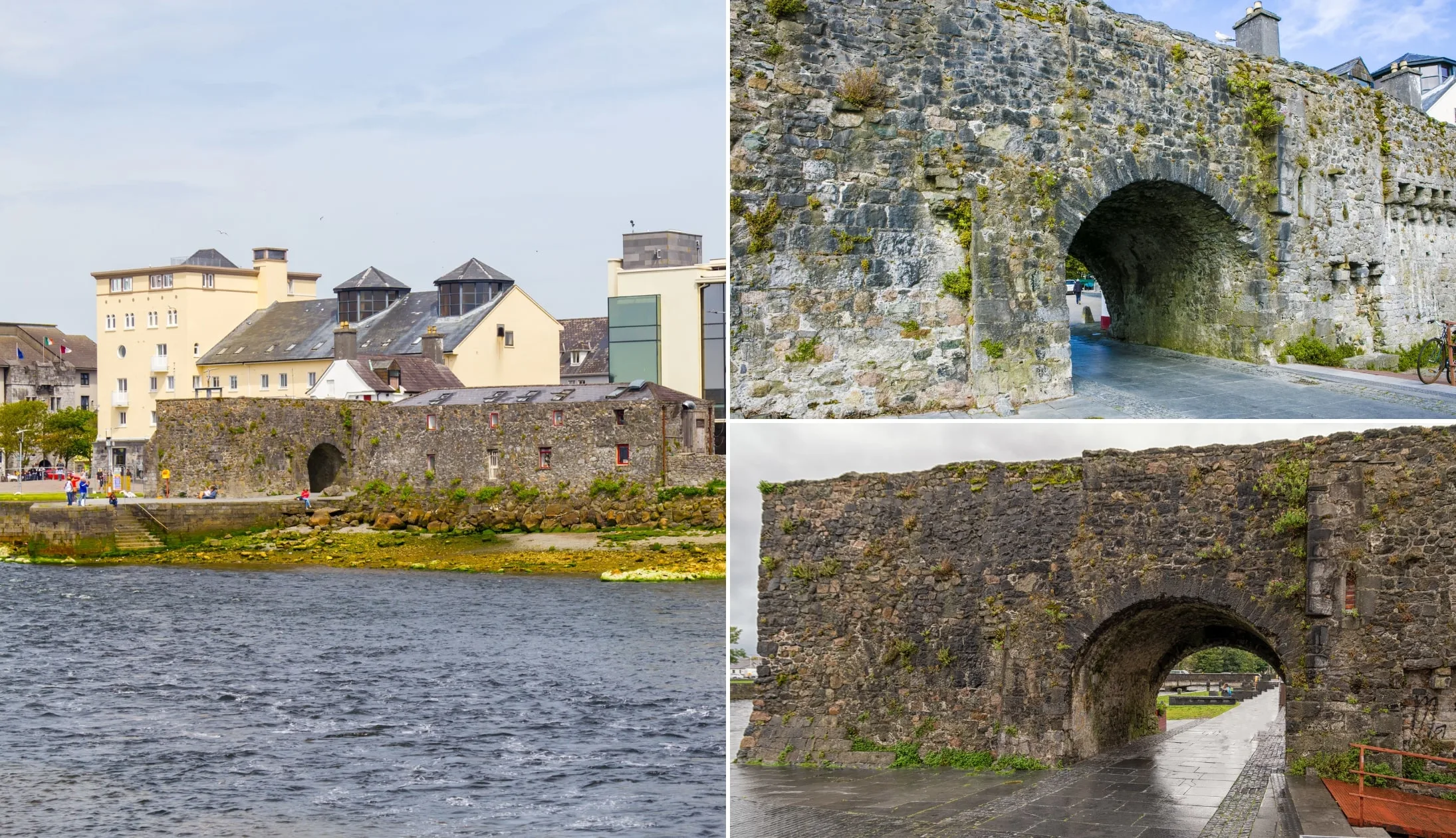
Photos via Shutterstock
The Spanish Arch is a must-see Galway attraction, dating back to Medieval times. The large stone arch is located on the outskirts of the city centre, overlooking the Claddagh (shore).
It originally housed soldiers who were keeping watch on the city’s Medieval walls. Its nickname is thought to come from the city’s merchant trade with the Spanish, whose ships would often be docked in the area!
From the Spanish Arch, you can take a short stroll alongside the water to what’s known as The Long Walk. You’ll likely have seen pictures of it (it’s a line of colourful buildings right on the water).
Stop 9: Dinner, drinks and live music
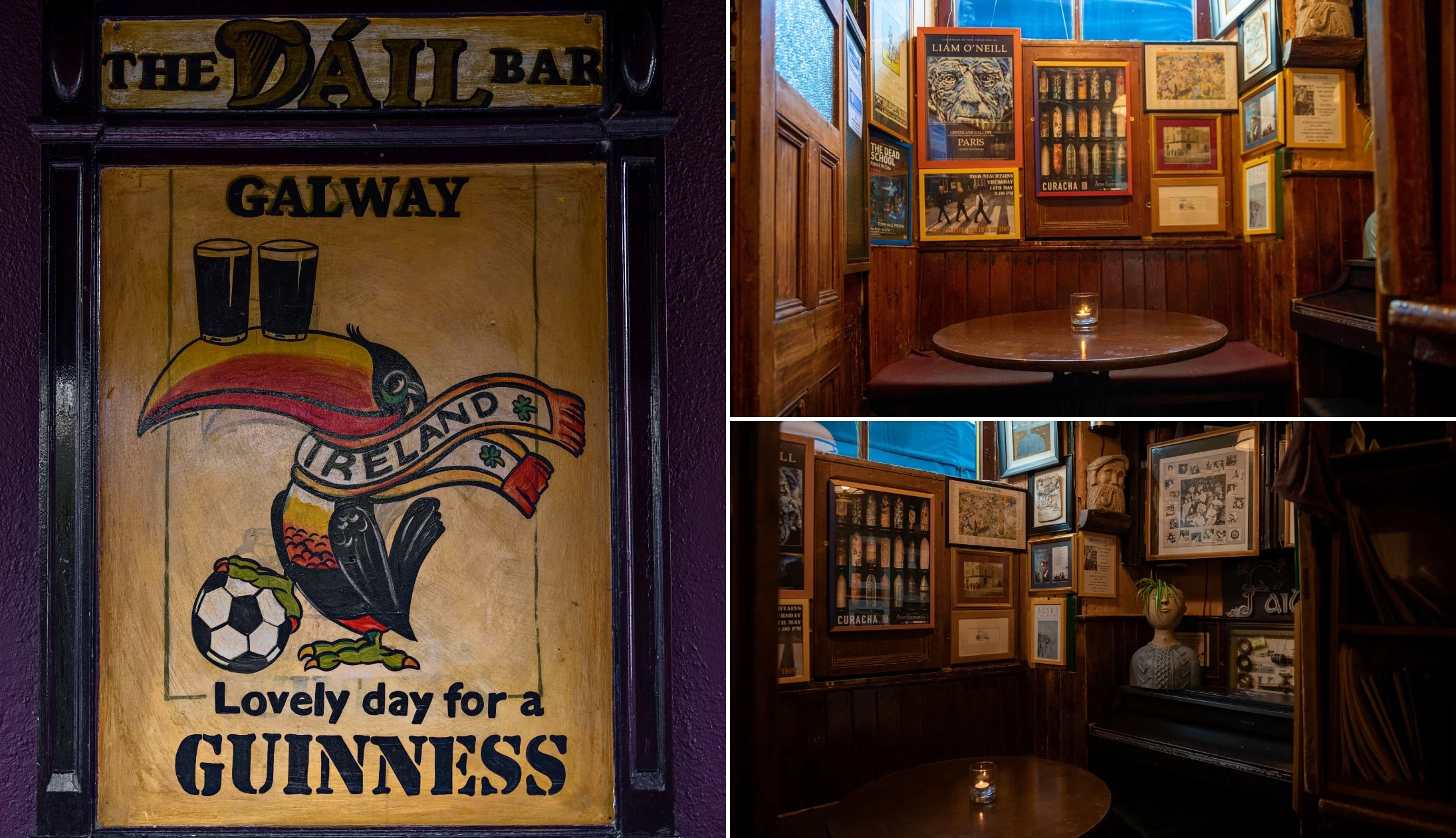
Photos courtesy Failte Ireland
You’ve had a busy aul day today, so it’s time to kick back and chill with food and, if you fancy, a drink and some live music.
Galway is a lively city regardless of the time of year. Here’s some spots worth checking out:
Our dinner recommendations
For dinner, we’ve got a few stellar recommendations: Ard Bia, The Quay Street Kitchen, and Dela. Ard Bia is absolutely fantastic, but you need to book in advance for dinner.
The restaurant has a quirky interior and serves beautifully presented modern dishes.
The Quay Street Kitchen has a great selection of vegan and vegetarian-friendly dishes, and Dela has modern Irish cuisine on the menu.
Live music and trad bars
There’s some mighty pubs in Galway. After dinner, head out for drinks at either Tigh Neachtain or The Crane. Both are traditional pubs with a great atmosphere.
Trad music is an integral part of the city, with heaps of options to choose from. Our favourite spots are Crane Bar (mentioned above) and Tigh Chóilí.
Day 5: Connemara and Cong
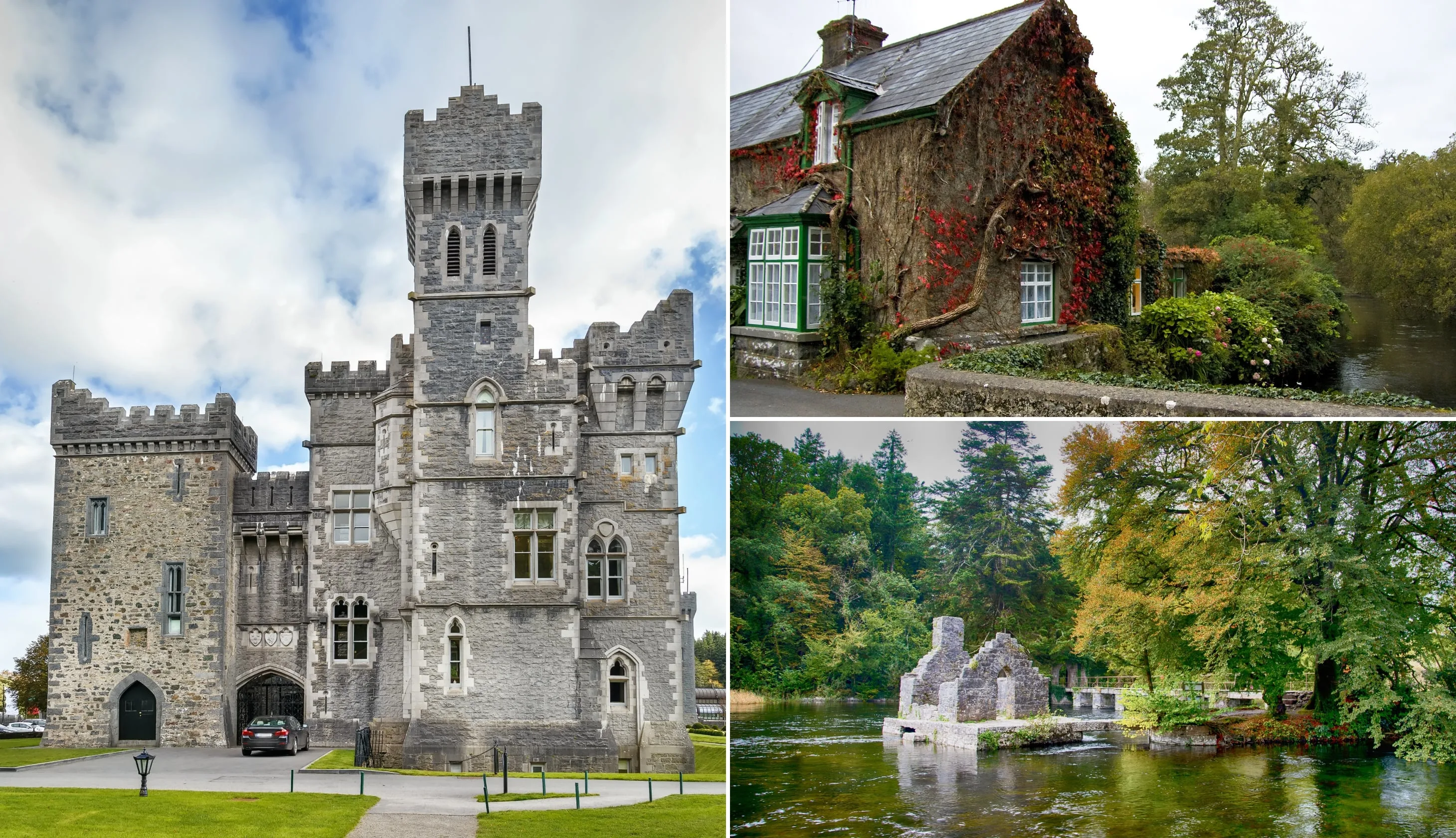
Photos via Shutterstock
It’s day 5 of your 12 days in Ireland, and today you’ll be exploring the breathtaking Connemara and Cong!
Grab breakfast at your accommodation or head to Gaslight Brasserie, Esquires Organic Coffee Co, or Jungle which are all near the departure point outside of the Hyde Hotel.
This 8-hour organised day trip takes you through Connemara, stopping at popular attractions like Kylemore Abbey
Keep reading below for an overview of the tour, but please note that 1, you may not always physically stop at all of these sights and 2, these tours are subject to change, so always check with the provider in advance.
Stop 1: Kylemore Abbey
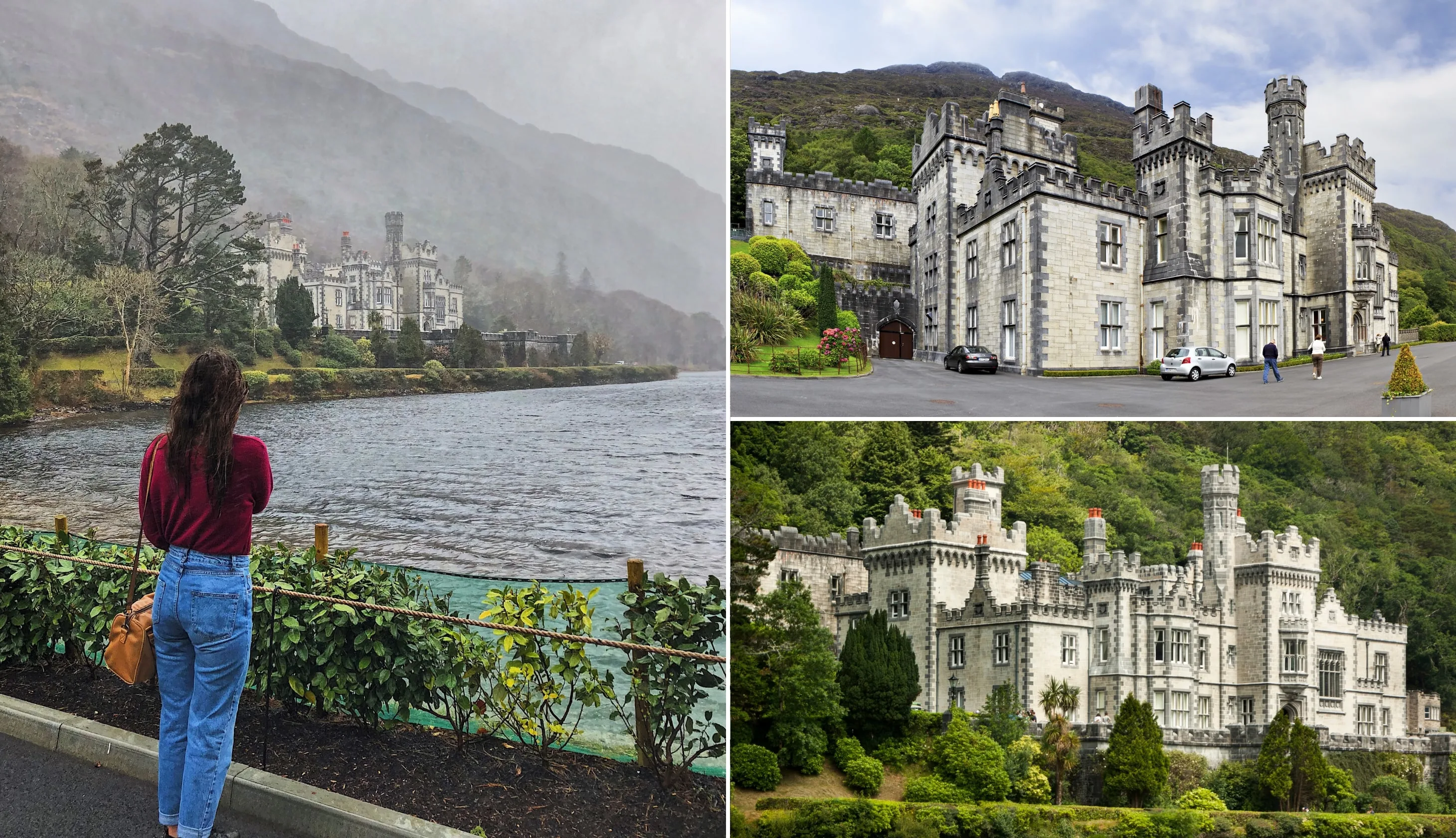
Photos via Shutterstock
Kylemore Abbey is a stunning Benedictine monastery that dates back to the 1920s. It’s incredibly picturesque, sitting on the shores of Pollacapall Lough.
The lower floors of the abbey have been restored and are open to the public, as well as the beautiful Victorian Walled Garden.
The estate includes a Neo-Gothic church and several woodland and lake-side walks.
Stop 2: Killary Fjord and Leenane
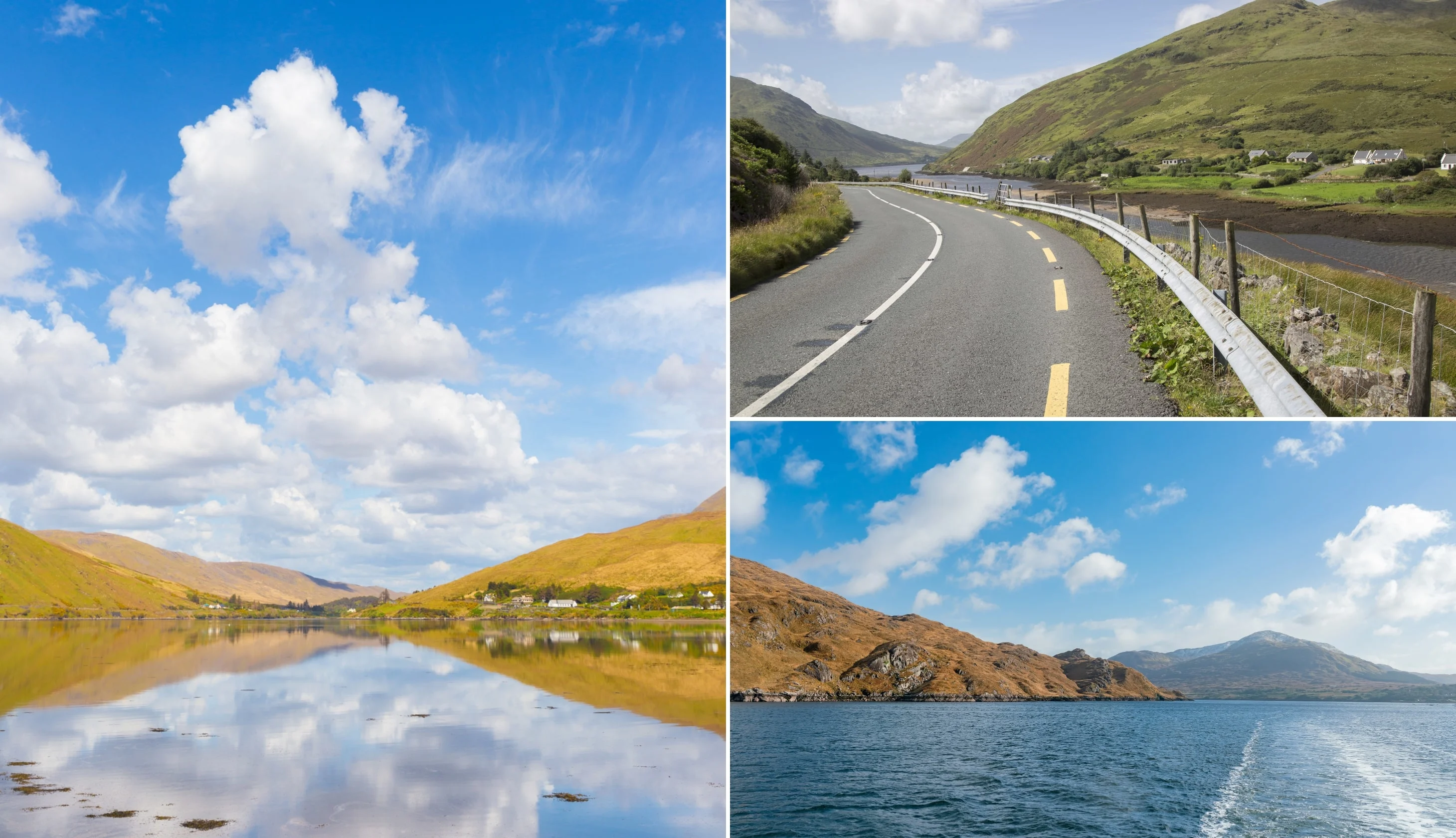
Photos via Shutterstock
Leenane is a beautiful village in an area of outstanding beauty. The village sits at the top of Killary Fjord, tucked away under the Maamturk mountains.
If you’re about ready for a second coffee and a snack, we recommend picking something up at The Purple Door, a lovely family-run cafe.
Killary Fjord is Ireland’s only fjord! It stretches 16km across, forming a natural border between County Galway and Mayo.
It’s a truly breathtaking part of Connemara, with mountains rising up dramatically around the water.
Stop 3: Cong

Photos via Shutterstock
Cong Abbey, or the Royal Abbey of Cong, is a historical ruin in the heart of Cong. The ruins mostly date back to the 12th century, although it was built on the site of a 6th-century monastery founded by St. Feichin.
The current abbey was reconstructed in 1307 and dedicated to St. Mary. But, sadly it fell into ruin sometime during the mid 1500s, after the dissolution of the monasteries by Henry VIII.
The ruins are in good condition and are said to be one of the best examples of medieval ecclesiastical architecture in the country.
When you visit, try to imagine the 3,000 inhabitants that once lived on the abbey.
Stop 4: An Spideal
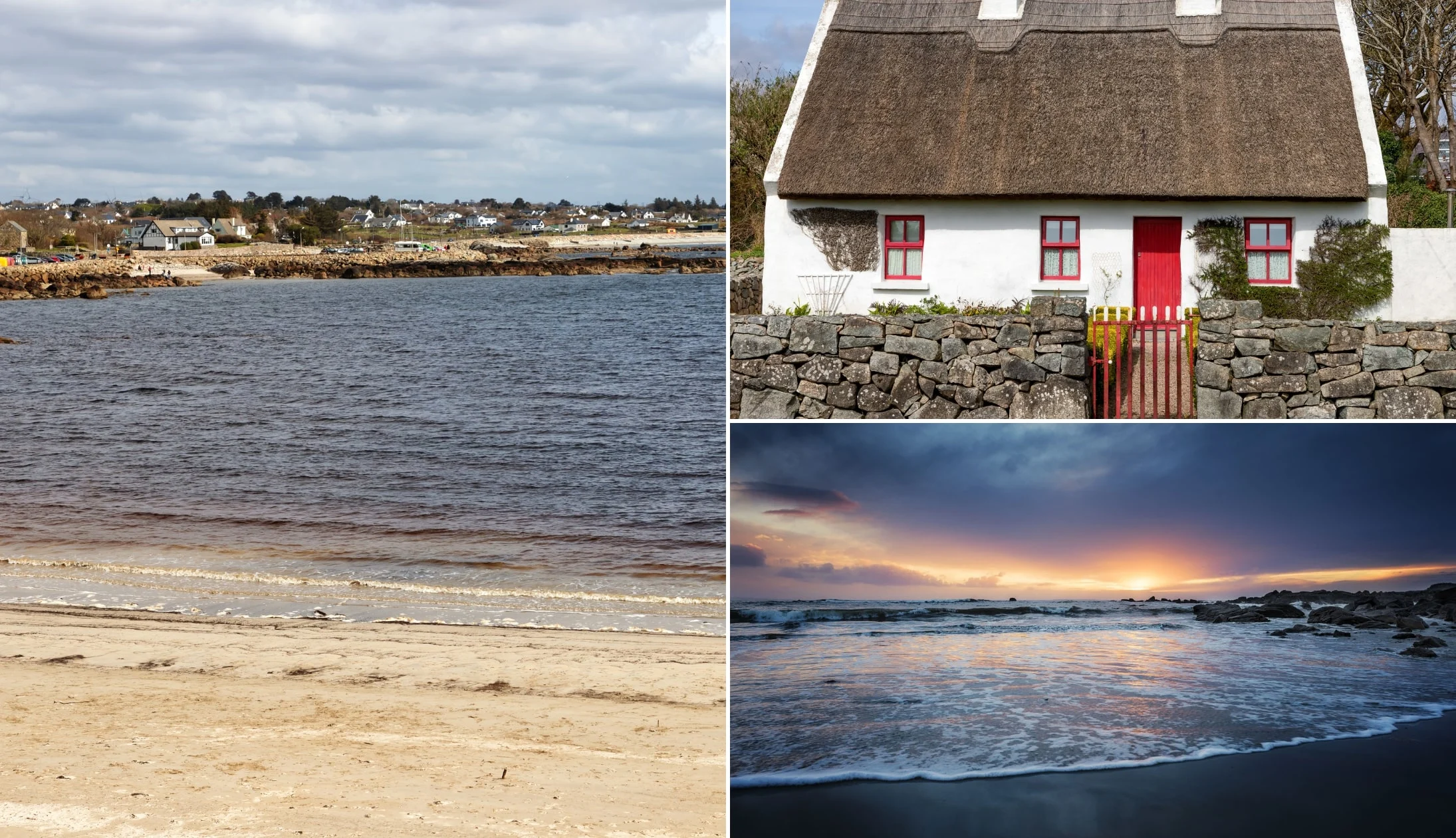
Photos via Shutterstock
An Spideal on the shores of Galway Bay is a gorgeous little seaside village full of rural Irish charm.
There are several beaches in the town that are worth a look if you have time, or if you’d rather do some shopping for souvenirs, head to the Spiddal Craft Village & Cafe for unique gifts made by local artists.
The village is a part of the Gaeltacht (Irish-speaking area), and a large percentage of the population speaks Irish regularly.
Stop 5: Back to Galway for the night

Photos courtesy Failte Ireland
After a long day, it’s time to make your way back to Galway. Make a stop at your hotel to freshen up for dinner, or if you’re simply too hungry, head straight to the restaurant from the bus stop!
Here is a reminder of our earlier recommendations for our top places to eat, drink, and be merry in the city!
Our dinner recommendations
For dinner, we’ve got a few stellar recommendations: Ard Bia, The Quay Street Kitchen, and Dela. Ard Bia is absolutely fantastic, but you need to book in advance for dinner.
The restaurant has a quirky interior and serves beautifully presented modern dishes.
The Quay Street Kitchen has a great selection of vegan and vegetarian-friendly dishes, and Dela has modern Irish cuisine on the menu.
Live music and trad bars
There’s some mighty pubs in Galway. After dinner, head out for drinks at either Tigh Neachtain or The Crane. Both are traditional pubs with a great atmosphere.
Trad music is an integral part of the city, with heaps of options to choose from. Our favourite spots are Crane Bar (mentioned above) and Tigh Chóilí.
Day 6: County Clare
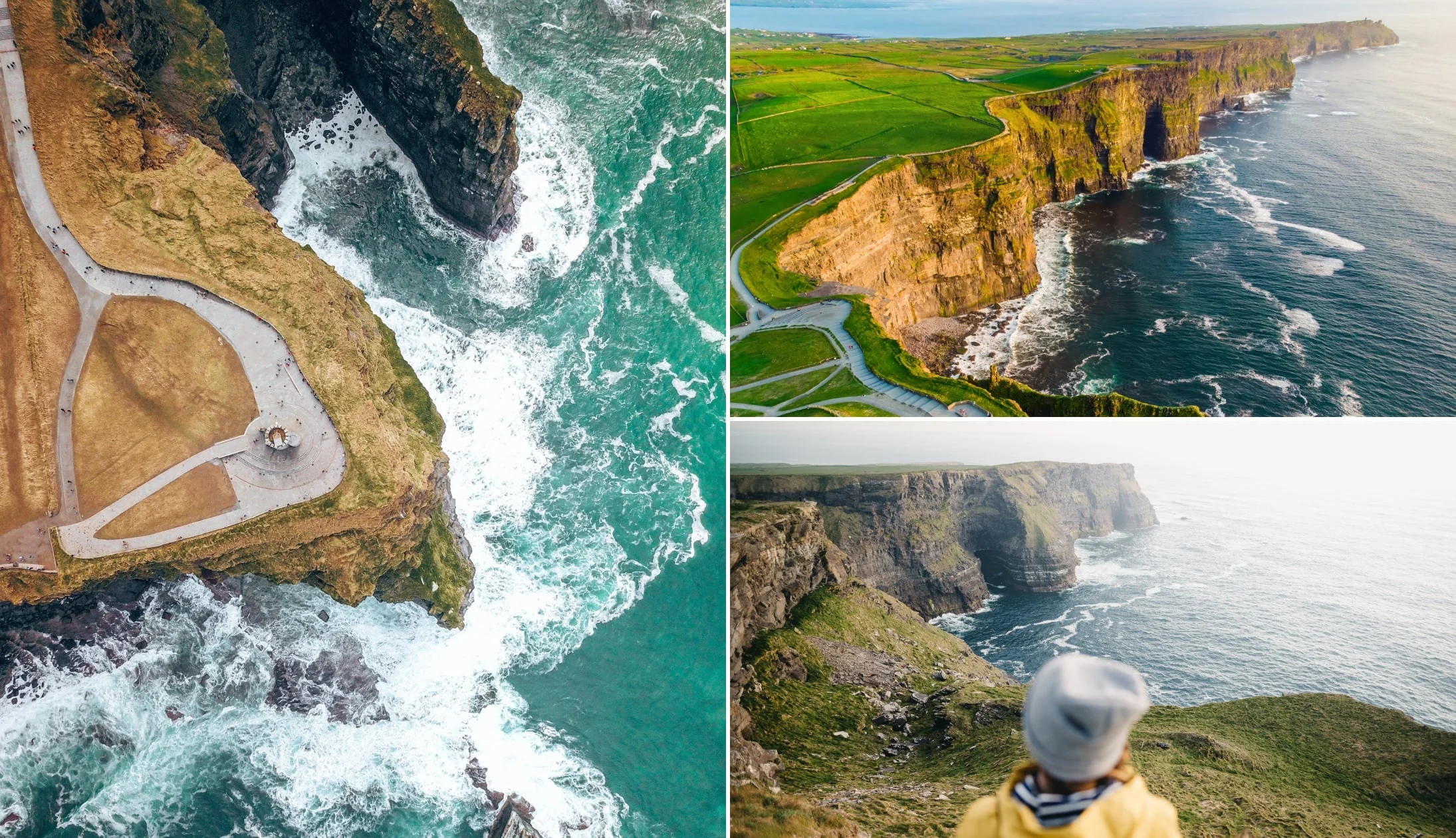
Photos via Shutterstock
It’s day 6 of your 14 days in Ireland, and today, you’ll be taking a tour of Clare. It’s a wonderful corner of the island, with beautiful landscapes and historical sites.
It’s home to the Burren National Park and the Cliffs of Moher, one of the most popular natural tourist attractions in the country!
We’re recommending this 8-hour day trip from Galway City as it takes in a good chunk of Clare’s main attractions (and it has excellent reviews).
If you fancy a hearty breakfast, we’d recommend Pascal Coffee House (the pancakes are amazing) or Gaslight Brasserie (great for a full Irish or a breakfast burrito).
Keep reading below for an overview of the tour, but please note that 1, you may not always physically stop at all of these sights and 2, these tours are subject to change, so always check with the provider in advance.
Stop 1: Dunguaire Castle
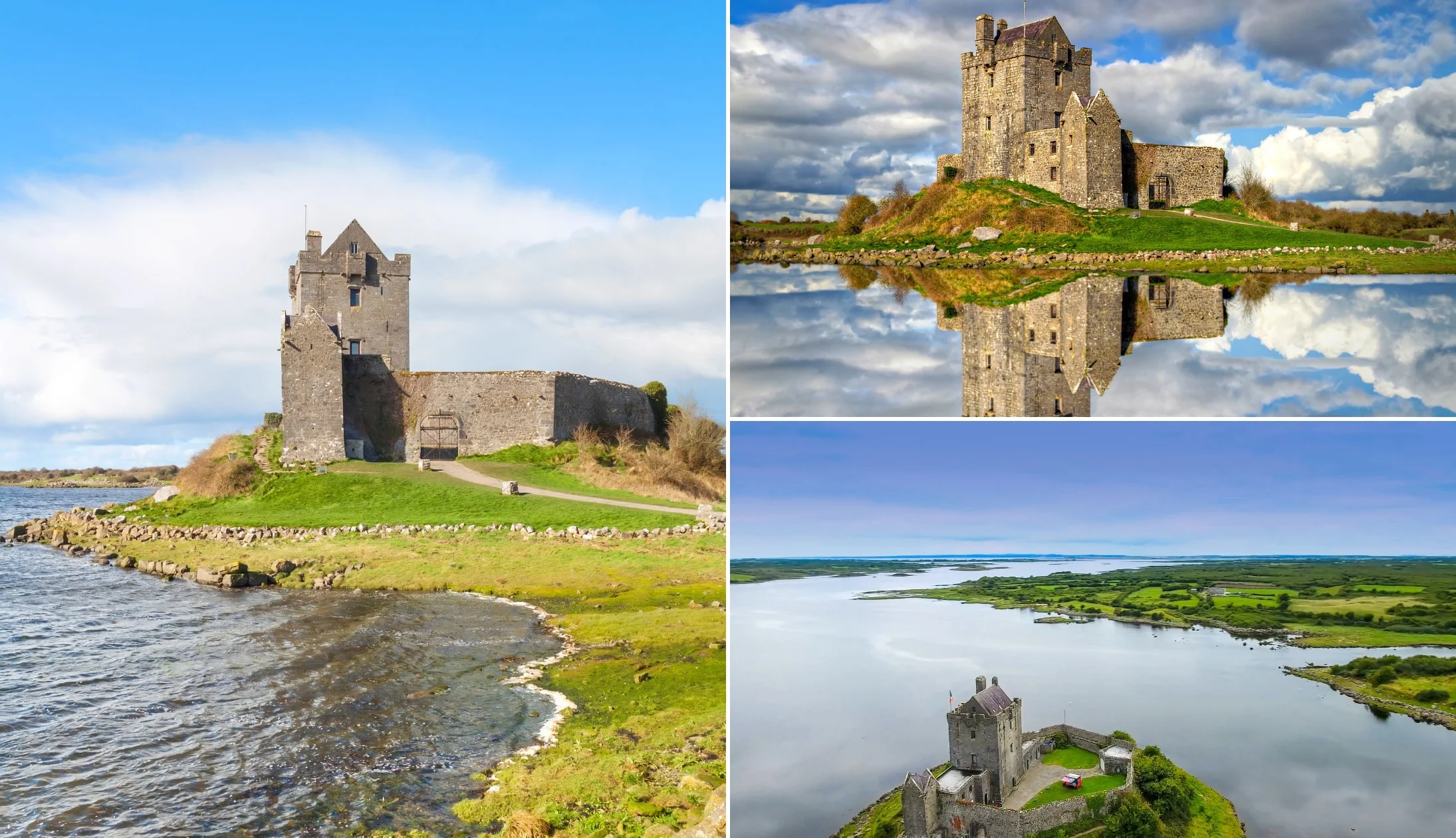
Photos via Shutterstock
The enchanting Dunguaire Castle sits on the shores of Galway Bay and has an impressive 75-foot tower.
According to legend, if you stand at the front gate and ask a question, you’ll have an answer by the end of the day!
The castle was built in 1520 and belonged to the O’Hynes clan. In 1912, the castle was bought by writer Oliver St. John Gogarty.
During his ownership, he restored the castle and hosted several famous writers, including W.B. Yeats and George Bernard Shaw.
Stop 2: Corcomroe Abbey
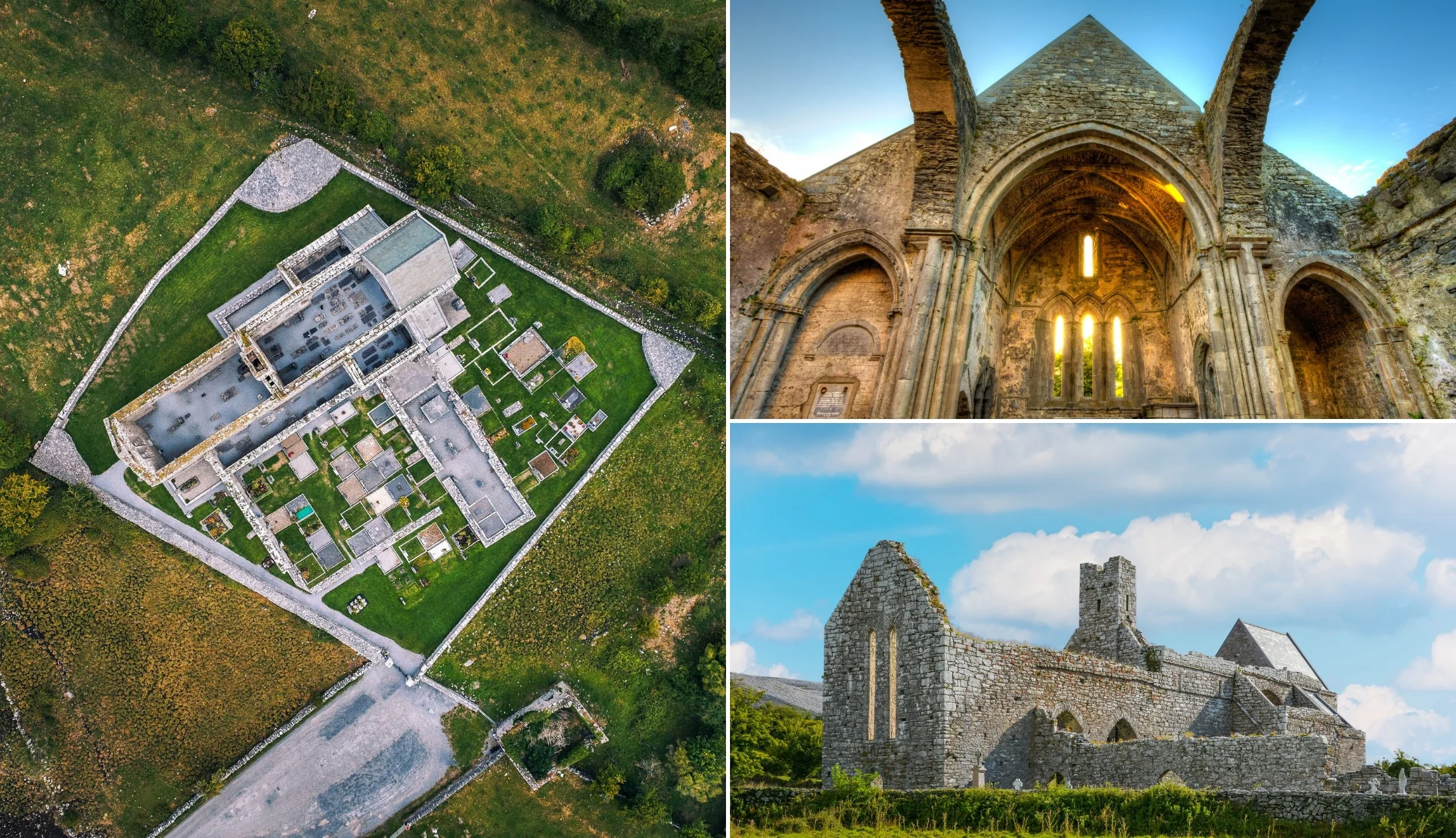
Photos via Shutterstock
Corcomroe Abbey is a late 12th/early 13th-century abbey ruin, tucked away amongst the scenic Burren hills.
The ruins are in great condition and as you pass by, admire its Cistercian architecture set against the backdrop of lush green hills.
Stop 3: The Burren
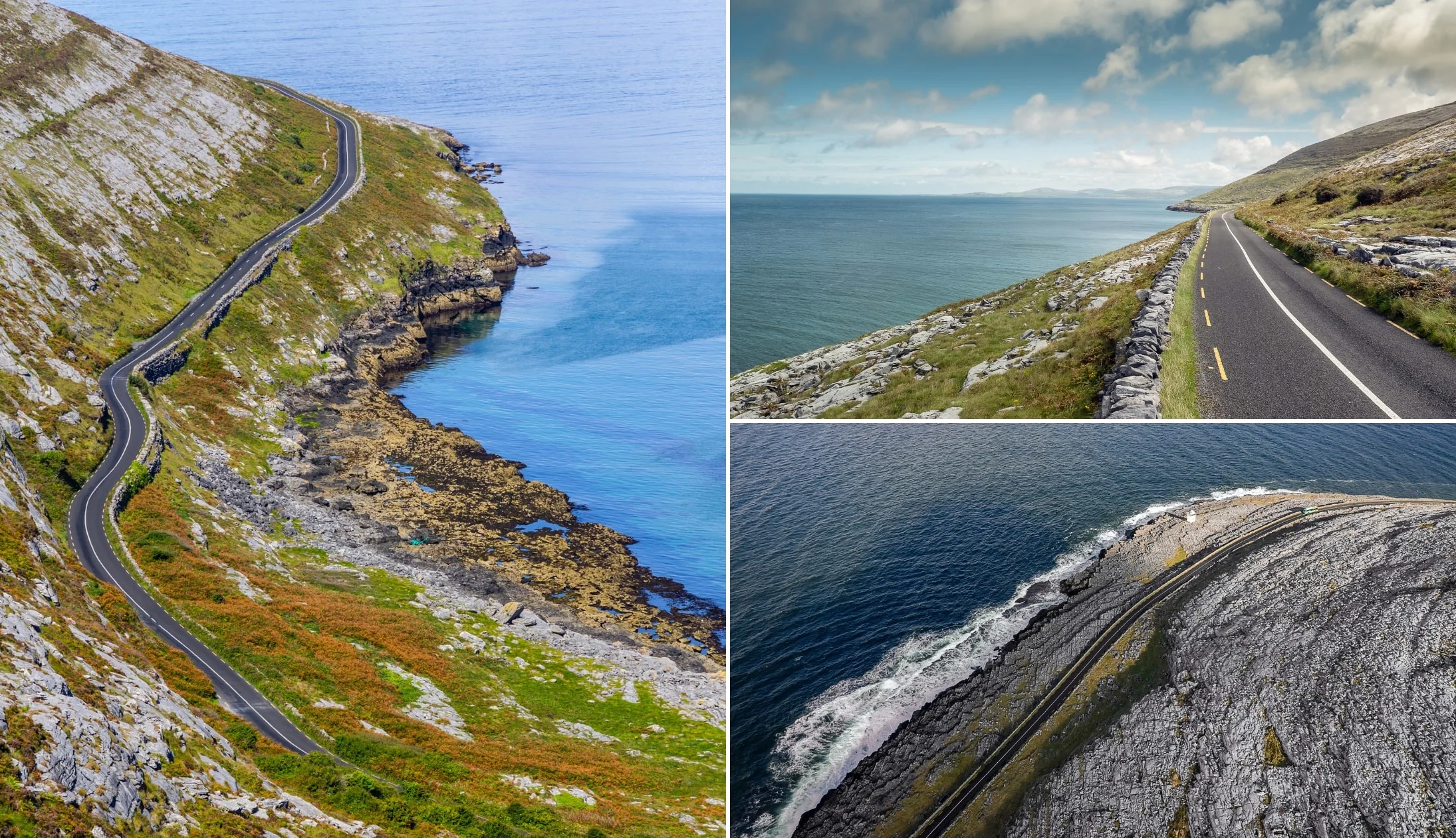
Photos via Shutterstock
During the tour, you’ll be driving right through the Burren, a gorgeous landscape characterised by huge limestone plateaus.
The Burren is what is known as a karst landscape, a distinct landform that arises when carbonate rock (such as dolomite, marble, or limestone) is slowly dissolved by water, giving the land its unique shape.
In fact, the Burren is still being shaped by the rain to this day! Karst landscapes have sinkholes, caves, and underground streams, the Burren being no exception, with huge subterranean caverns below its surface.
The Burren is one of the best examples of karst landscapes worldwide, and it has a diverse range of flora and fauna thanks to its varied landscape.
Stop 4: Doolin Pier
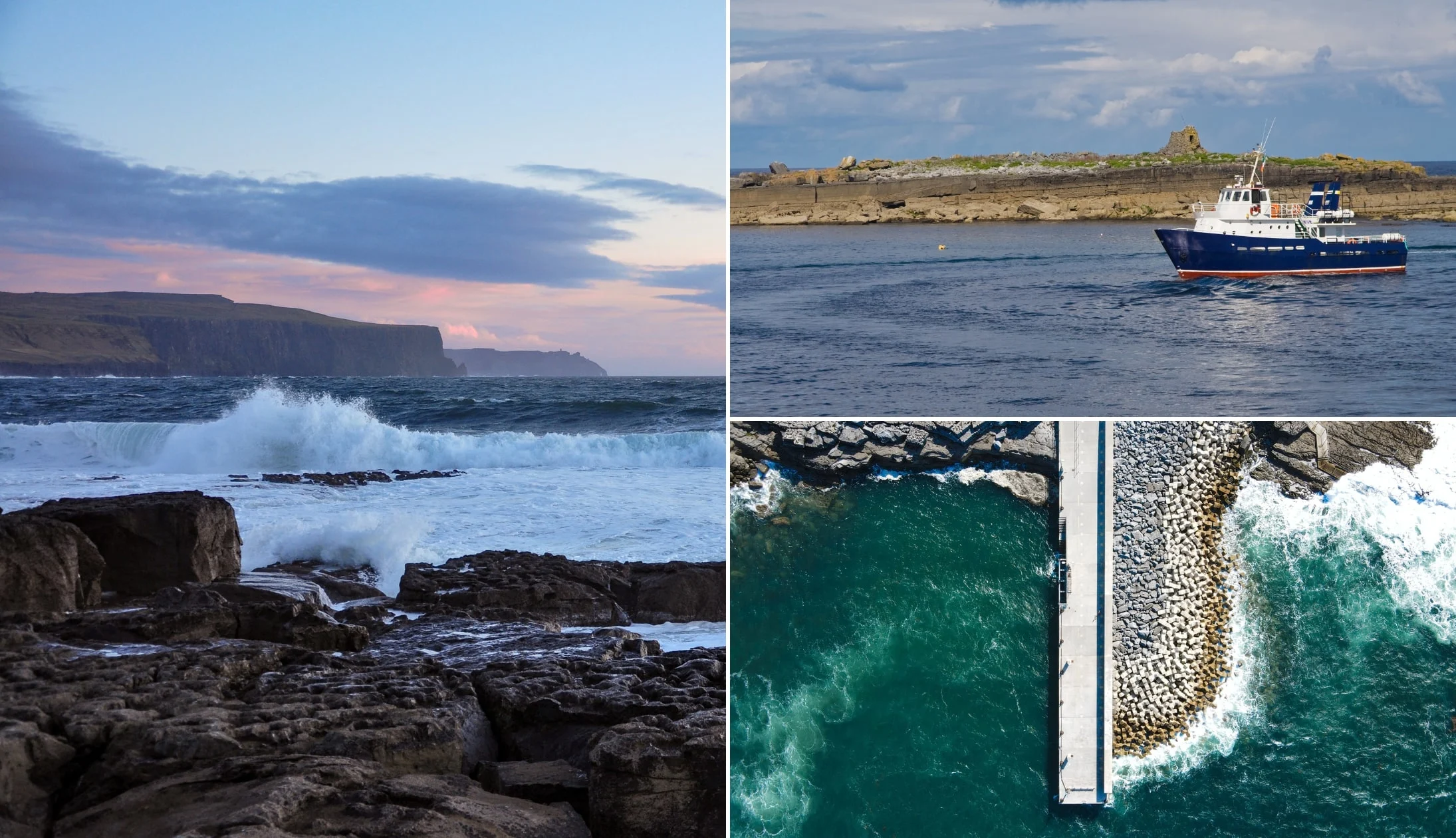
Photos via Shutterstock
You’ll then make a quick stop at Doolin Pier, the main access point to the nearby Aran Islands.
This place tends to be a hive of activity as the two ferry providers shuttle people to and from Inis Mor, Inis Oirr and Inis Meain (you’ll be visiting Inis Mor tomorrow).
Stop 5: Lunch at Hotel Doolin
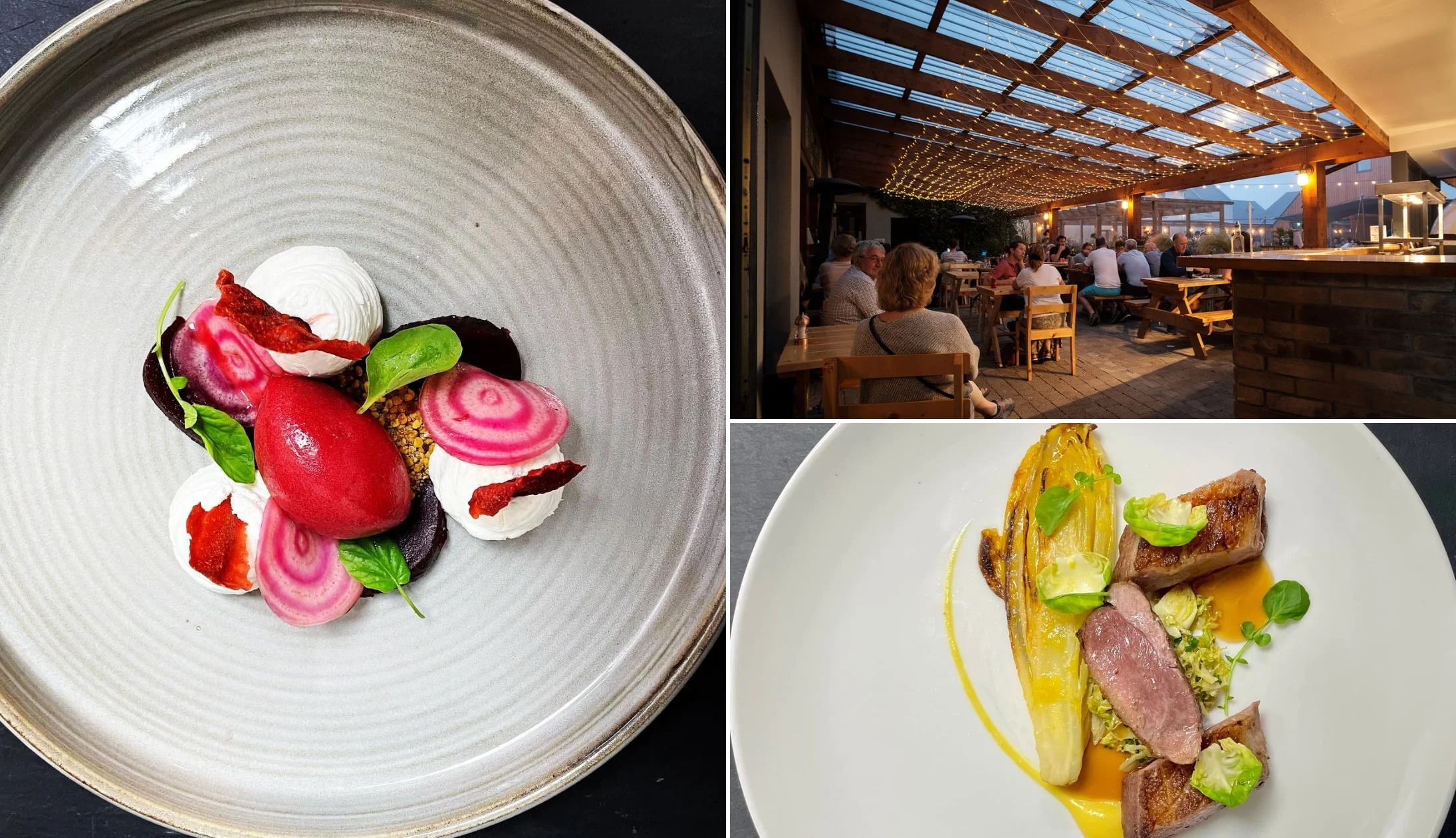
Photos via Hotel Doolin on FB
For lunch, you’ll be heading to Fitz’s Pub and Eatery, which is a part of Hotel Doolin. It’s a cosy traditional pub serving up delicious Irish food.
The Navarin-style Irish lamb stew is a huge hit, as is the sustainable all-white fish chowder. If you’re a beer drinker, make sure to try their in-house Dooliner Beer, a creamy and smooth Irish red ale.
Stop 6: The Cliffs of Moher

Photos via Shutterstock
Your next stop, the magnificent Cliffs of Moher, are one of the most popular tourist attractions in Ireland.
The cliffs are 15 minutes away from Doolin, with breathtaking views of the wild Atlantic, Galway Bay, and the Aran Islands.
There’s a visitor centre on-site, as well as 800 metres of paved walkways with viewing areas, and the historic O’Brien’s Tower.
Stop 7: Lisdoonvarna
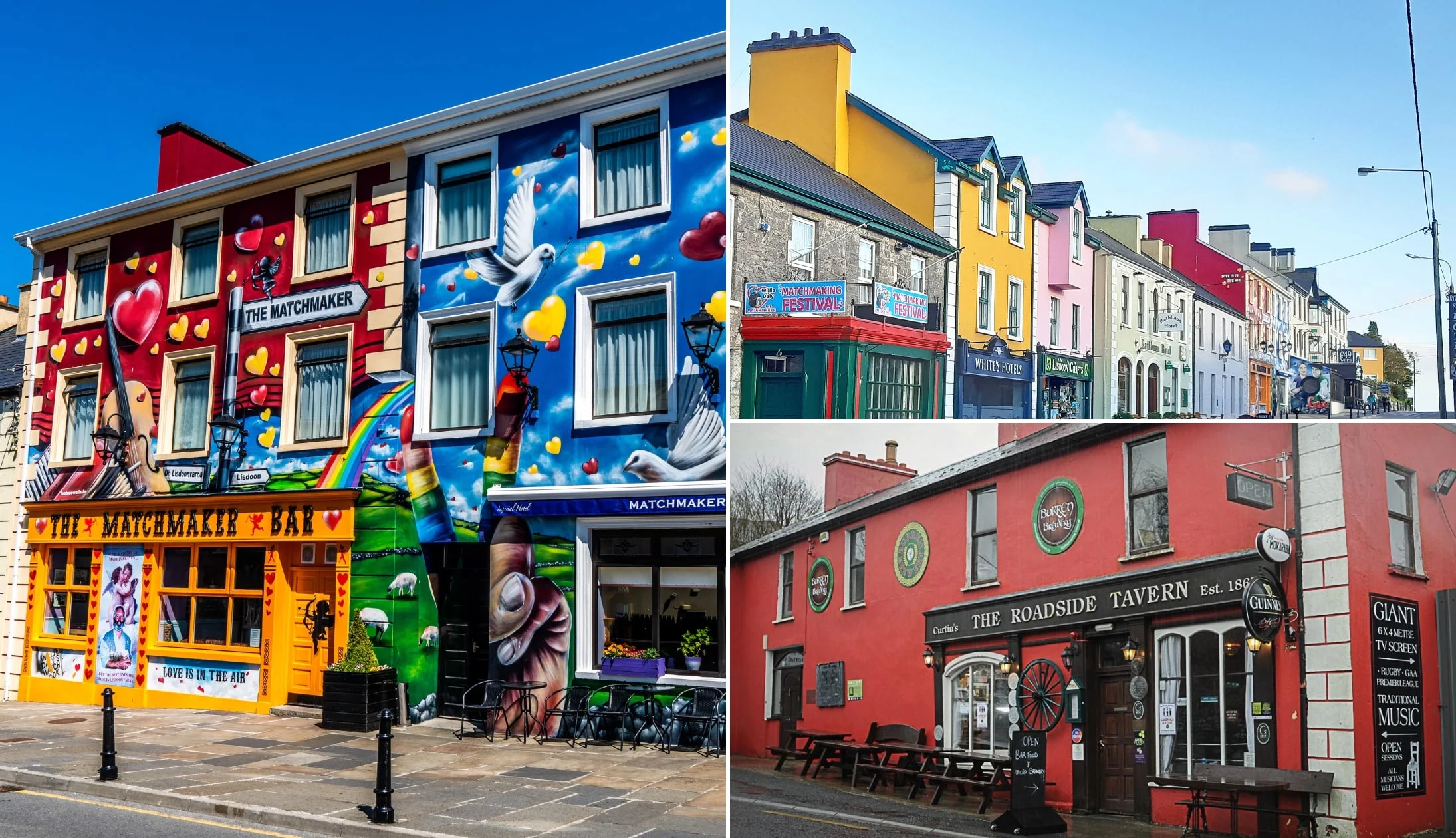
Photo left: UpSwing Mediaa. Top right: Maria Ryan Donnelly. Bottom right: Failte Ireland
Keep your eyes peeled as you pass through Lisdoonvarna, a spa town renowned for its annual matchmaking festival! The festival began in 1857 and today it attracts over 20,000 visitors from all over the globe.
Lisdoonvarna is relatively new for Irish standards (dating back to the early 19th century), but it’s still full of charm, with colourful shop fronts and traditional houses.
Stop 8: Back to Galway for the night

Photos via Blakes Bar Galway on FB
From Lisdoonvarna, it’s around one hour and 20 minutes back to Galway, so sit back and relax as you may your way back through the lovely countryside.
Take a look at our recommendations from previous days for our favourite places to eat, drink, and listen to music in the city.
Or, if you want to go somewhere different tonight, we recommend heading to Loam, one of two Michelin-starred restaurants in the city.
If it’s a special occasion, consider going all out and ordering the seven-course tasting menu (vegetarian/vegan options available).
The head chef Enda McEvoy’s carefully crafted menus were designed to showcase the best of West Ireland ingredients and the food is magnificent.
Day 7: Killarney
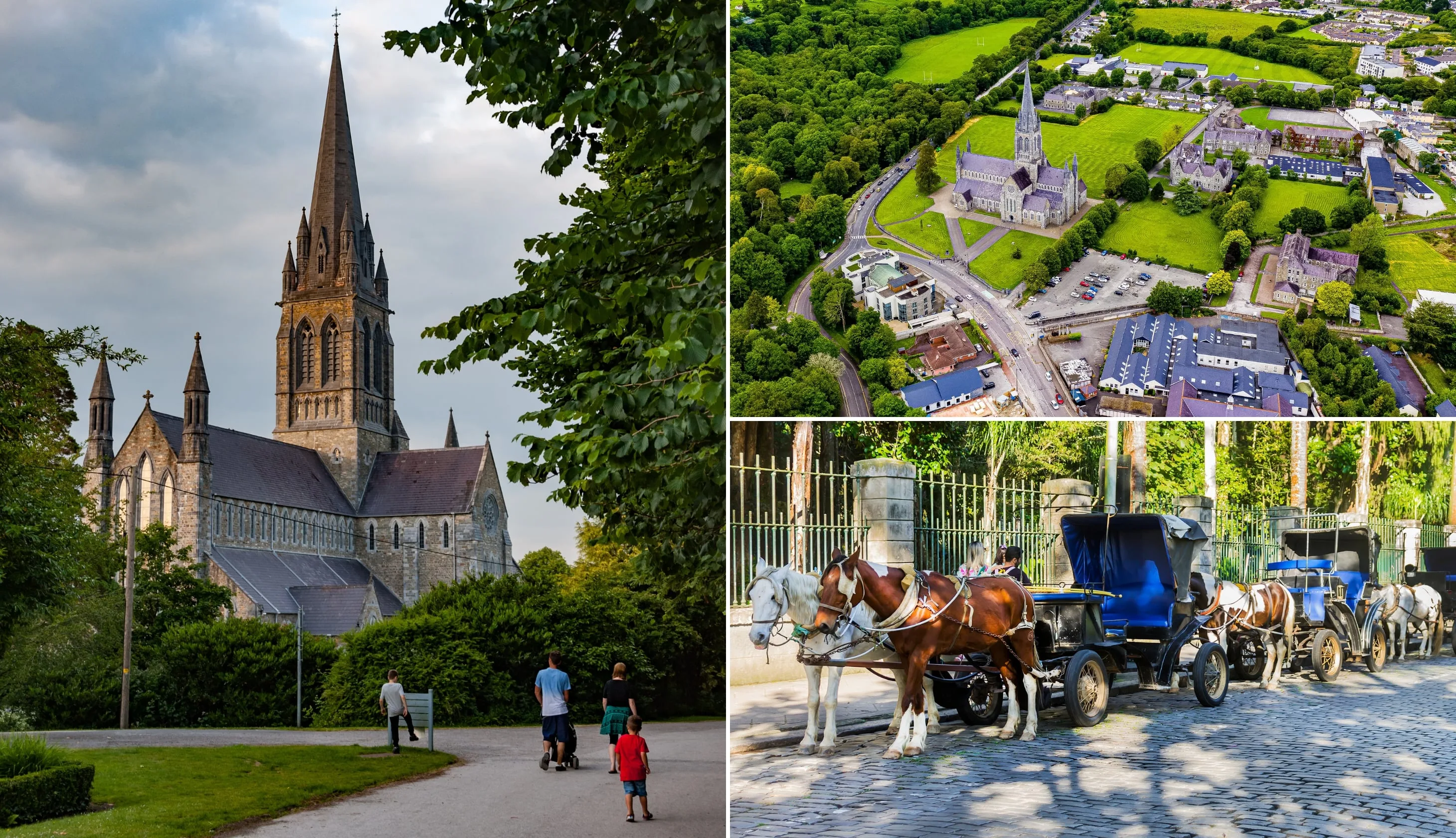
Photos via Shutterstock
It’s day 7 and time to say goodbye to Galway. Grab some breakfast (and some snacks for your journey) and then head out!
Getting the train from Galway to Killarney

Bottom right photo: Shutterstock. Others: Google Maps
You can get the train from Galway to Killarney, it takes at least 5 hours so we recommend that you set out early.
Be aware that there is no direct train between Galway and Killarney so you will need to get out and change trains, most likely at least two times (visit Irish Rail for more info).
Pay attention to your booking, ask for help from Irish Rail employees and try not to sleep through your stop!
Recommended accommodation in Killarney
Here are a handful of places that we’d recommend staying in Killarney:
- Budget: New Street Lodge (basic accommodation a stone’s throw from the National Park) and Castle Lodge (cosy B&B a 5-minute walk from Killarney House)
- Mid-range: Killaran House (exceptional accommodation in a great location) and Killarney Avenue (right by the park with excellent rooms)
- Luxury: Muckross Park Hotel & Spa (an elegant hotel a 10-minute walk from Muckross Abbey) and The Killarney Park (old-worlde style 5-star near the train station)
Stop 1: Lunch in Killarney
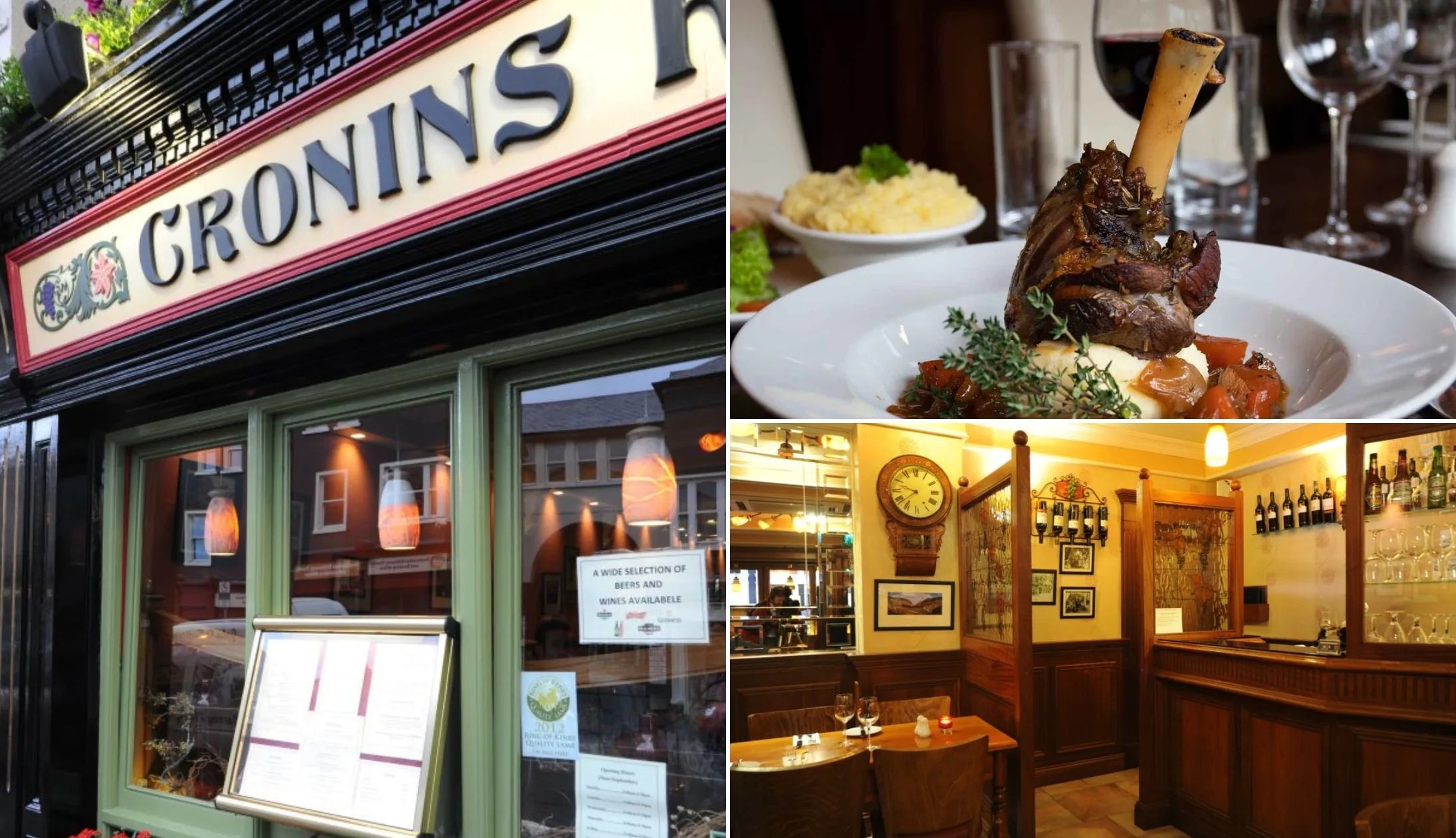
Photos via Cronin’s on FB
Once you arrive in Killarney, check into your hotel if it’s not too early, then head out for a well-deserved lunch.
Our top picks are JM Reidy’s (brunch, burgers, and tacos), Khao (Asian street food), and Cronin’s (classic Irish comfort food).
Stop 2: Killarney House and Gardens
Killarney House used to be a stable block of a French-style chateau built in the 1720s by Sir Valentine Brown. Sadly the original house was demolished in the late 1800s after the family changed their principal seat to a large red brick mansion in Knockreer.
The stable block of the original house remained intact and was remodelled into a residence between 1913 and 1915, and more recently restored.
From the house and gardens, there are lovely views of the surrounding mountains and inside there are modern exhibits about the house and national park.
Stop 3: Killarney National Park
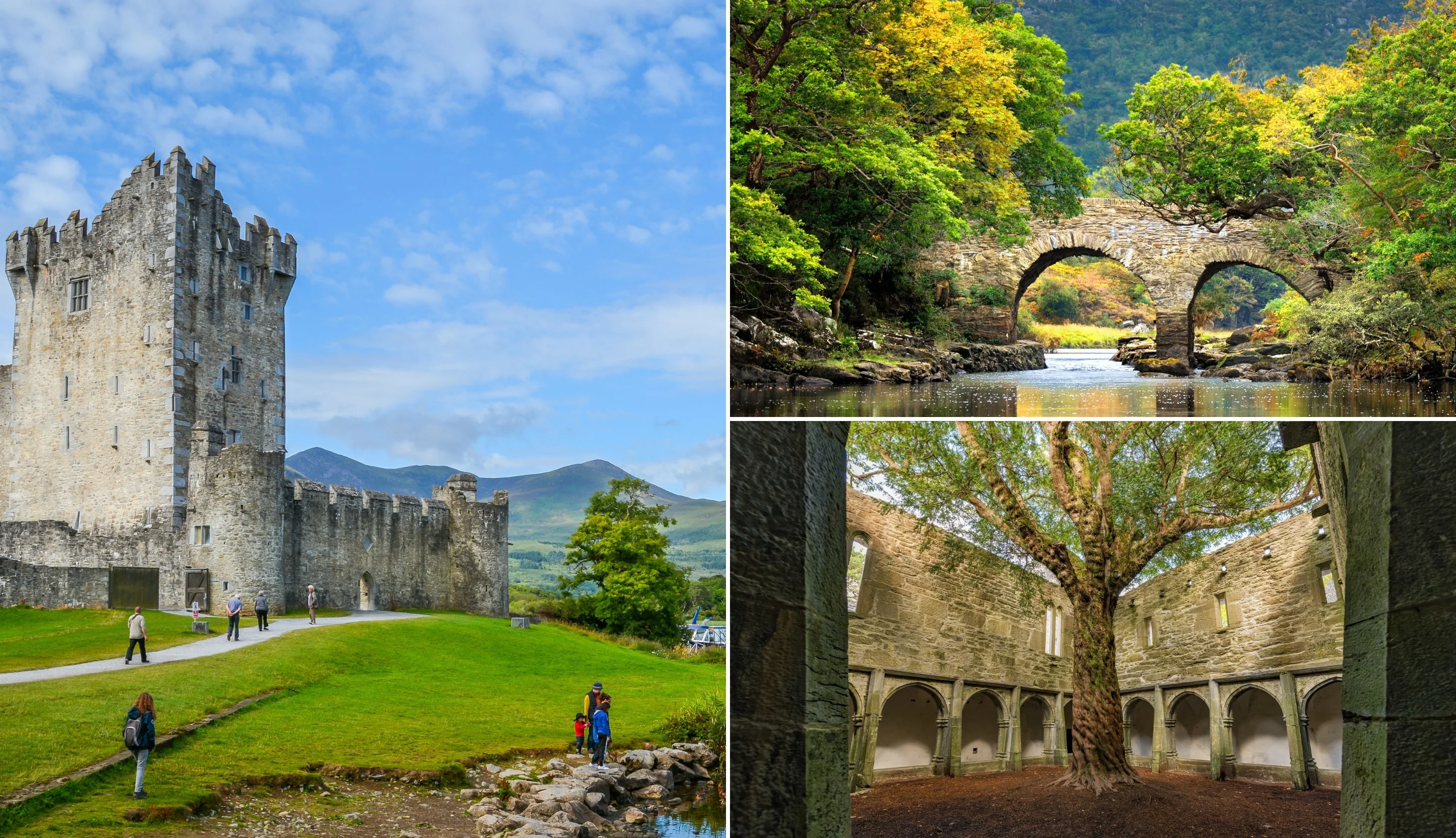
Photos via Shutterstock
Killarney is right next to the national park, so if you’ve got time and feel like a walk, why not head out of town on foot and take a stroll through the park?!
Or, if you’d like to explore it from the comfort of a Jaunty (horse and cart) you can book onto one online and head off on your merry way.
You’ll stumble upon the ancient Ross Castle, the gorgeous lakes of Killarney, Muckross House and Gardens and plenty more.
Stop 4: Killarney for the night
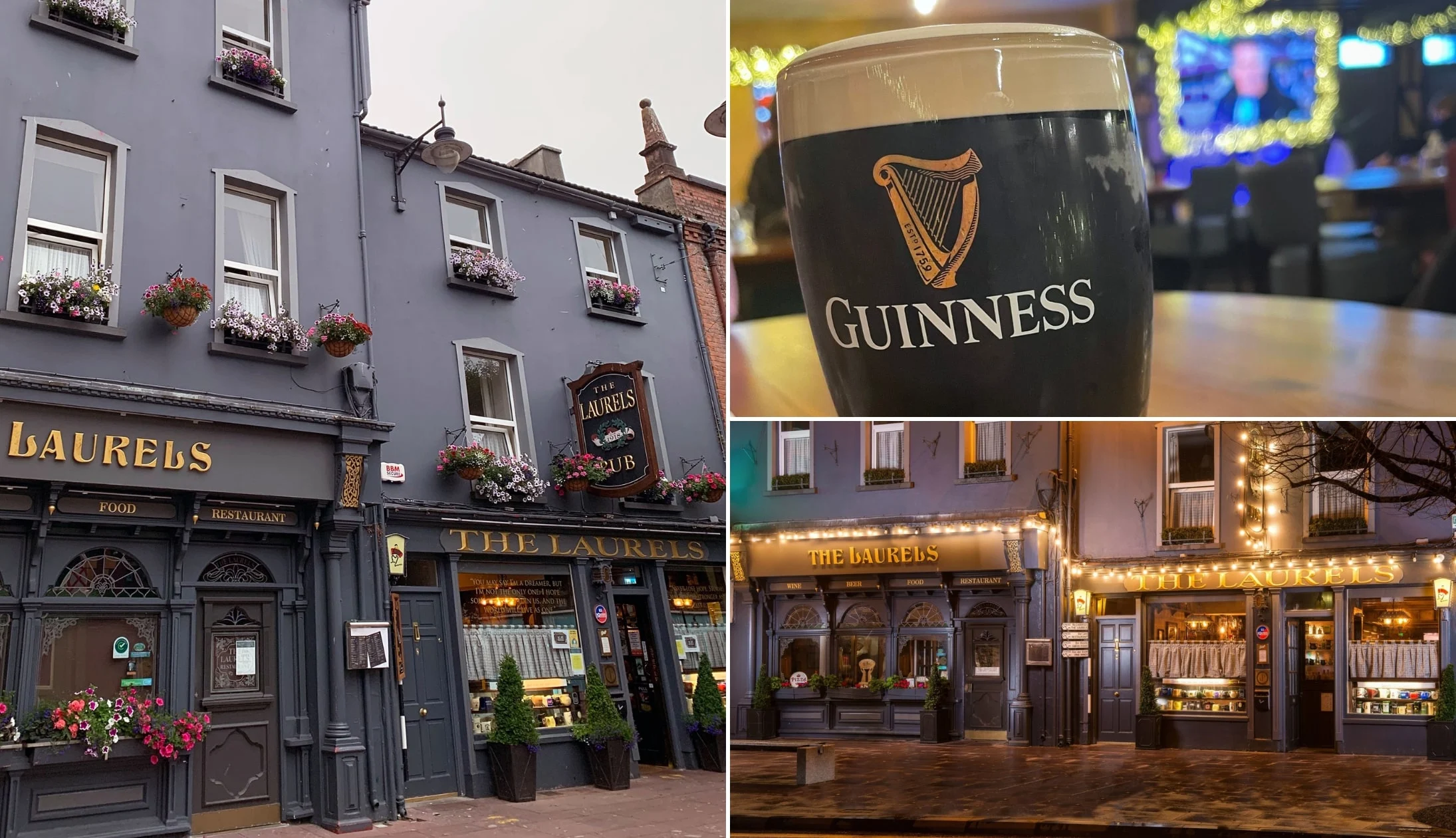
Photos via The Laurels on FB
Make your way back to the town the same way you came and then head to your accommodation to freshen up.
Killarney, like Galway, is a place that’s rarely too quiet, even during the off-season.
Our dinner recommendations
There are some exceptional restaurants in Killarney. Our favourites are the Mad Monk (they serve amazing seafood like sizzling crab claws and deep water prawn tagliatelle), Kitty O’Se (splash out on the Seafood Tower to share), and Murphy Browns (hearty Irish dishes like roasted duck and fish and chips).
Our pub recommendations
There’s some mighty old-school pubs in Killarney, too. For post-dinner drinks, head to JM Reidy’s, the Laurels Pub, or O’Connors.
They all have a traditional pub feel and are a great choice for a pint. JM Reidy’s has a lovely courtyard which is great in the summer, and O’Connors is perfect if you feel like cocktails.
If you want to hear some live music, JM Reidy’s and O’Connors often have live music sessions.
Day 8: The Ring of Kerry
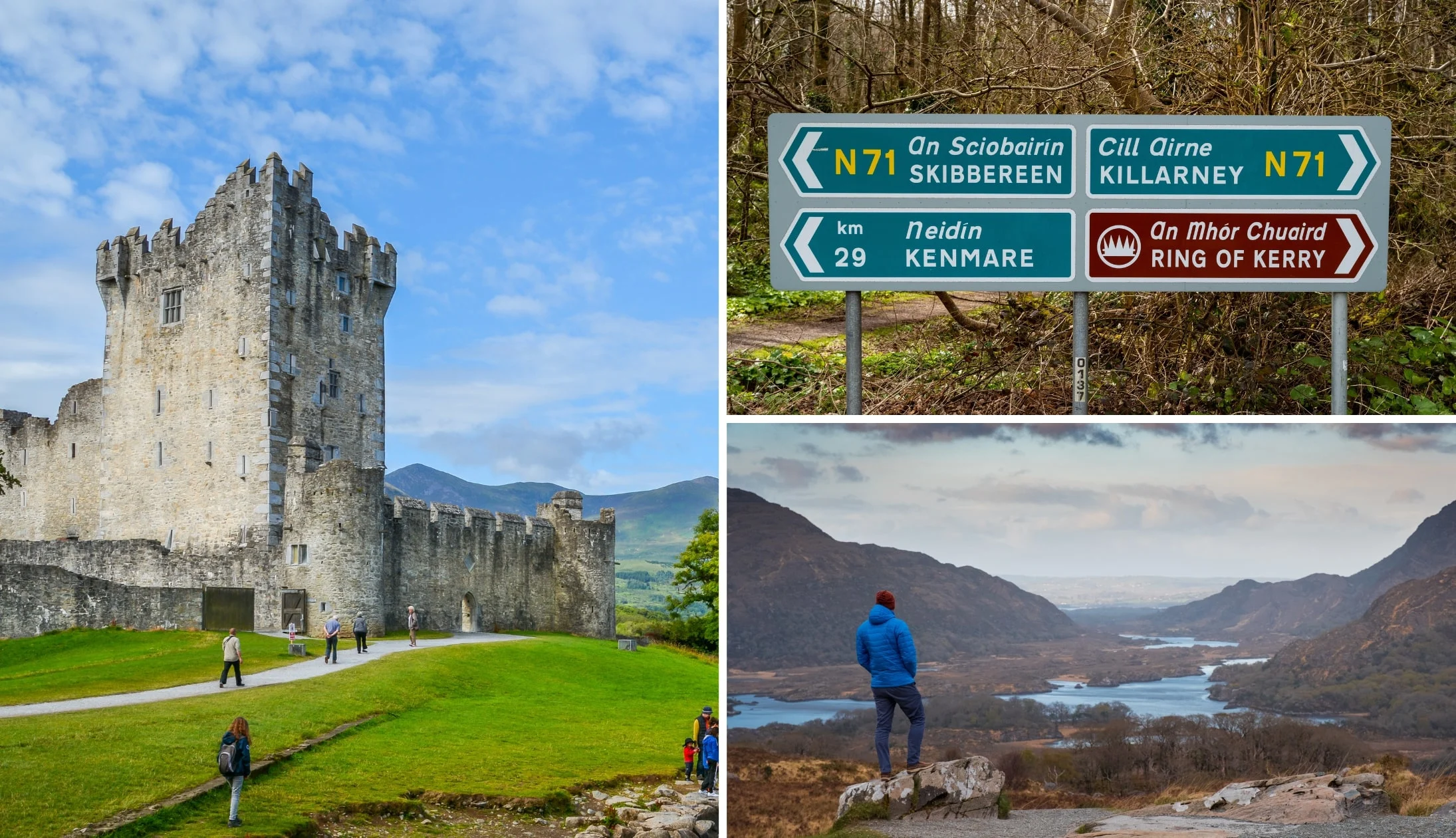
Photos via Shutterstock
It’s day 8 of your 12 days in Ireland, and today you’re heading off for an adventure on the stunning Ring of Kerry!
Be prepared for some amazing views and lovely beaches (if you’re visiting in the summer, you may want to bring swimming clothes and towels).
We’re going to recommend that you take this 7-hour Ring of Kerry day trip that’ll take you to all of the route’s highlights.
We’ll take you through the stops below, but note that 1, you may not always physically stop at all of these sights and 2, these tours are subject to change, so always check with the provider in advance.
Stop 1: Killorglin
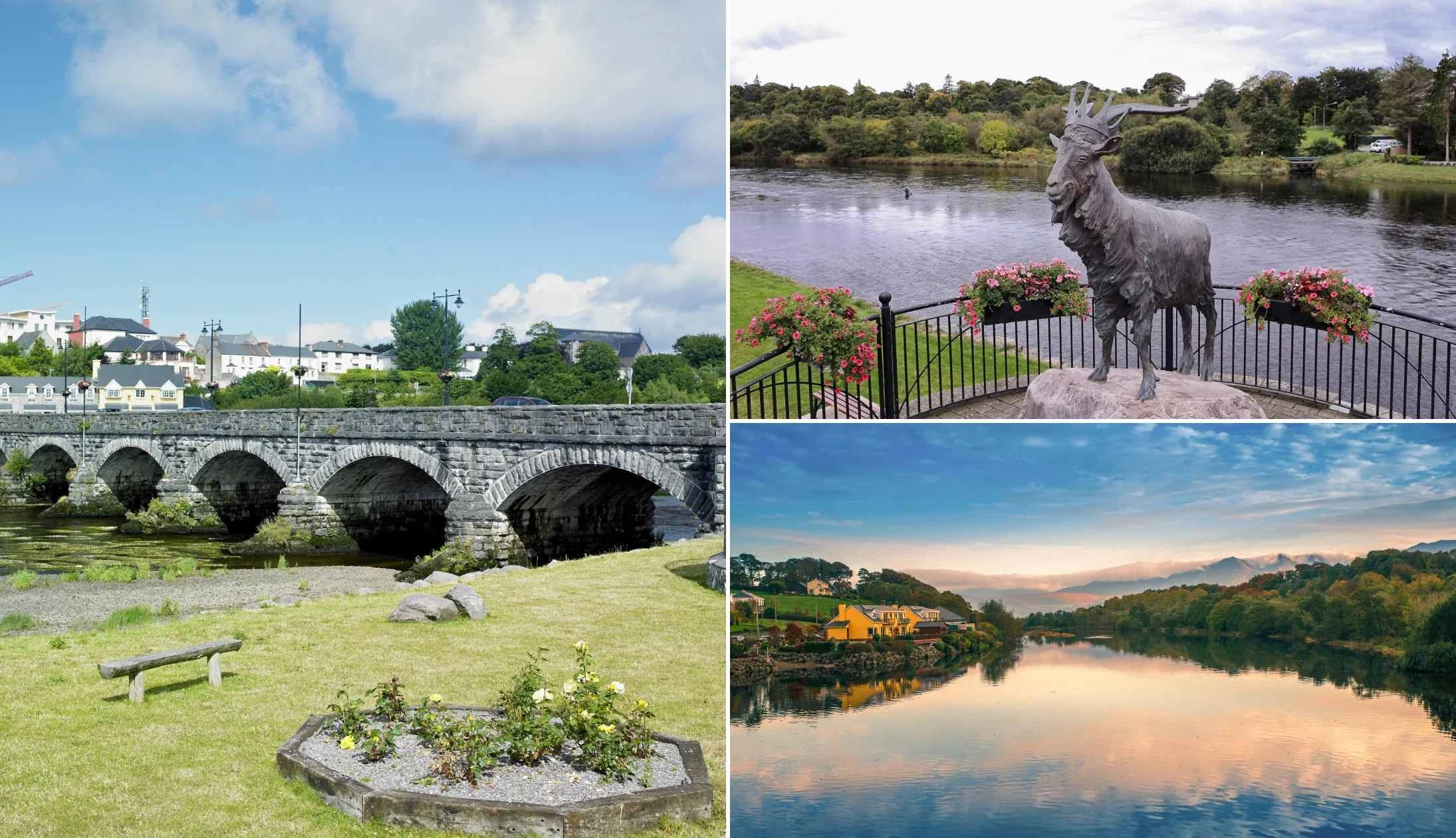
Photos via Shutterstock
Killorglin is a lovely little town on the Ring of Kerry. You’ll just be passing by, but keep an eye out of the window as it’s lovely.
The town is known for its annual Puck Fair, the country’s oldest street festival. It’s held every year in August, and following tradition, the fair starts with crowning the “king” goat
Stop 2: Dingle Bay and Inch Beach
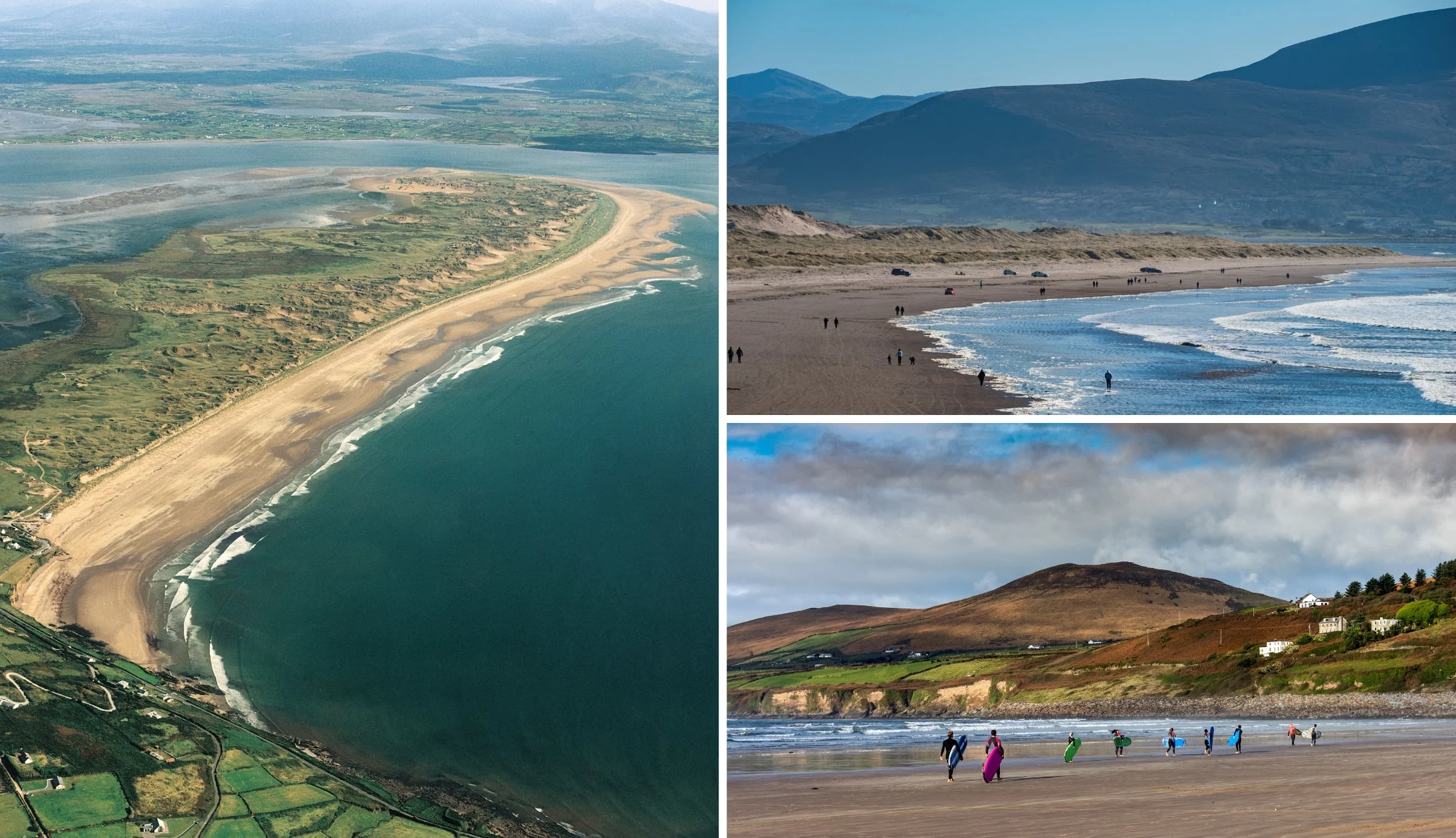
Photos via Shutterstock
As you pass through Killorglin, you’ll be driving alongside Dingle Bay and passing by Inch Beach, a long spit that juts out across the bay from the other side of the water.
Inch is one of Kerry’s most popular surf spots and you should be able to see surfers attempting to tame the waves here from afar.
Stop 3: Skellig views
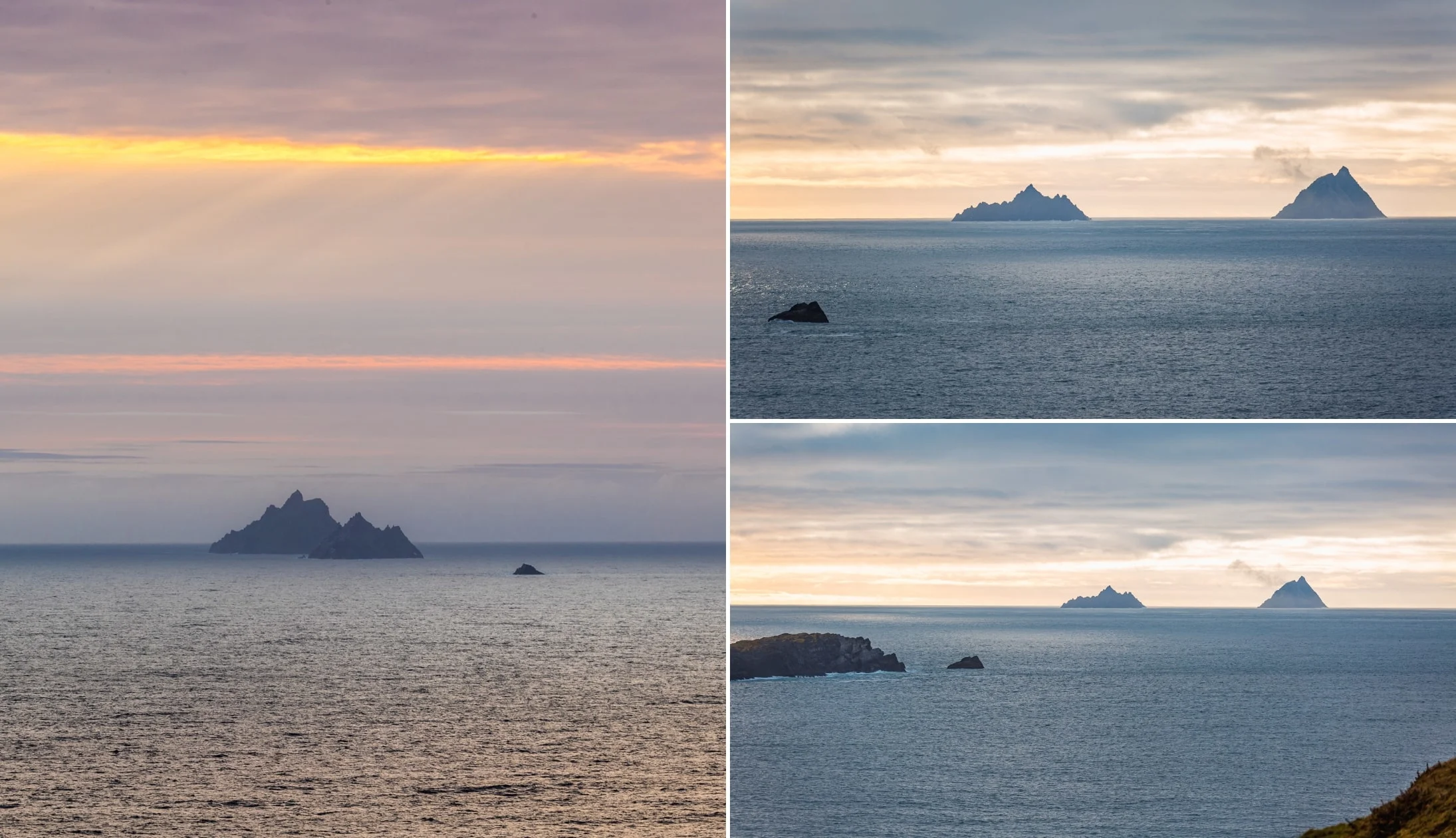
Photos via Shutterstock
As you make your way to Waterville, you’ll be passing by Ballinskelligs Bay, where on clear days, you’ll be able to spot the Skellig Islands off in the distance.
There are two islands – Skellig Michael and Little Skellig. The former shot to fame in recent years when scenes from a Star Wars movie were filmed on the island.
Stop 4: Waterville
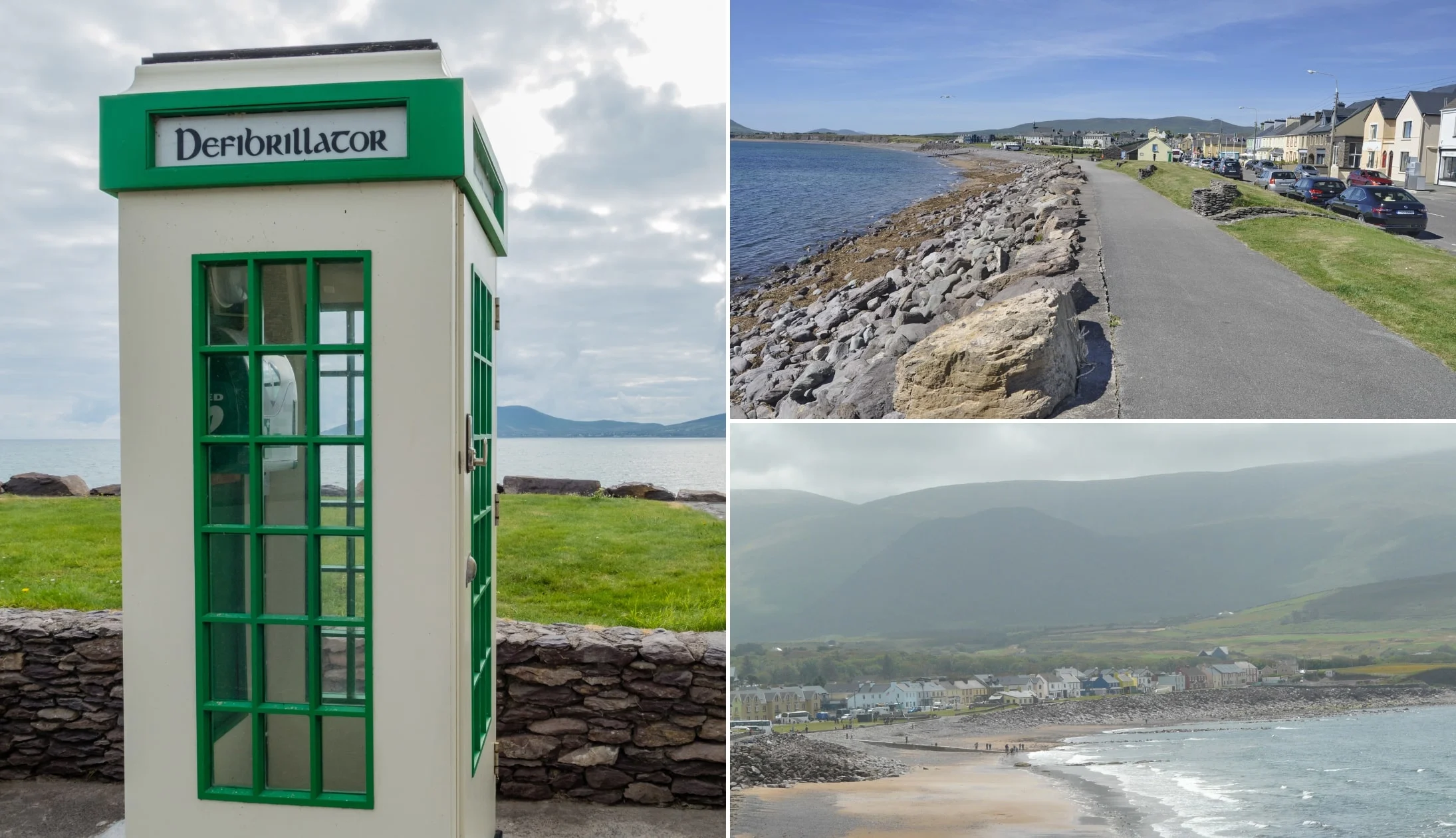
Photos via Shutterstock
Keep an eye out of the window as you pass through Waterville and discover why it was Charlie Chaplin’s favourite village in Ireland.
Chaplin first visited the village in 1959 after a recommendation from his friend Walt Disney!
Stop 5: Sneem
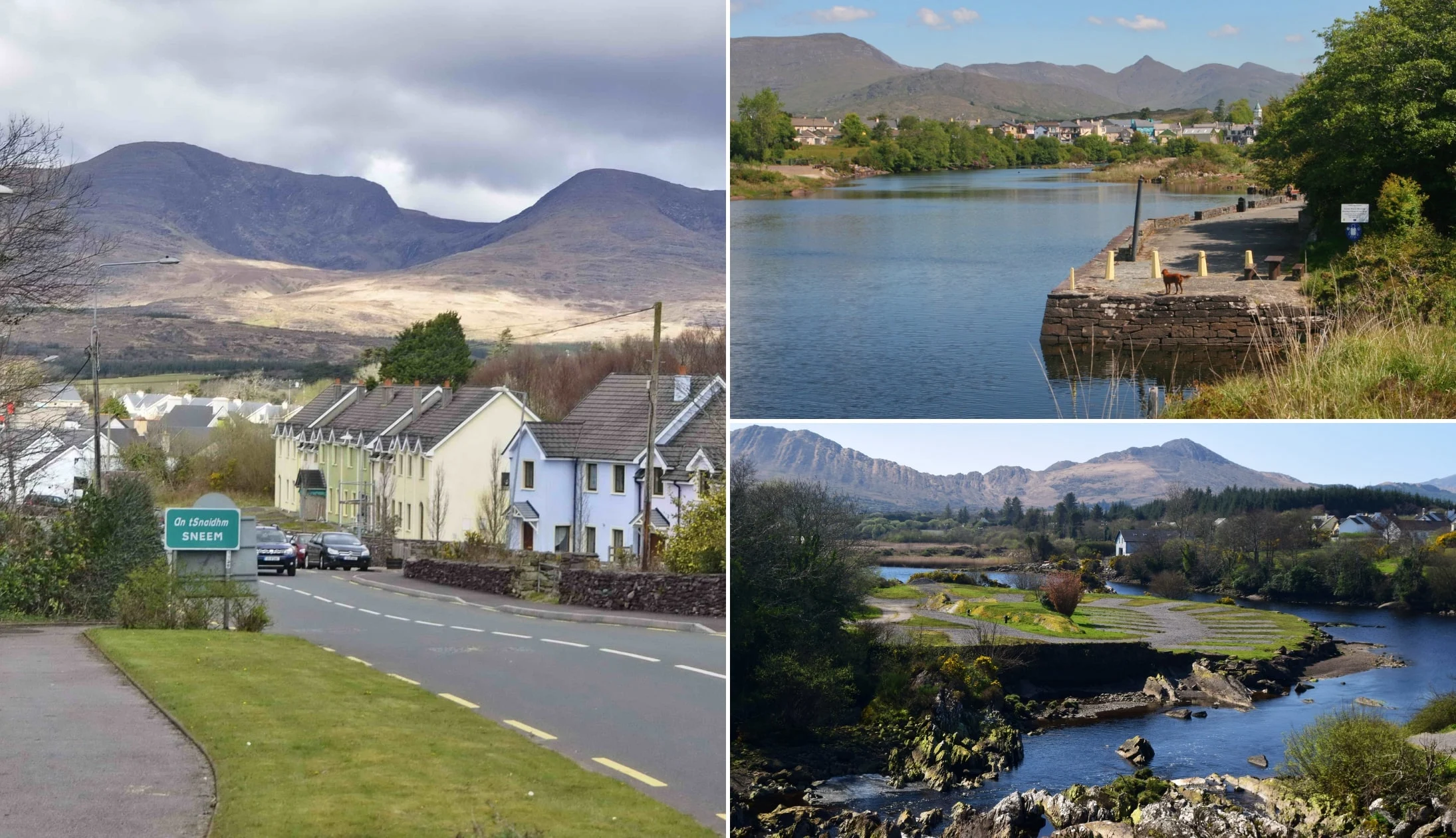
Photos via Shutterstock
You’ll be making a stop in Sneem, a colourful little village on the Sneem Estuary. The river flows right through the middle of the village and there’s a lovely stone bridge connecting both sides.
The bridge dates back to 1810, with five arches and a staircase down to the water.
Stop 6: Kenmare Bay
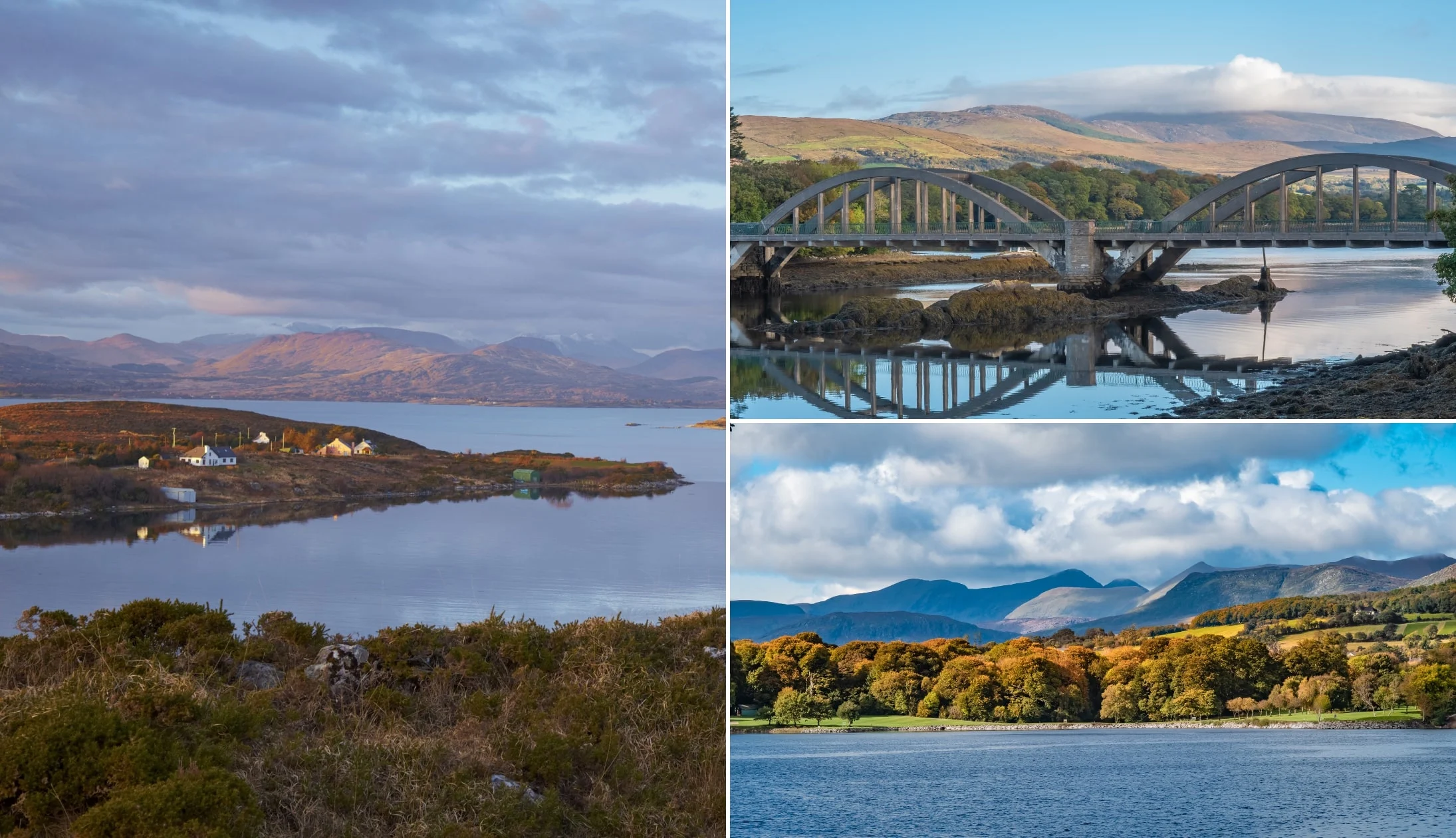
Photos via Shutterstock
As you drive out of Sneem on the Ring of Kerry road, you’ll be passing alongside Kenmare Bay, a long narrow bay that borders County Kerry and Cork.
This stretch of road hugs the coast and, while much of it is engulfed by tall trees, offers gorgeous views at times.
Stop 7: Moll’s Gap
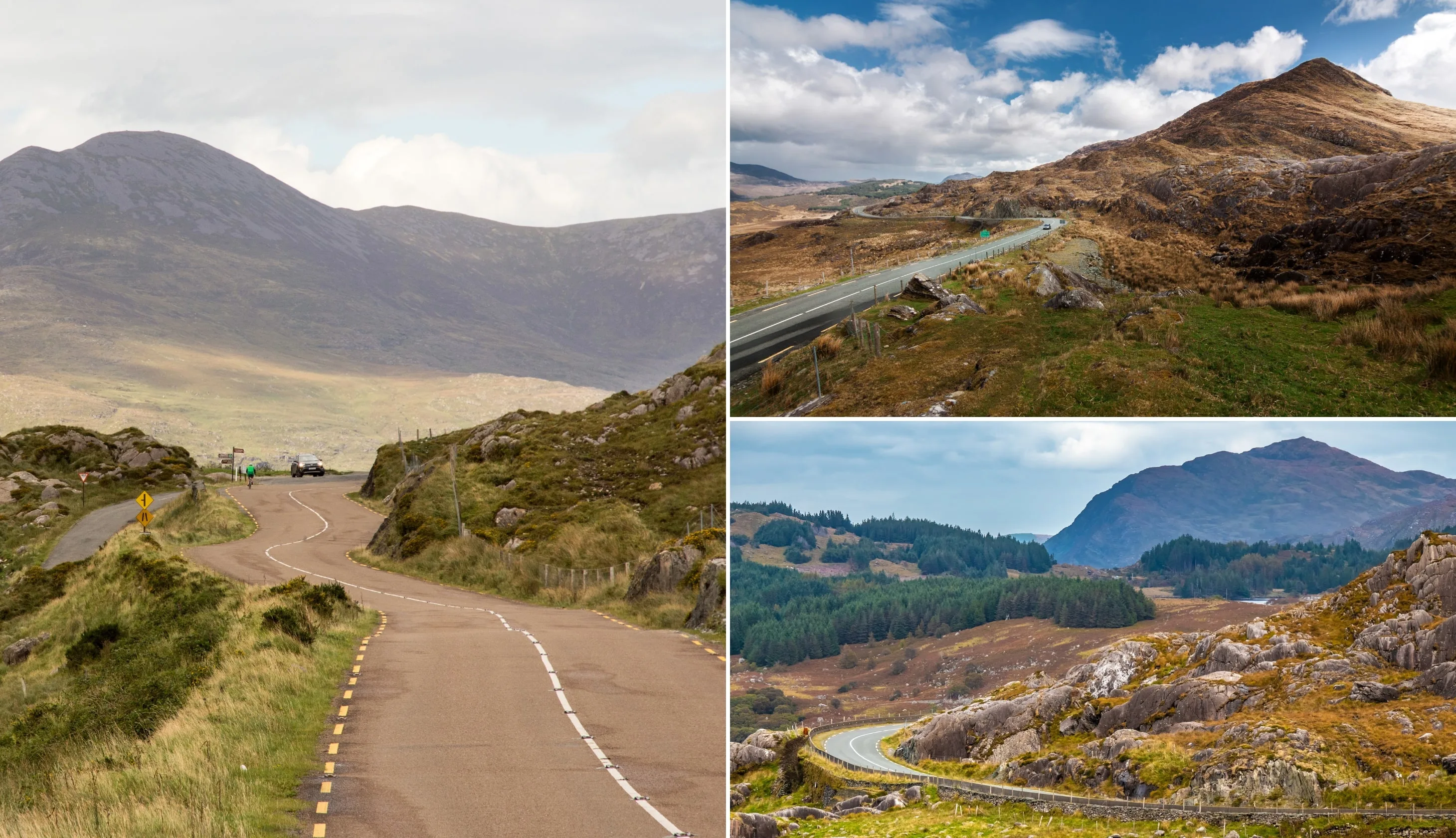
Photos via Shutterstock
Moll’s Gap is also known as Céim an Daimh in Irish or ‘Gap of the Ox’, but it gets its nickname after Moll Kissane, owner of a local shebeen (unlicensed pub).
The pub was established in the 1820s when the road was being built, and Moll’s homemade poitin (a strong liquor sometimes made from potatoes) was a favourite with the construction workers!
Stop 8: Ladies View
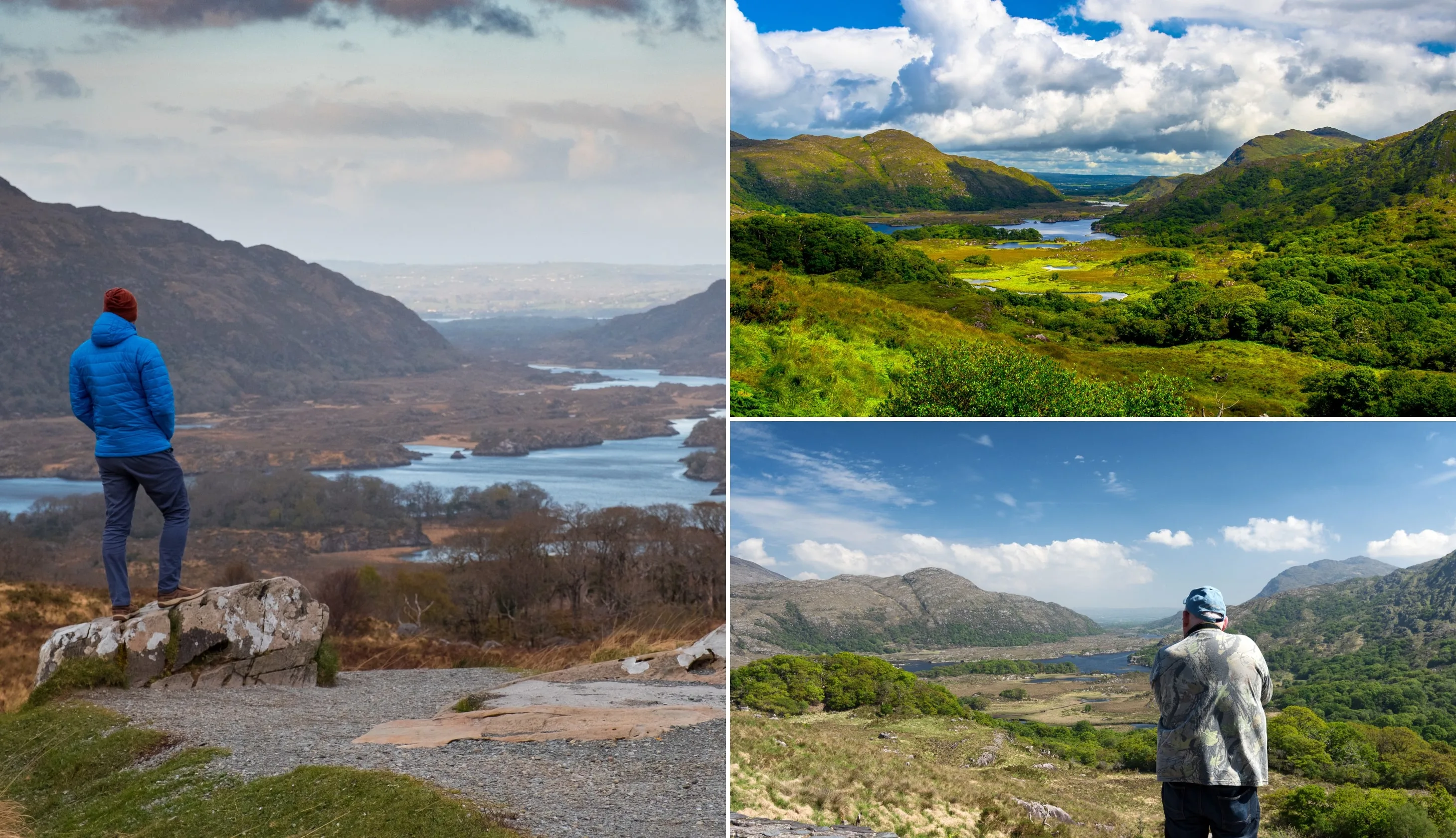
Photos via Shutterstock
Ladies View is one of the most popular stops on the Ring of Kerry, with roadside parking directly facing the view.
The viewpoint was named in honour of Queen Victoria’s ladies-in-waiting who were in awe when they visited in 1861 during a royal visit.
The view looks out over the Upper Lake with mountains rising up on either side. From Molls Gap and Ladies View, you’ll have views over the Black Valley, an isolated valley which was the last place in Ireland to get electricity!
From the previous viewpoint, try to spot the wonderful lakes of Killarney. There are three lakes in total: Lough Leane, Middle Lake (also called Muckross Lake), and Upper Lake.
Ladies View has fantastic vistas of the Upper Lake.
Stop 9: Torc Waterfall
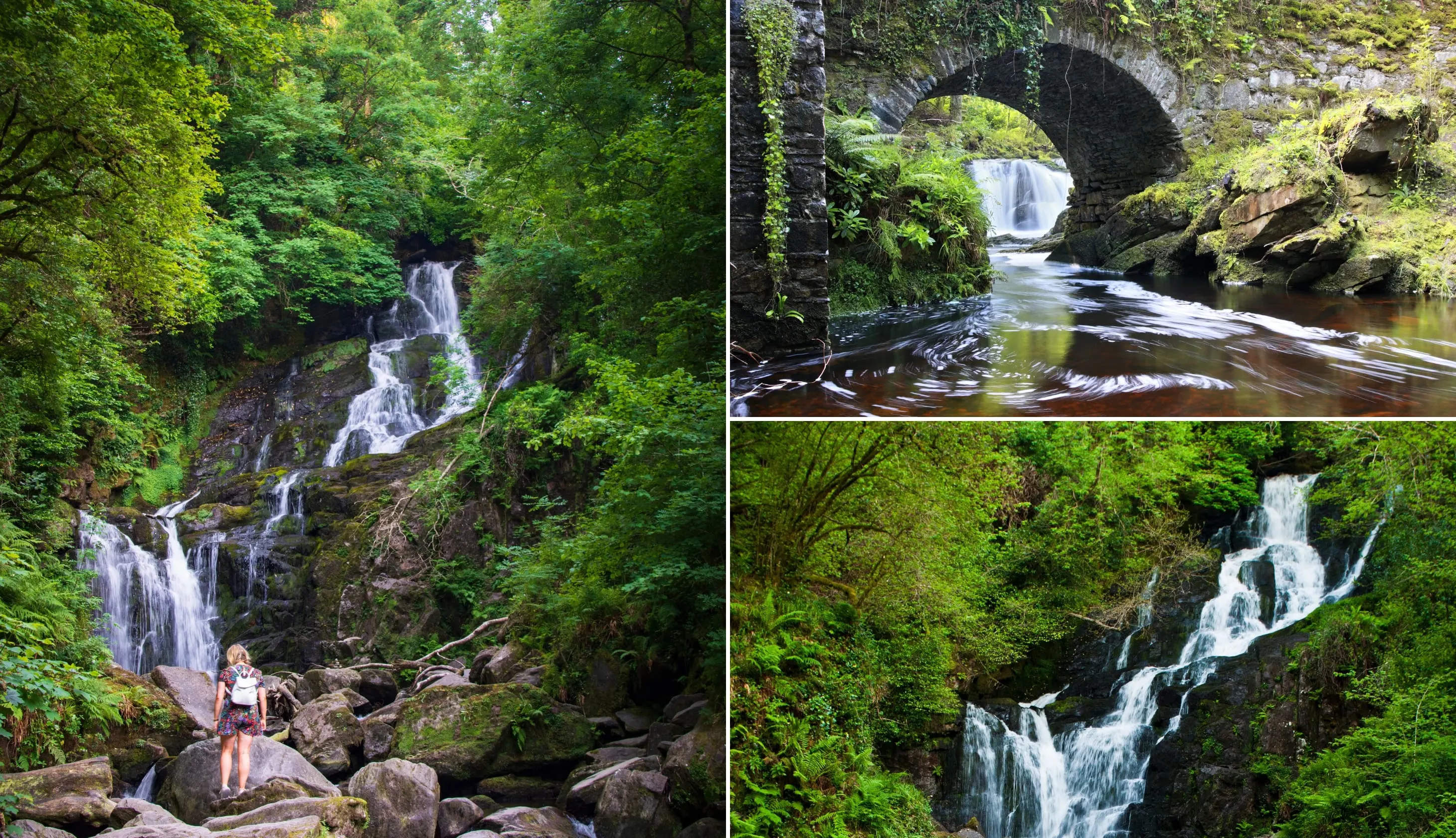
Photos via Shutterstock
According to local folklore, Torc Waterfall was home to a man who was cursed by the devil to turn into a boar each night.
When his secret was revealed by a farmer, the man burst into flames and retreated to the Devil’s Punchbowl.
The waterfall is breathtaking, tumbling for around 20 metres down rocks and boulders.
Stop 10: Back to Killarney for the night

Photos via The Laurels on FB
After the waterfall, the tour makes its way back to Killarney.
Check out our recommendations from yesterday for where to eat, drink, and listen to trad music.
Day 9: The Dingle Peninsula
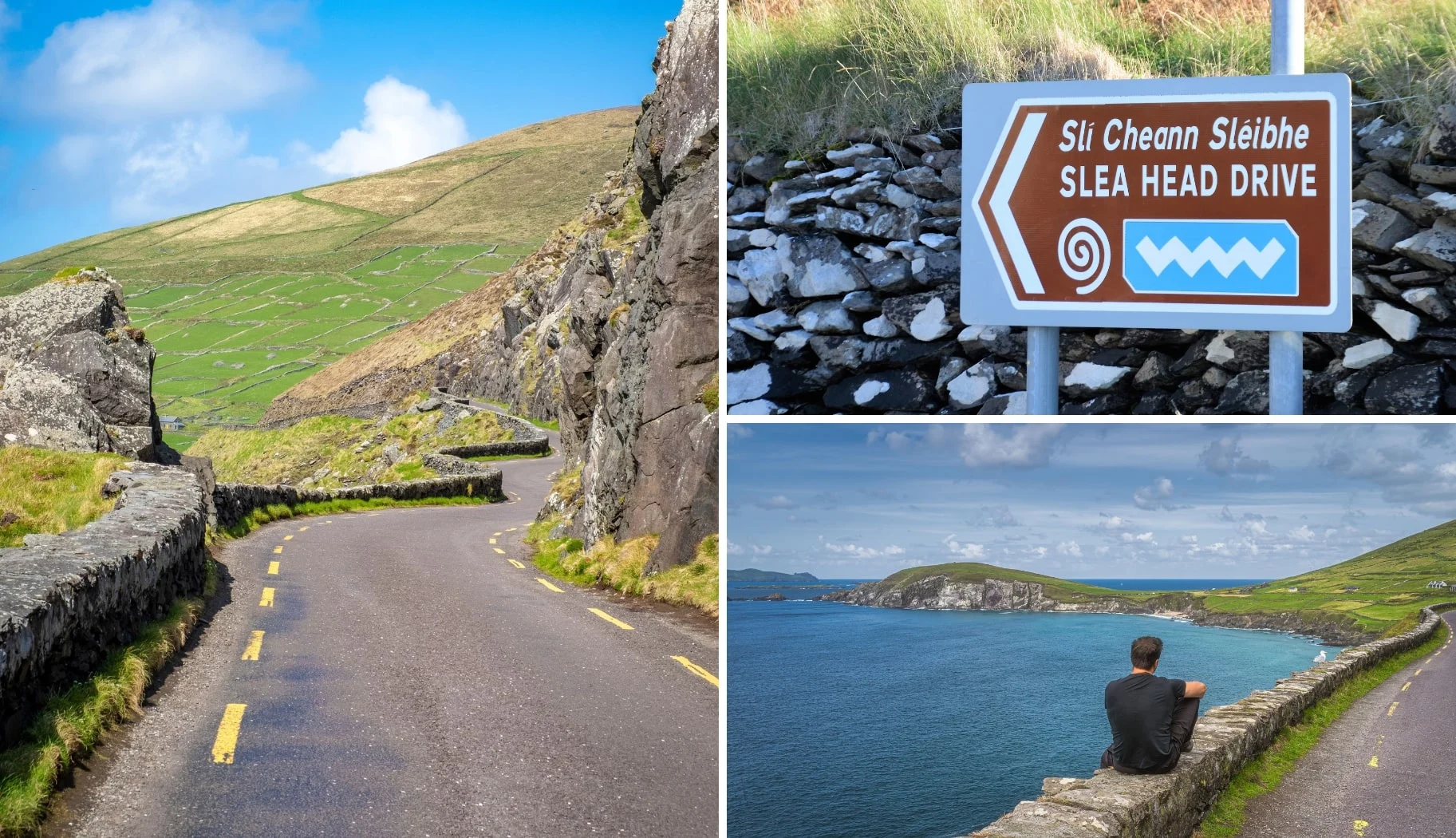
Photos via Shutterstock
You’re nearing the end of your 12 days in Ireland itinerary, so get ready for an action-packed tour to the marvellous Dingle Peninsula.
The peninsula is on the country’s southwest coast, with rugged coastline, lovely beaches, and rolling green hills.
If you book onto this 6.5-hour guided tour, you’ll be taken to the peninsula’s main attractions, including Slea Head and Dingle Town.
Start with a nice breakfast in Killarney before heading on the tour. We’d recommend getting something to eat where you’re staying, or heading to JM Reidy’s or the Shire Bar, which both do a great breakfast.
We’ll take you through the stops below, but note that 1, you may not always physically stop at all of these sights and 2, these tours are subject to change, so always check with the provider in advance.
Stop 1: Dingle Town
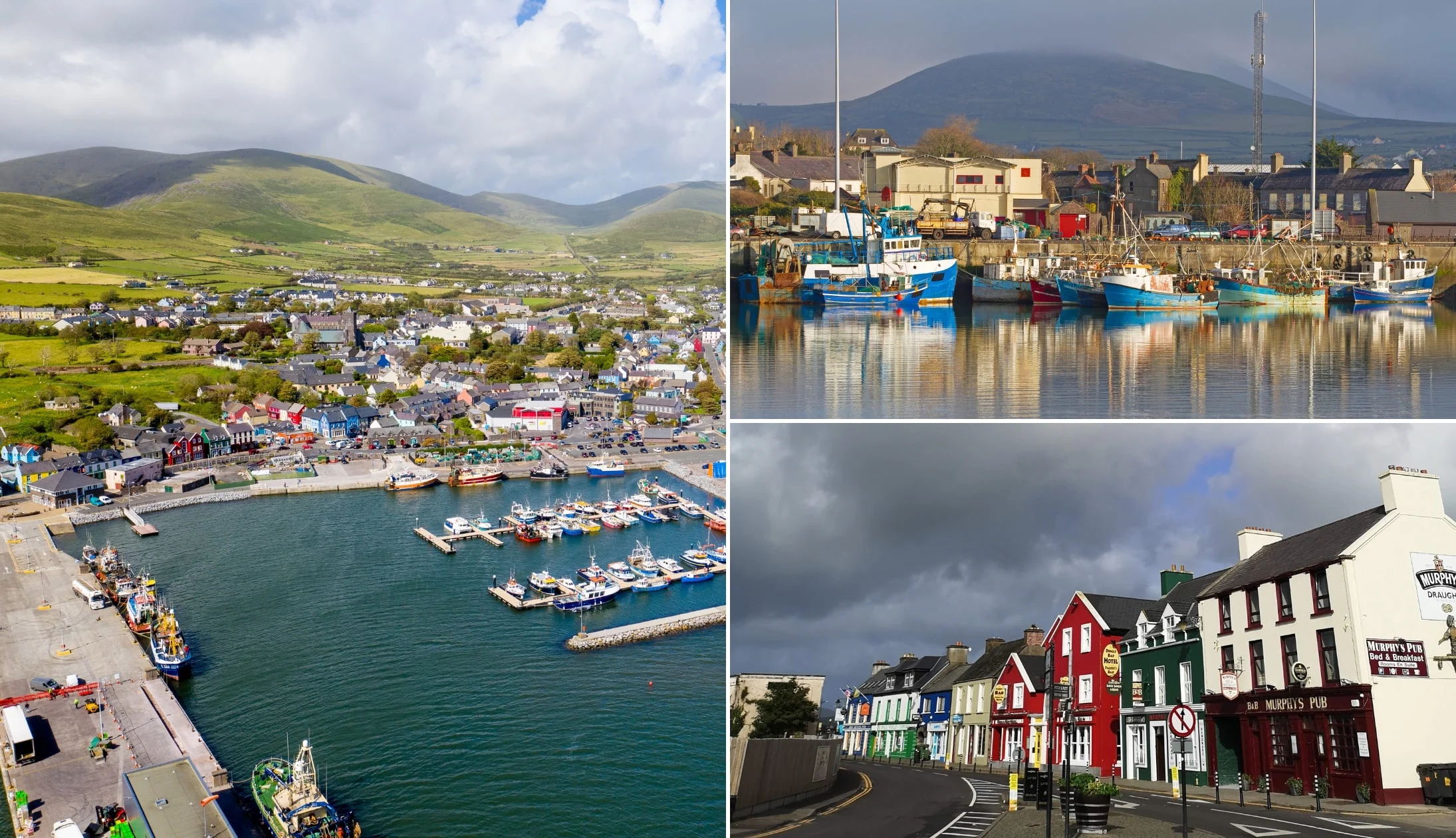
Photos via Shutterstock
Dingle Town is arguably one of the most popular towns in Ireland. It’s a colourful place on the shores of the Atlantic with a small harbour, lots of rural Irish charm, and great pubs!
Following the Norman invasion of Ireland, Dingle Town became a port, and by the 13th century, it was hugely busy, exporting more goods than Limerick. Today, its main economic activities are tourism, fishing, and agriculture.
Historically, Dingle Town has had strong ties with Spain, thanks to the Treaty of Dingle (1529), signed by the 11th Earl of Desmond and the ambassador of Emperor Charles V.
The treaty gave Irish citizens rights in Habsburg-controlled territories (Spain, the Netherlands, and Austria).
Stop 2: Slea Head

Photos via Shutterstock
Slea Head is a picturesque peninsula and one of the most westerly points in Europe. The views here are stunning, and you’ll be able to look out to Blasket Island across the Atlantic.
Take some time to admire the views and look out for the iconic White Cross on the side of the road.
Stop 3: Blasket Islands views
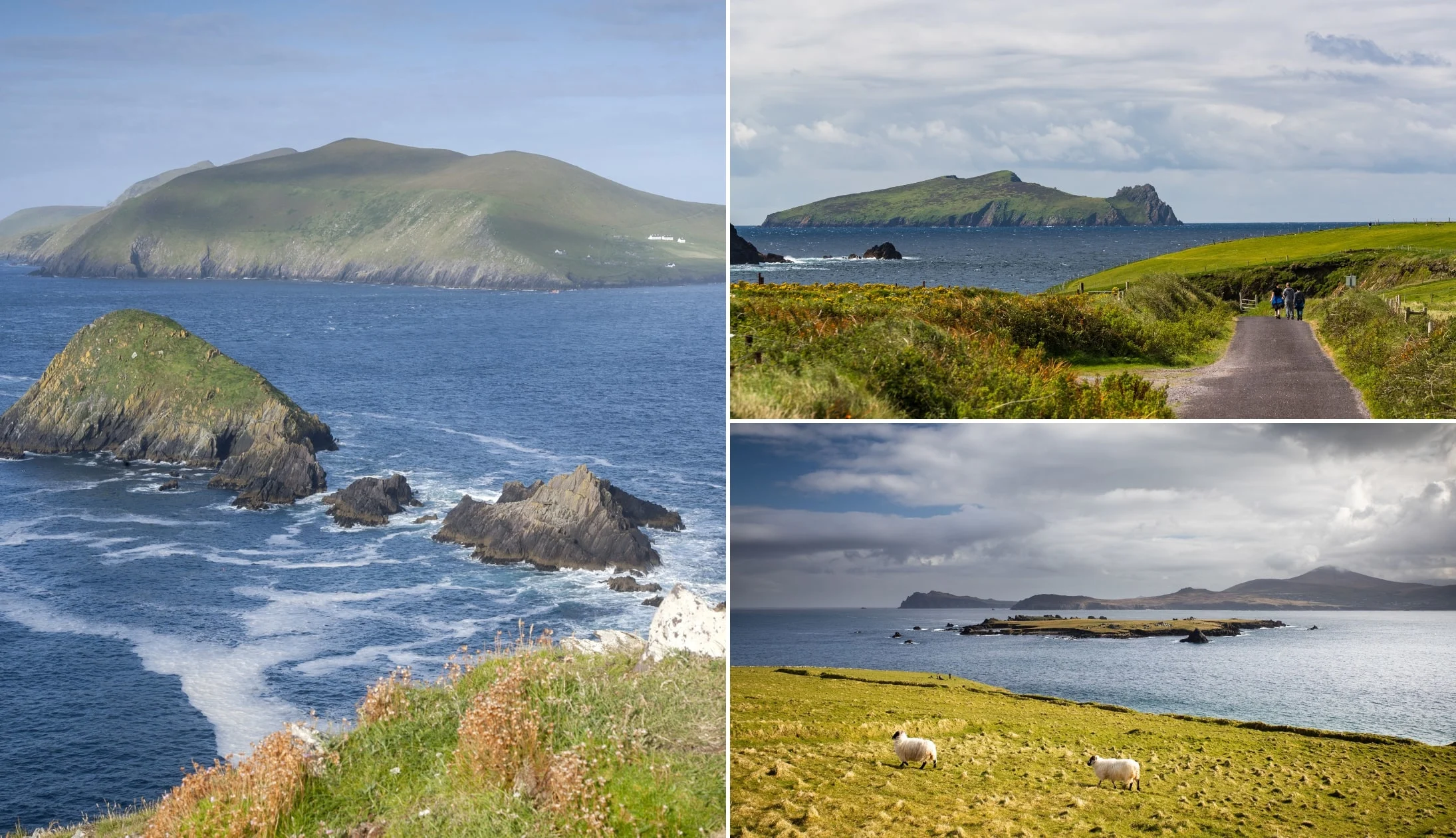
Photos via Shutterstock
Although you won’t actually be visiting the Blasket Islands, you will have some great views from Slea Head so it’s worth knowing a little about them!
The Blasket Islands were the last islands in the country that had a significant Irish population. Sadly, due to dwindling numbers, they were abandoned in 1954.
During the 19th and 20th centuries, many writers visited the islands to document the islander’s traditional way of life, and there are several books about them.
All in all, there are six islands, the largest being Great Blasket Island and the smallest, Beginish.
Stop 4: Gallarus Oratory
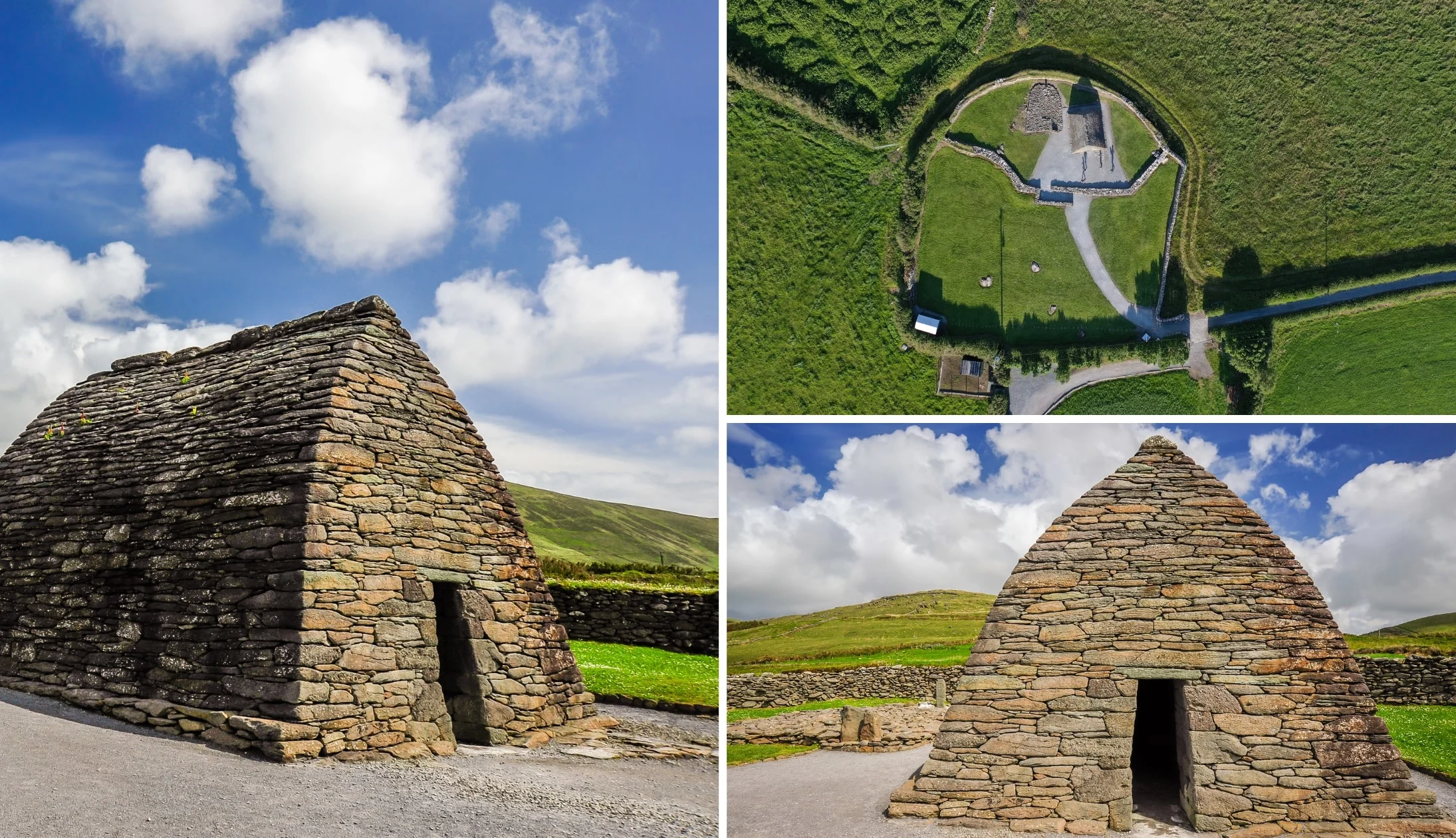
Photos via Shutterstock
Gallarus dates back to the 7th and 8th centuries. The stone church is an interesting shape, with the stones laid out at an angle to allow water to run off easily.
According to legend, if you climb out of the building through the window, your soul will get cleansed. The only drawback is that the window is absolutely tiny – 18cm long and 12cm wide!
You can park at the visitor centre and pay a small fee for the audio-visual display and to learn more about the site.
Stop 5: Back to Killarney for the night

Photos via Shutterstock
From Gallarus, it’s around a 1-hour-and-20-minute drive back to Killarney.
Check out our recommendations above for the best places to eat, drink, and hear music. Or, if those didn’t take your fancy, head to Bricín Restaurant and Boxty House.
It’s a wonderful spot for authentic Irish cooking with a cosy atmosphere and delicious Irish potato pancakes (the house speciality and a must-try!).
Day 10: Cork
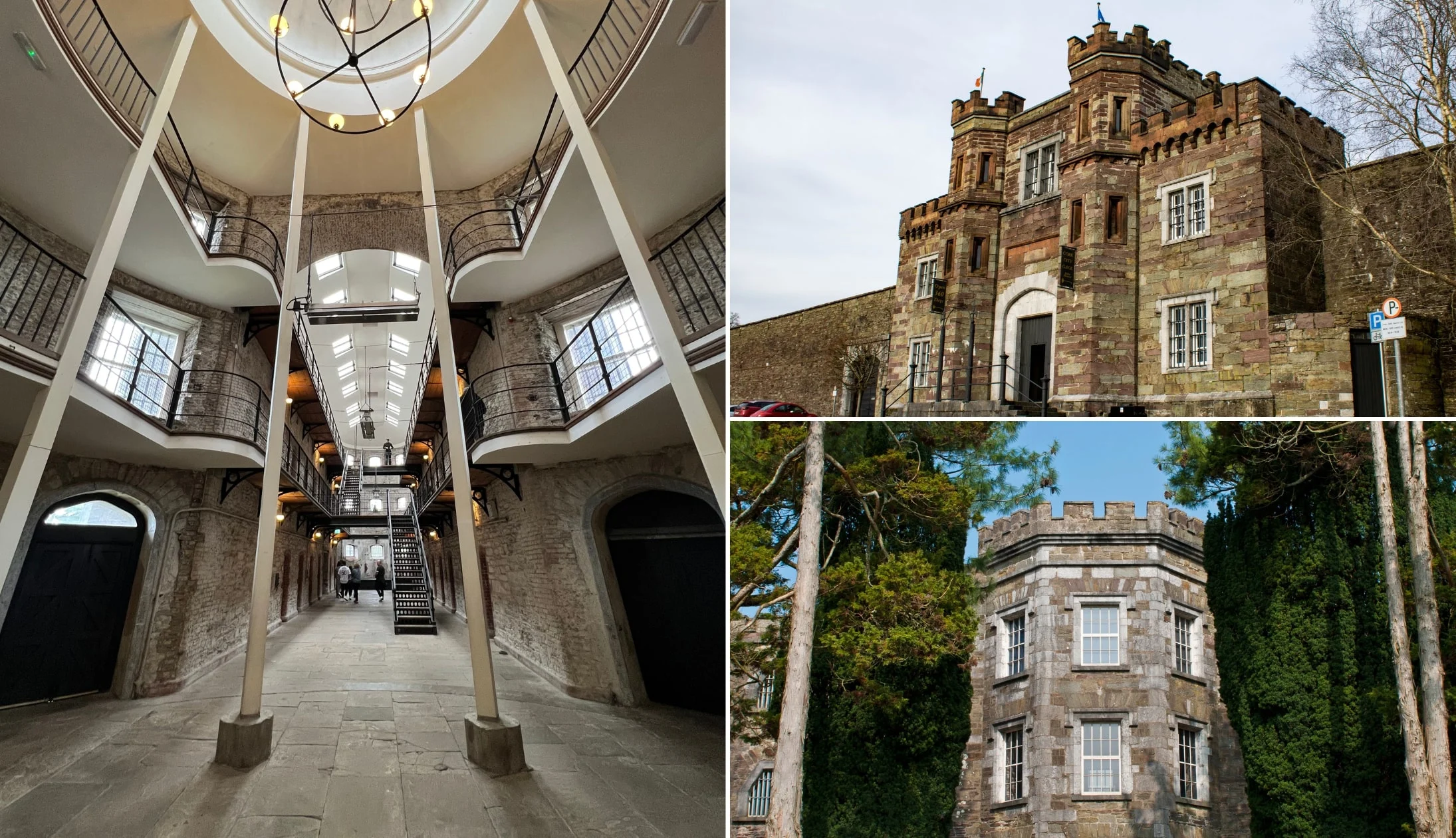
Photo left: The Irish Road Trip. Others: Shutterstock
Day 10 of your 12 days in Ireland itinerary takes you across to Cork City via either bus or train.
If you take the train, you may need to swap trains at some point, whereas if you take the bus, it’s direct. Here’s what you need to know:
Option 1: The Train
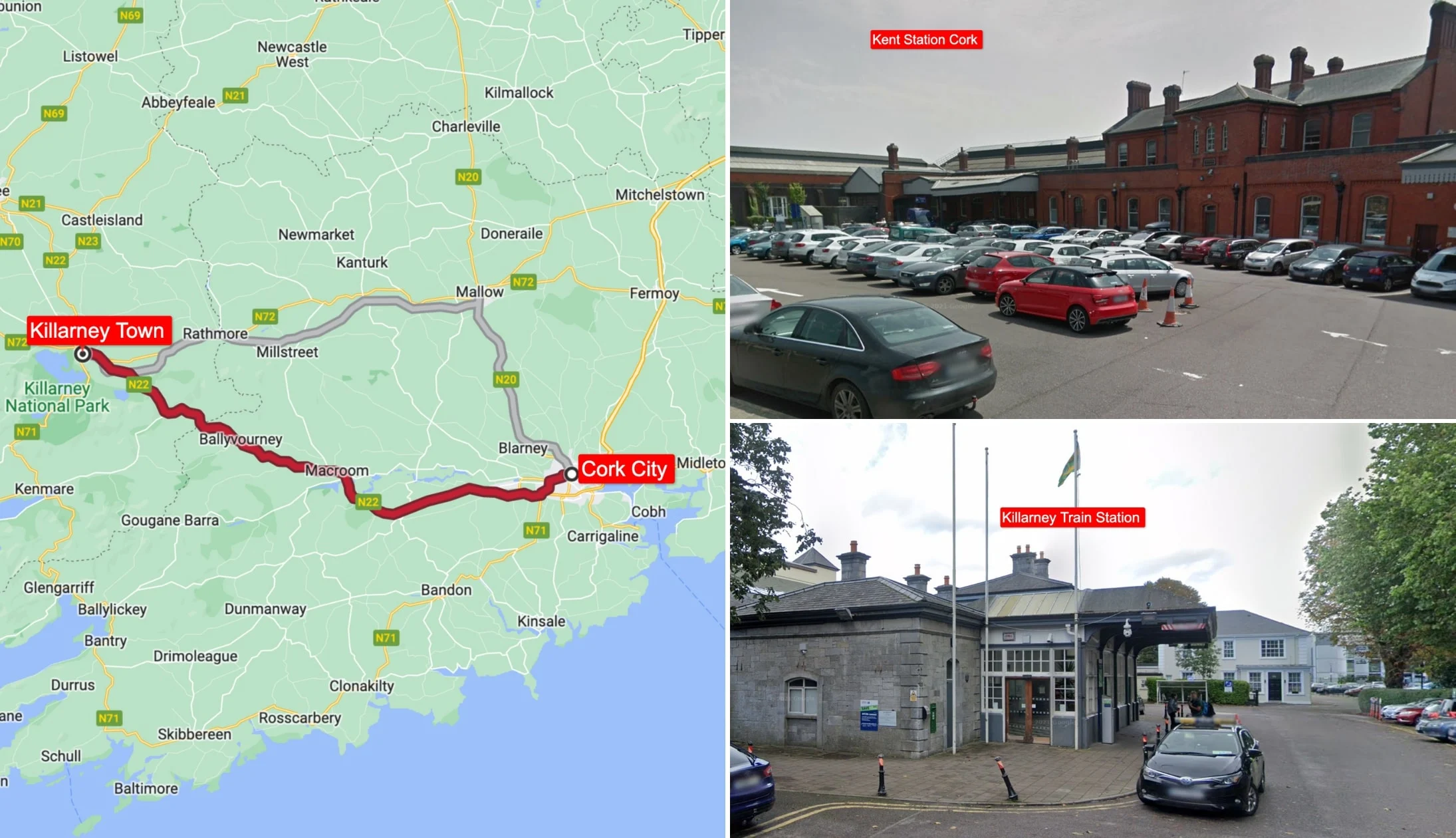
Photos via Google Maps
The handiest way to get from Killarney to Cork City is via the train. There’s a direct train that takes just under 1.5 hours (find more info on the Irish Rail website).
Please do note, however, that some trains from Killarney to Cork require you to switch, so make sure to check the journey details when you book online.
Option 2: The Bus
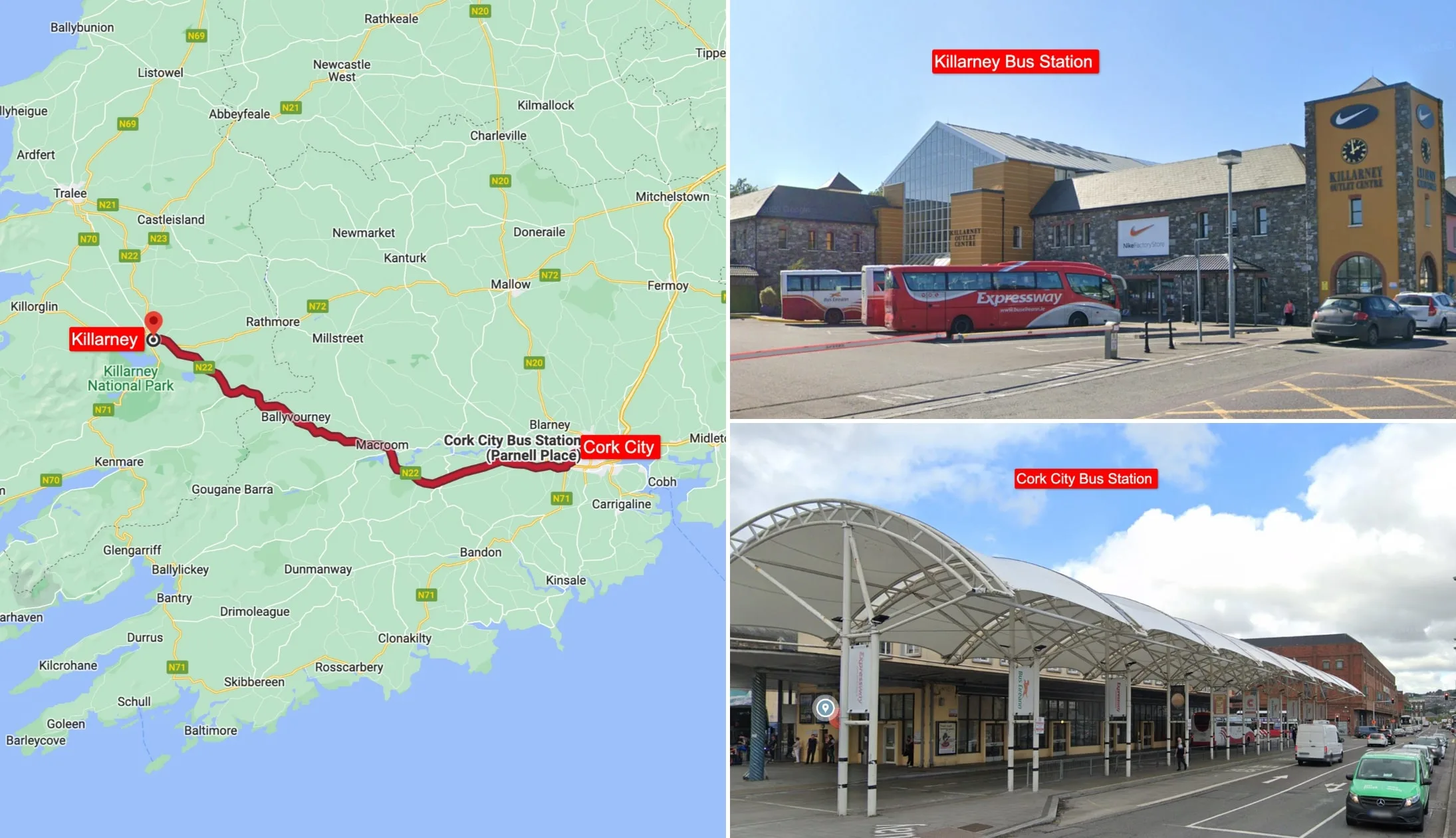
Photos via Google Maps
The bus from Killarney to Cork is fairly handy as well. You need to take the Expressway service that leaves from Killarney Bus Station.
It takes just under 2 hours and drops you at Cork’s Parnell Place station.
Recommended accommodation in Cork City
- Budget: Sheilas Tourist Hostel (no-fuss hostel near the train station) + Redclyffe Guesthouse (nice and central with great reviews)
- Mid-range: The Metropole (central with superb reviews) and Hotel Isaacs (in the Victorian Quarter – top-notch rooms and reviews)
- Luxury: Imperial Hotel (stunning and very central hotel) and Hayfield Manor (beautiful, boutique, city centre 5-star)
Stop 1: Cork City
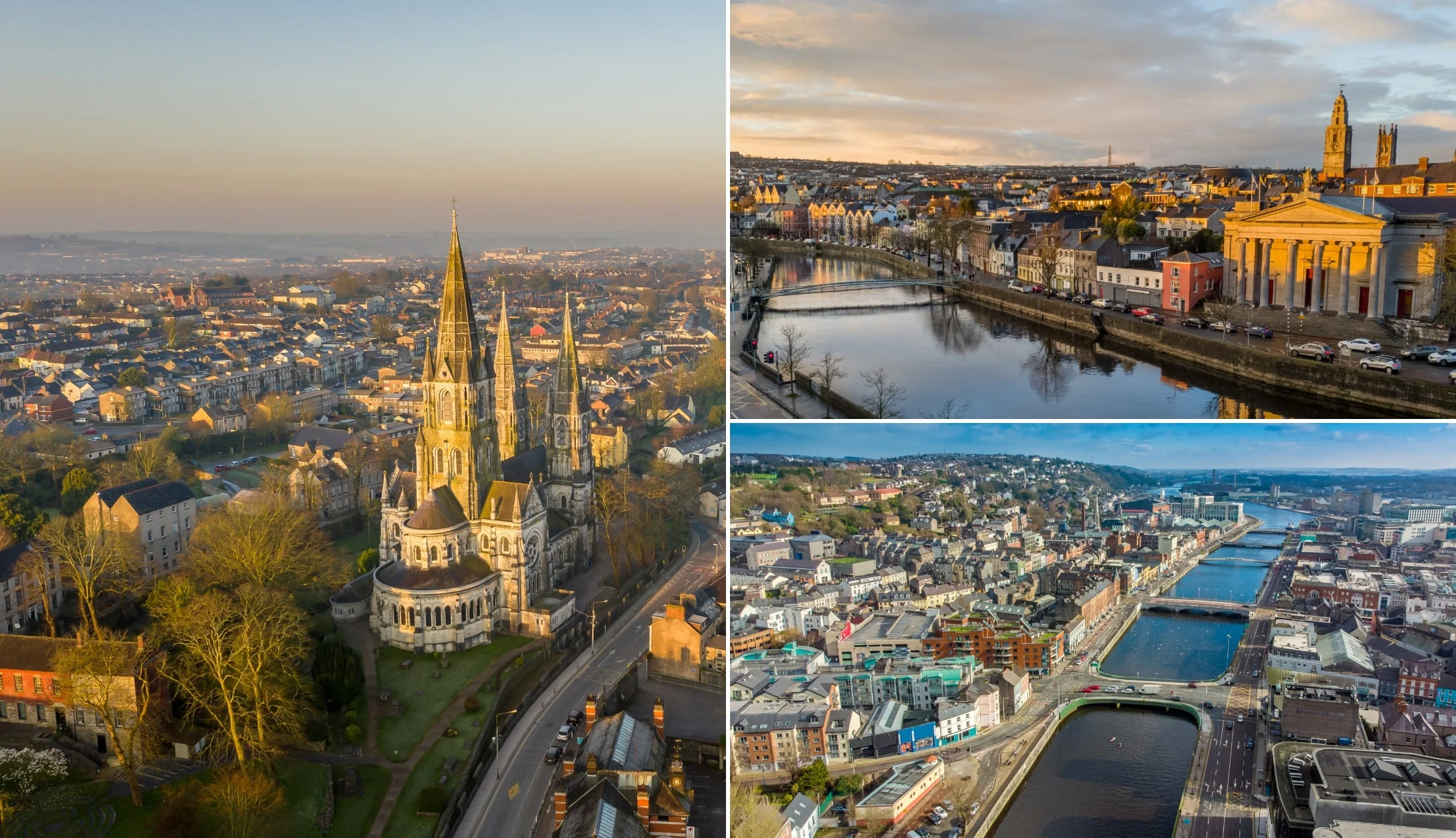
Photos via Shutterstock
Once you’ve arrived in Cork, head off to your hotel to drop off your things and freshen up (if you’ve been able to check in early).
Then, get ready to explore the city on foot! Cork City is pretty walkable once you have a good route laid out, like the one below.
Stop 2: Shandon Bell Tower
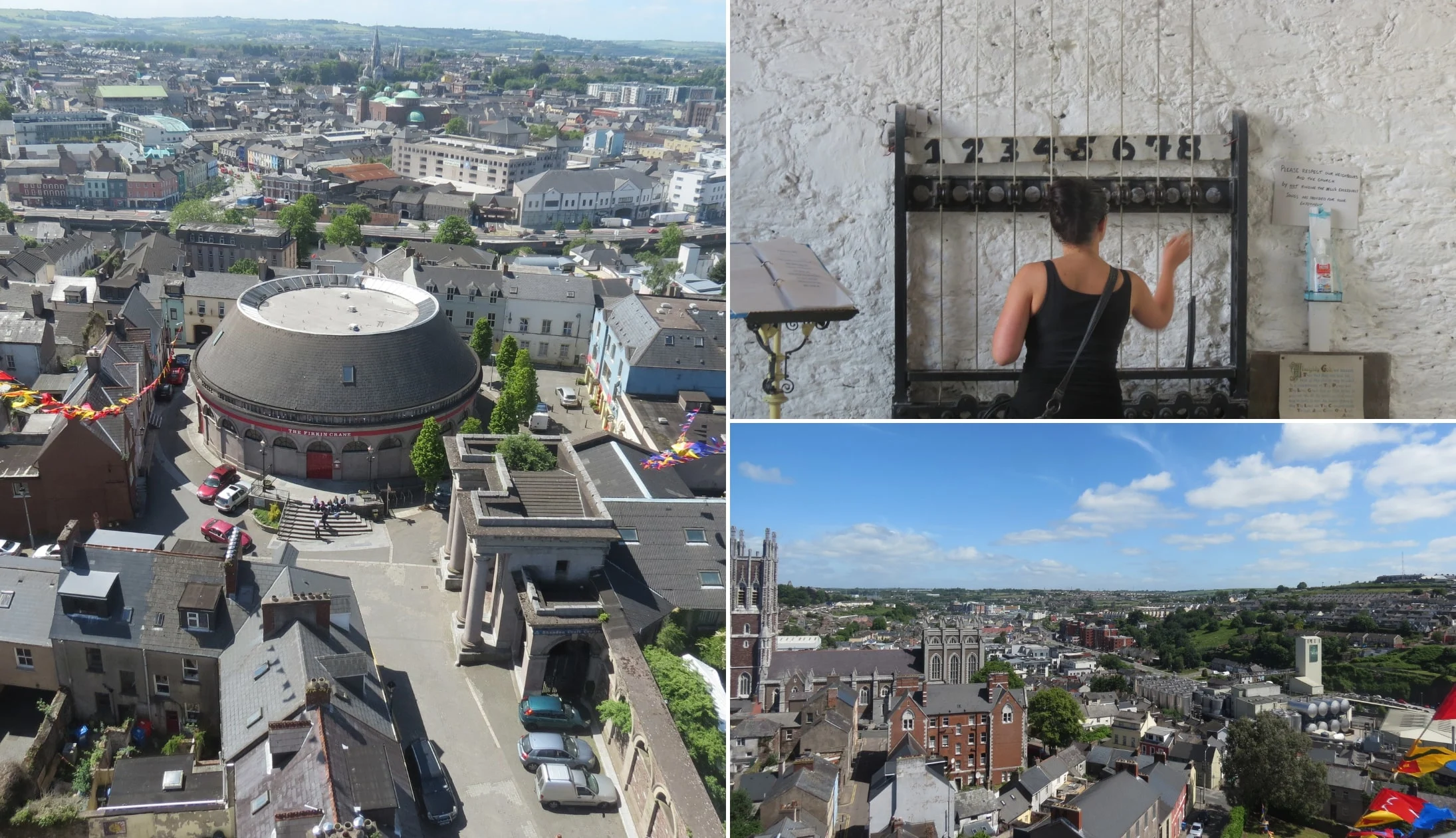
Photos courtesy Catherine Crowley via Tourism Ireland
Shandon Bell Tower is an iconic landmark in Cork City and a must-visit attraction! The tower is a part of the Church of St. Anne, which was built in 1722.
The church was built to replace an old church on the same site that was destroyed during the Seige of Cork in 1690.
You’ll need to pay a small fee to get to the top of the tower, but from the top, you’ll have wonderful views of the city, and you’ll be able to ring the bells!
Stop 3: The Butter Museum
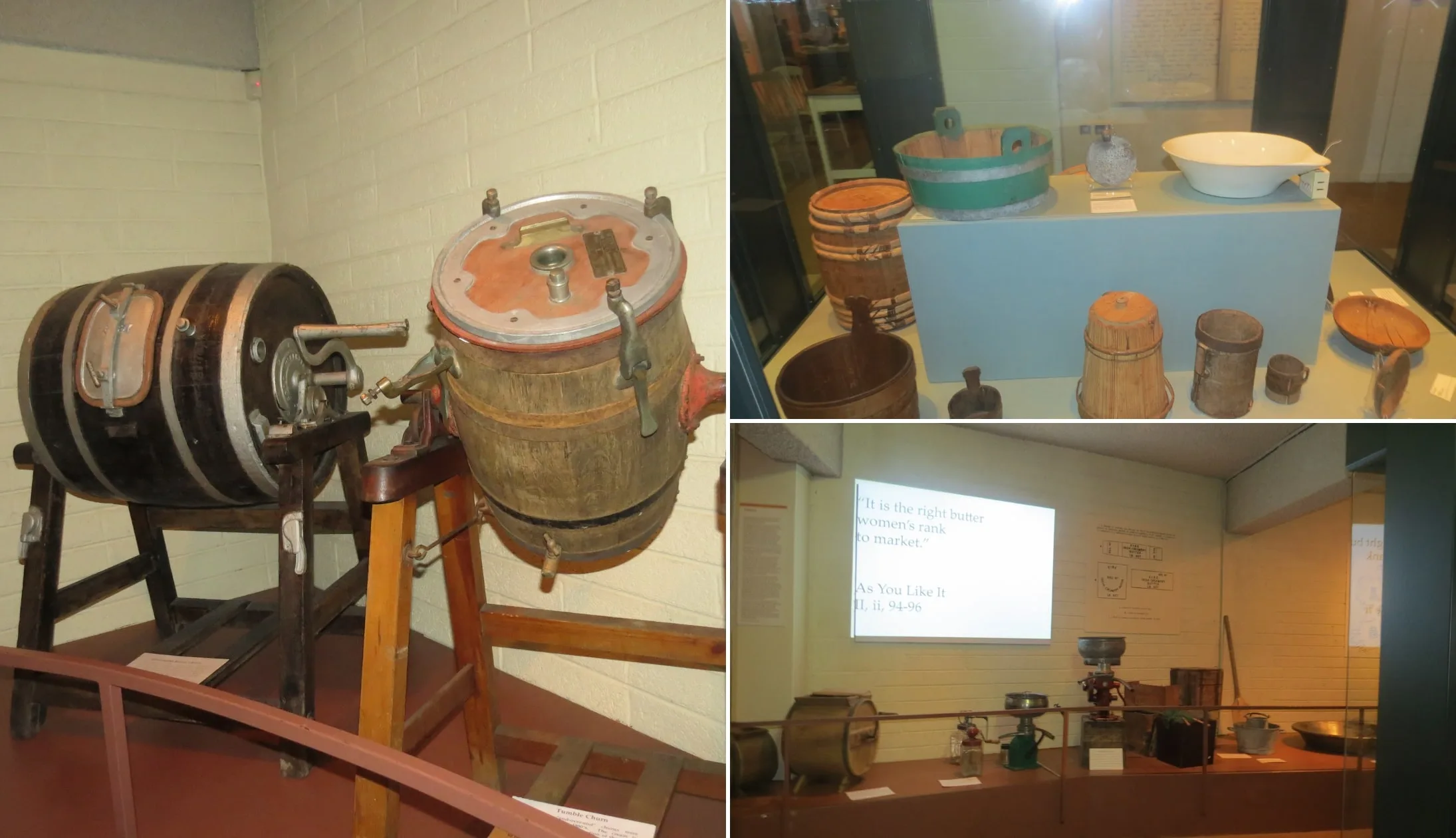
Photos courtesy Catherine Crowley via Tourism Ireland
The Butter Museum is definitely more on the unique side as far as attractions go, but since Cork used to have the largest butter market in Europe, it seems appropriate to visit.
The Cork butter industry is a large part of why Irish butter is so popular to this day.
The museum is a 2-minute walk from the bell tower, with some interesting historical info about the city as well as the butter industry.
Stop 4: Lunch at Myo Cafe
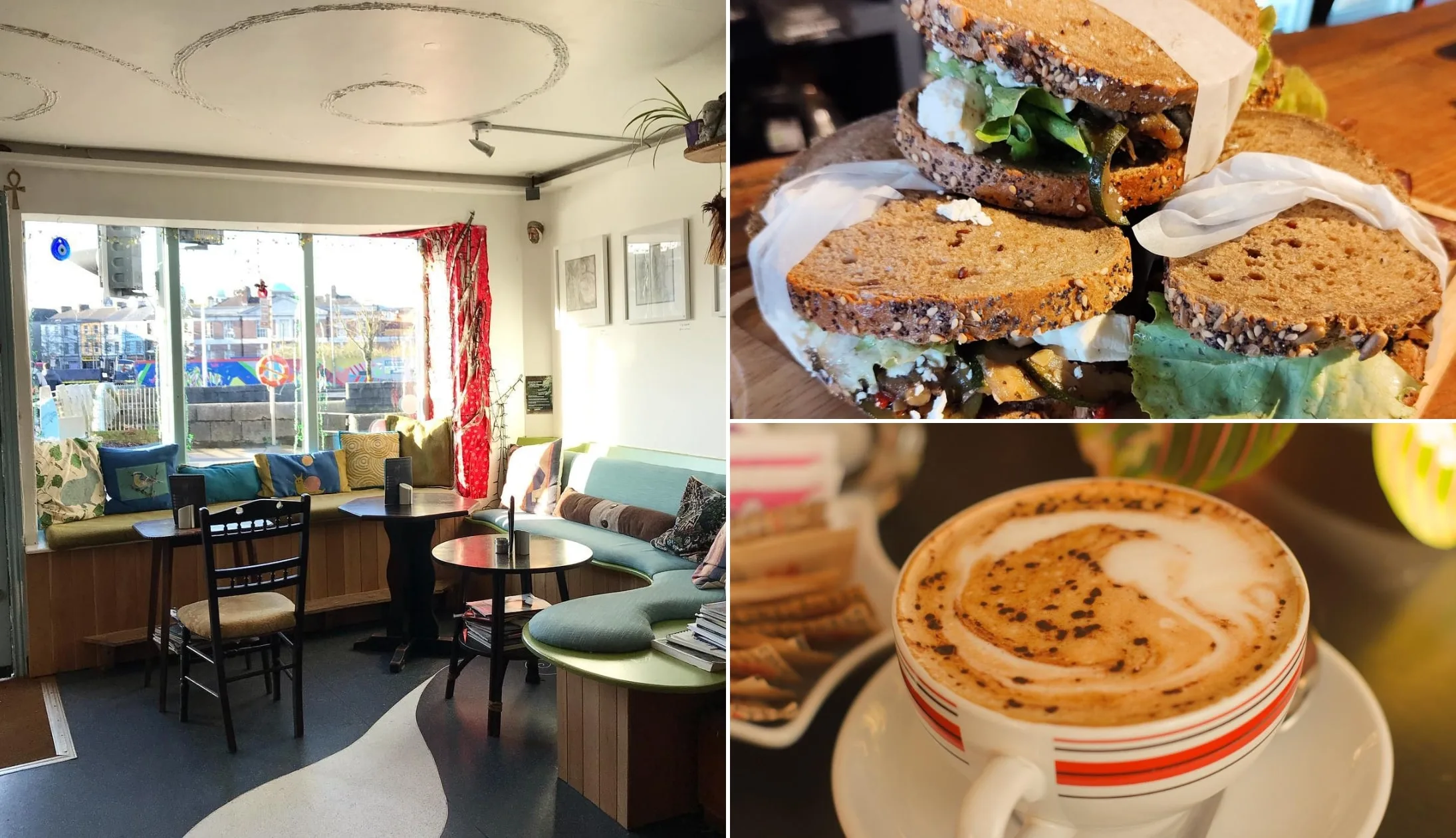
Photos via Myo Cafe on FB
Myo Cafe is a handy 5-minute ramble from the Butter Museum and they’re well known for dishing up a fine bit of grub. Even if you’re not peckish, this is a great little cafe to kick back in with a coffee.
The owners run Myo with a sense of ethical obligation and community well-being and source produce from local suppliers.
Stop 5: The English Market
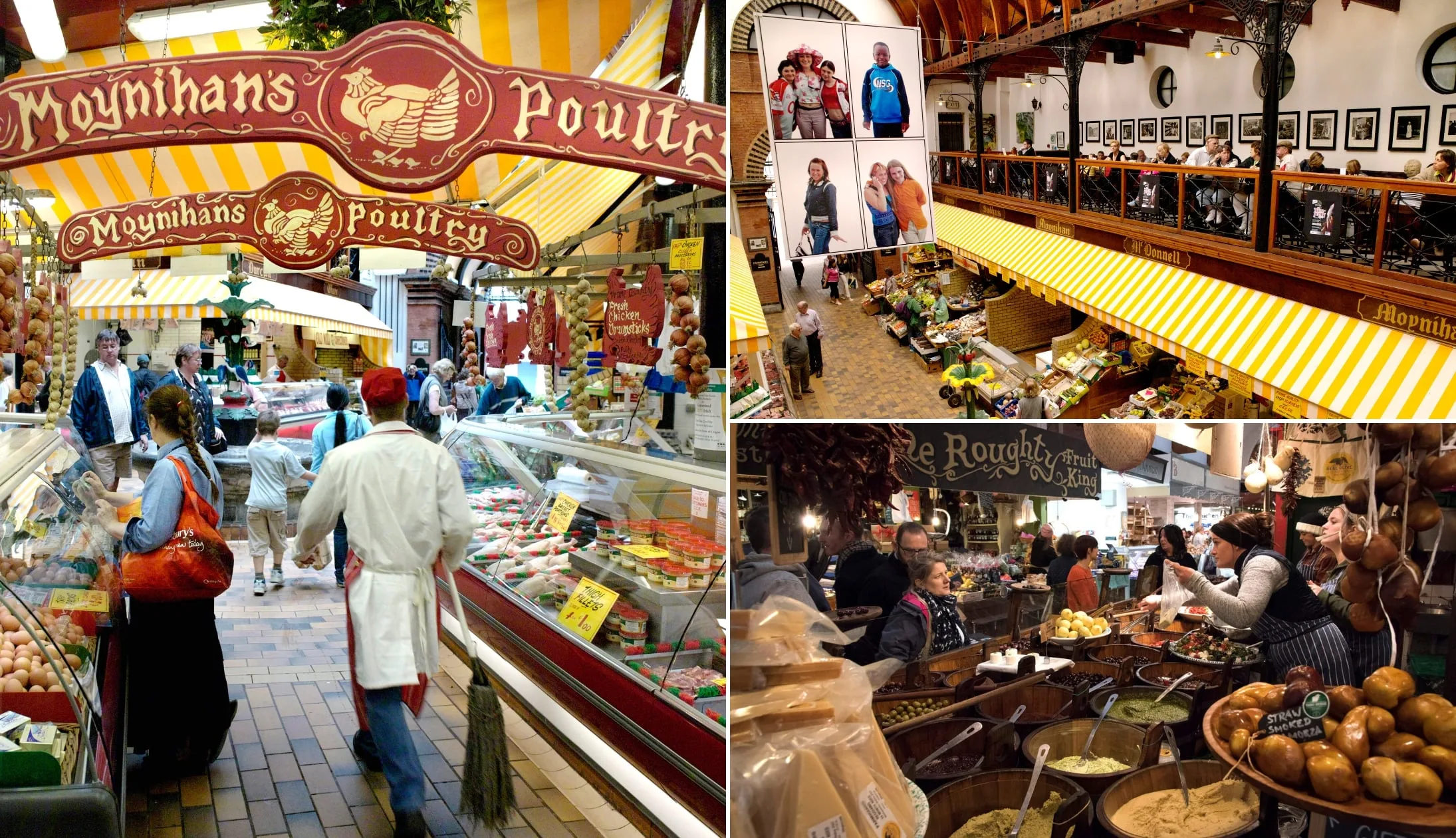
Photos by Chris Hill via Tourism Ireland
The English Market is only 4 minutes away from the Cornmarket. It’s a beautiful covered market with impressive mid-19th-century architecture.
The name “English Market” was to help distinguish it from the Cornmarket, formerly known as the “Irish Market”.
The market dates back to 1788, making it one of the oldest covered markets in Europe. Aside from its history and beautiful architecture, the English Market is known for its delicious food, and you can get everything from artisanal olives to homemade jams.
Stop 6: Elizabeth Fort
Once you’re finished perusing the market, walk the 10 minutes over to Elizabeth Fort. The star-shaped fort dates back to the 17th century and currently sits off Barrack Street in Cork City.
The fort was originally on high ground, but over the years, the city has built up around it, although it still has fantastic views over Cork.
General admission is free, but if you’d like to learn more about this historic fortification, guided tours are offered at 1pm every day (€5), and audio guides are available in multiple languages (€3).
Stop 7: St Fin Barre’s Cathedral
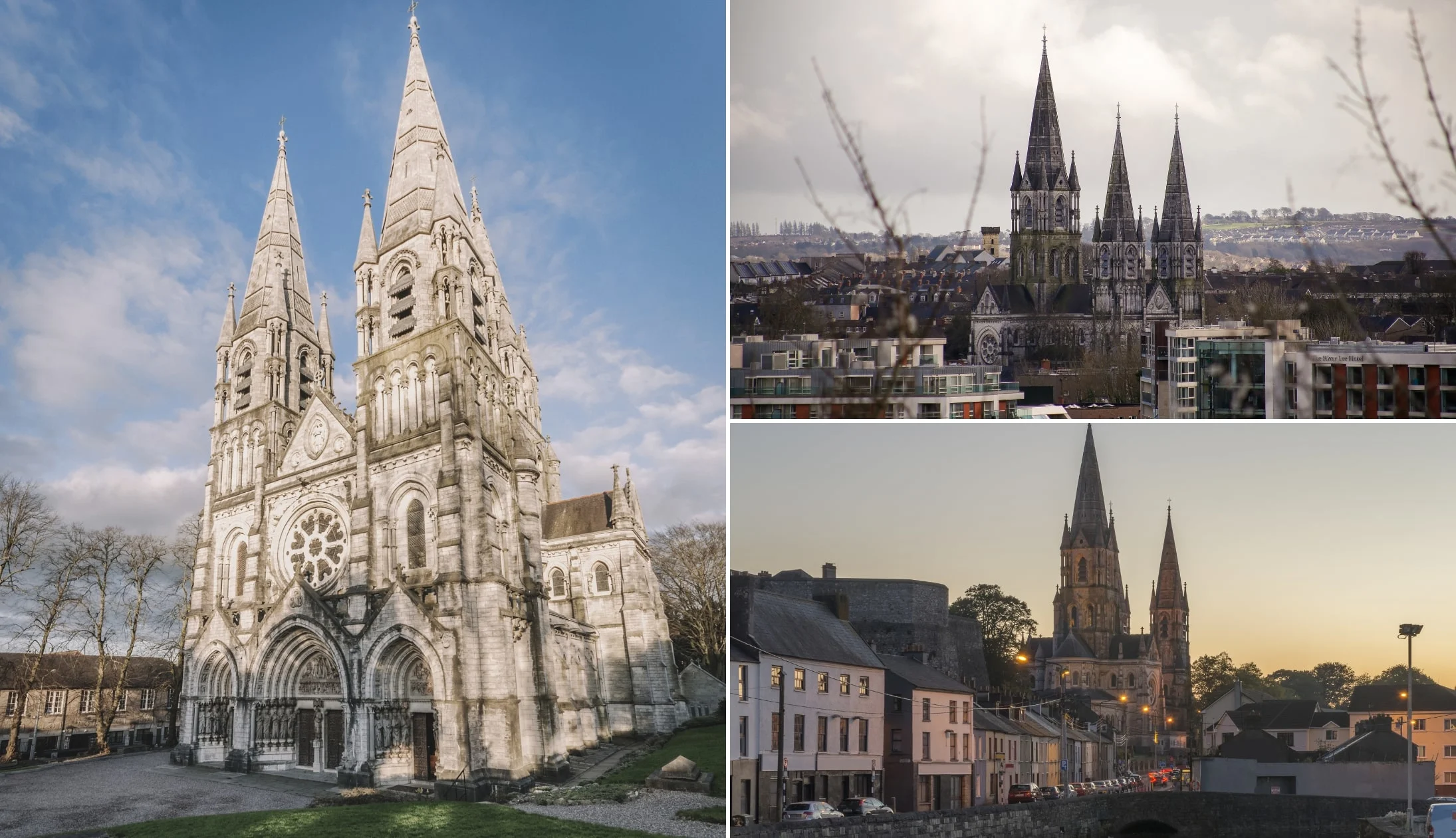
Photos via Shutterstock
St. Fin Barre’s Cathedral is just a short walk over from Elizabeth Fort. It costs €6 to enter and it’s worth every euro.
The Gothic-revival cathedral is magnificent, with three showy spies, impressive stone arches, and gargoyles decorating the outer walls.
Inside it’s even showier, with stone archways lining the sides of the nave, and a total of 74 windows, each with individually designed stained-glass panels.
However, our favourite part is the sanctuary ceiling – look up when you’re inside and you’ll see why!
The cathedral took 14 years to build, from the groundbreaking (1865) to the consecration (1879). It sits on top of a 7th-century Christian site, which is said to have been founded by St. Finbarr.
Stop 8: Cork City for the night
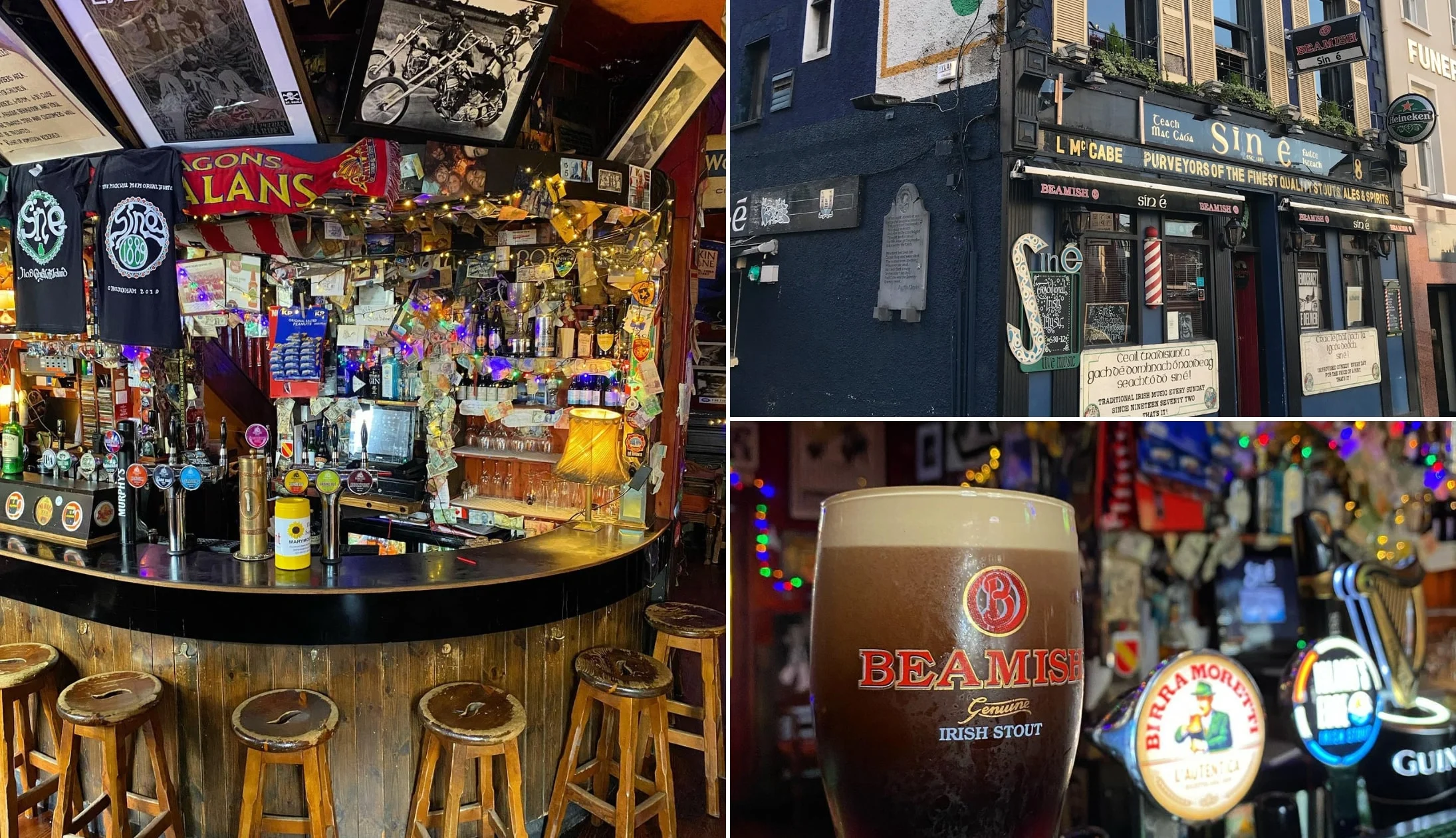
Photos via Sin E on FB
You have endless food and pub options in Cork City, regardless of what it is that you fancy on the night.
Here’s a few recommendations to get you started, but feel free to follow your nose:
Our dinner recommendations
There are heaps of brilliant restaurants in Cork City, but our personal favourites are Market Lane, Old Town Whiskey Bar at Bodega, and Cornstore.
Market Lane has a delicious-sounding menu featuring Irish favourites like pan-fried hake with braised leeks, smoked mussels, and baby potatoes, as well as international dishes like Sri Lankan vegetable curry with tempura aubergine and forbidden rice.
Head to Old Town Whiskey Bar for burgers, salads, and traditional pub grub, and Cornstore for steaks and seafood.
Live music and trad bars
There’s some might old-school pubs in Cork City, too. For drinks, check out Mutton Lane (a quirky traditional pub), The Oval (a historic pub named after its unique oval ceiling), and Castle Inn (a traditional family-run pub with a great atmosphere).
There are some great spots for hearing some trad music in Cork, our top choices are Sin E and The Corner House.
Day 11: Blarney and Cobh
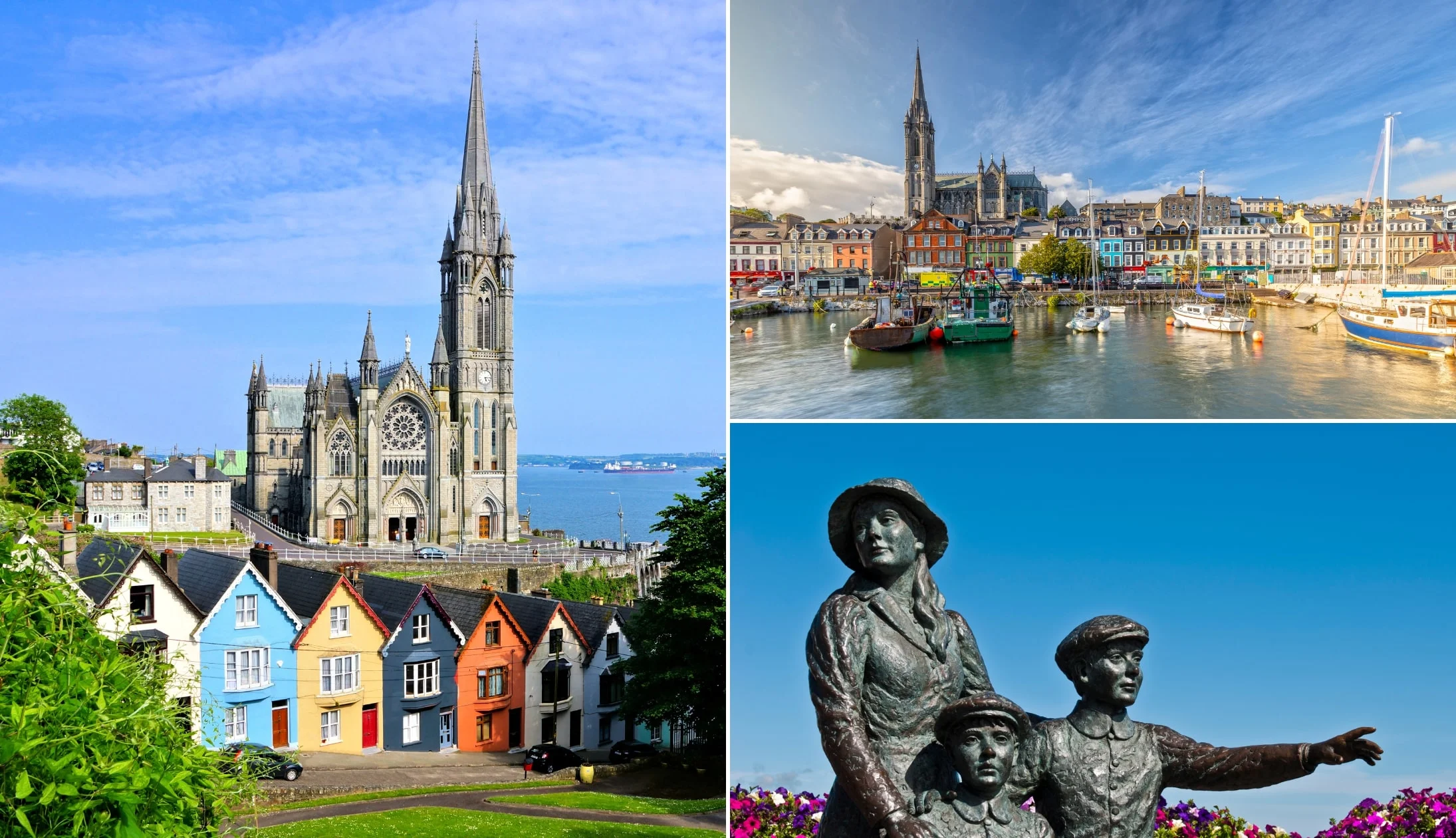
Photos via Shutterstock
It’s the penultimate day of your 12 days in Ireland, and today you’re heading to Blarney and Cobh. Get ready to see castles and cathedrals and to visit the Titanic’s last stop before her tragic end.
Grab a spot of breakfast in Cork before you head out for the day. We like Cafe Gusto and The Farmgate, but you could also wander around the English Market to find somewhere.
We’d recommend this 8-hour day trip that takes you to Blarney Castle and then onto the charming town of Cobh.
We’ll take you through the stops below, but note that 1, you may not always physically stop at all of these sights and 2, these tours are subject to change, so always check with the provider in advance.
Stop 1: Blarney Castle
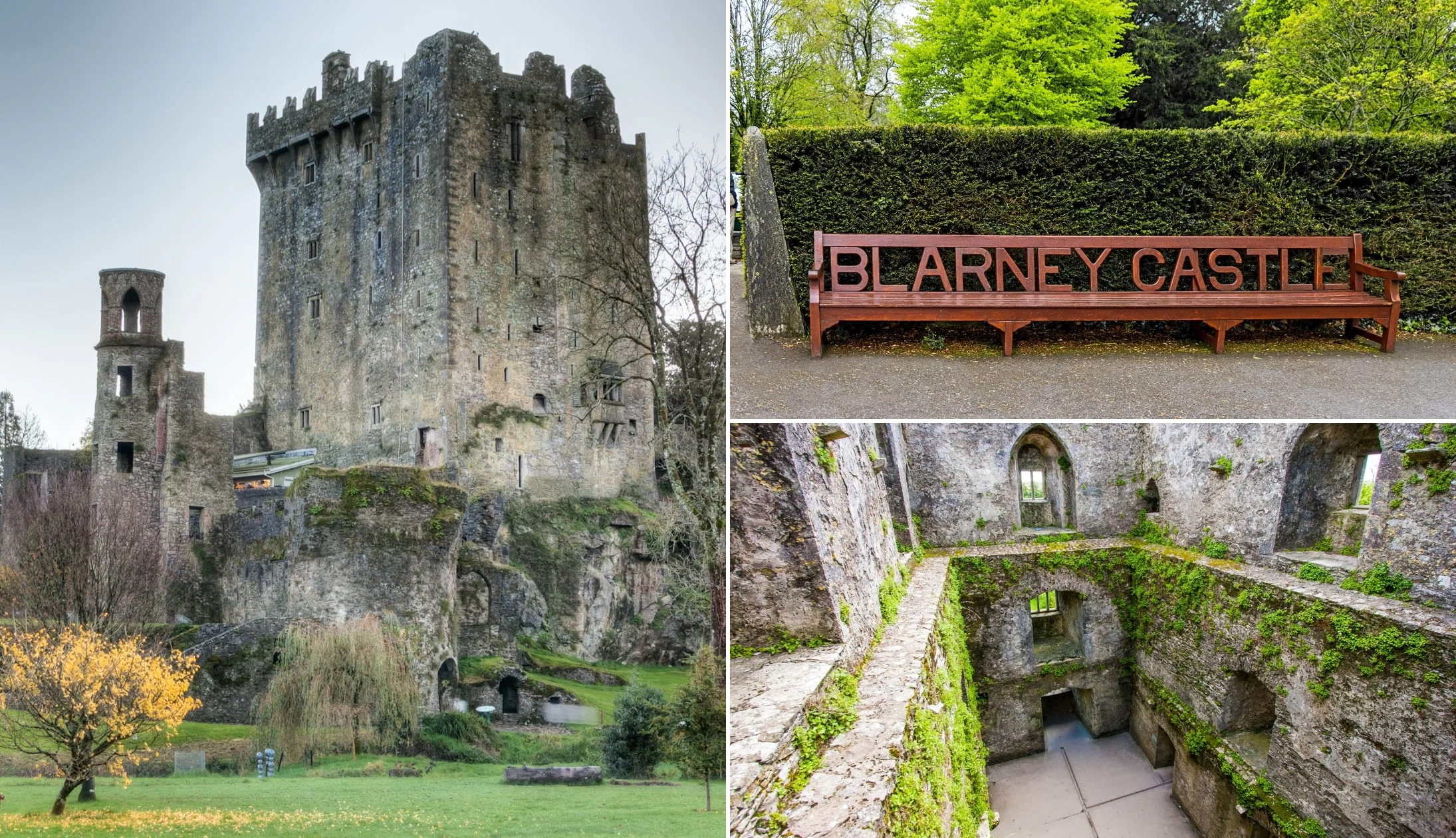
Photos via Shutterstock
Blarney Castle is one of the most famous of the many castles in Ireland. The current castle dates back to 1446, but prior to that, there was another stone castle on the site that dated back to 1210.
Blarney Castle has an interesting history and has changed hands several times.
It was besieged during the Irish Confederate Wars, seized by parliament in 1646, and confiscated in the 1690s during the Williamite War when its owner (the 4th Earl of Clancarty) was captured.
Stop 2: The Blarney Stone
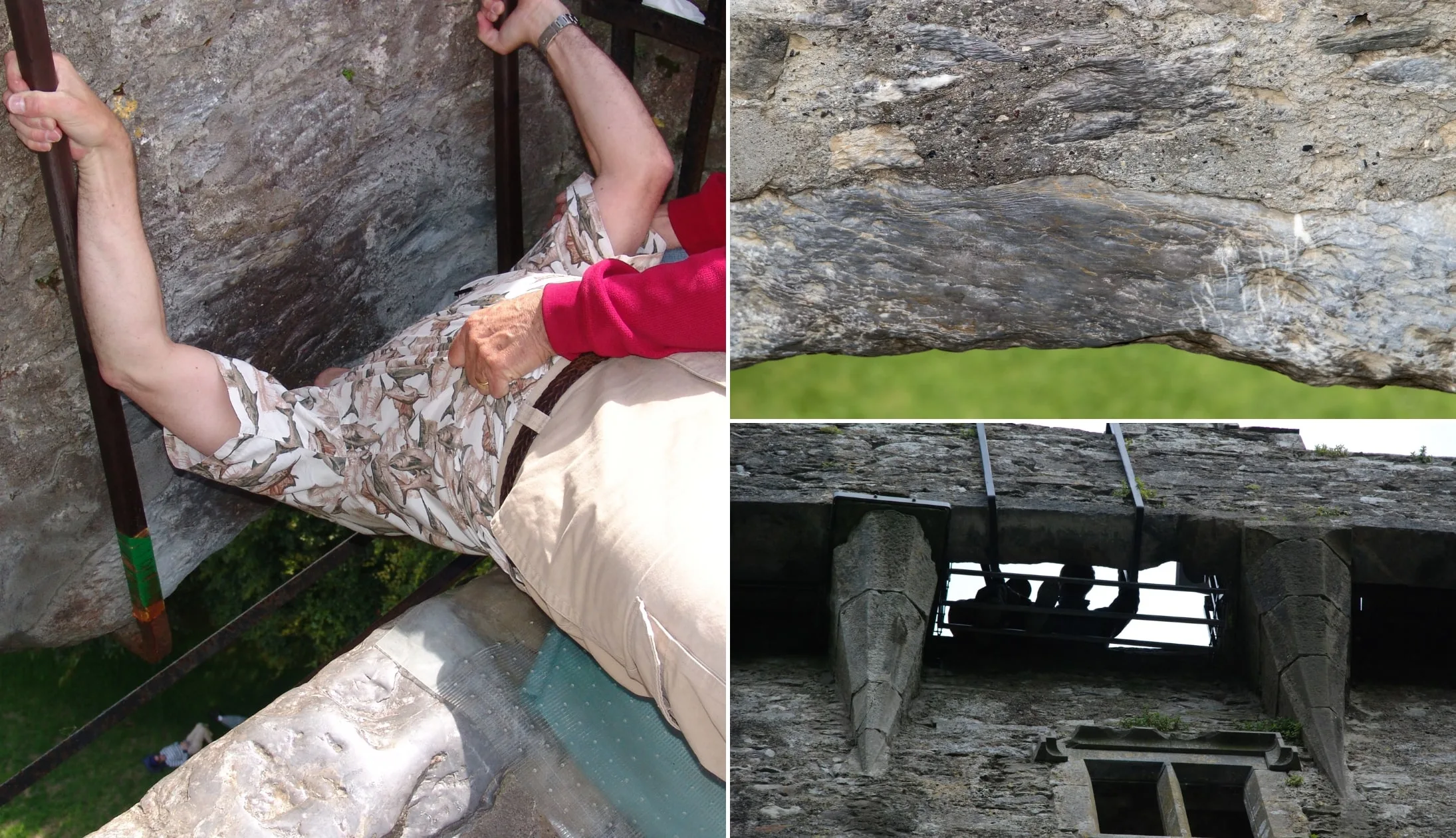
Photos via Shutterstock
The Blarney Stone is a block of grey limestone built into Blarney Castle. According to folklore, anyone who kisses the stone will be given the “gift of the gab” or the gift of flattery and eloquence.
The stone has been set into the castle walls since it was built in 1446, and it’s believed that the practice of kissing the stone dates back to the late 18th century.
Today, it’s a must-do activity in the castle, although it’s not easily achieved! To kiss the stone, you’ll need to be on your back and edge yourself closer to the stone to kiss it upside down.
There’s a large gap between the floor and the stone, but nowadays, thanks to health and safety regulations, there are metal bars to prevent you from falling if you slip through the gap.
There are several origin stories of how kissing the stone came about, from tales involving goddesses to Queen Elizabeth I, to 15th-century lawsuits.
Stop 3: Cobh

Photos via Shutterstock
Cobh is a historic coastal town in Cork City harbour that’s beautiful to stroll around regardless of the time of year.
It was the last stop of the Titanic before it departed for New York and home to St. Colman’s Cathedral.
Stop 4: St Colman’s Cathedral
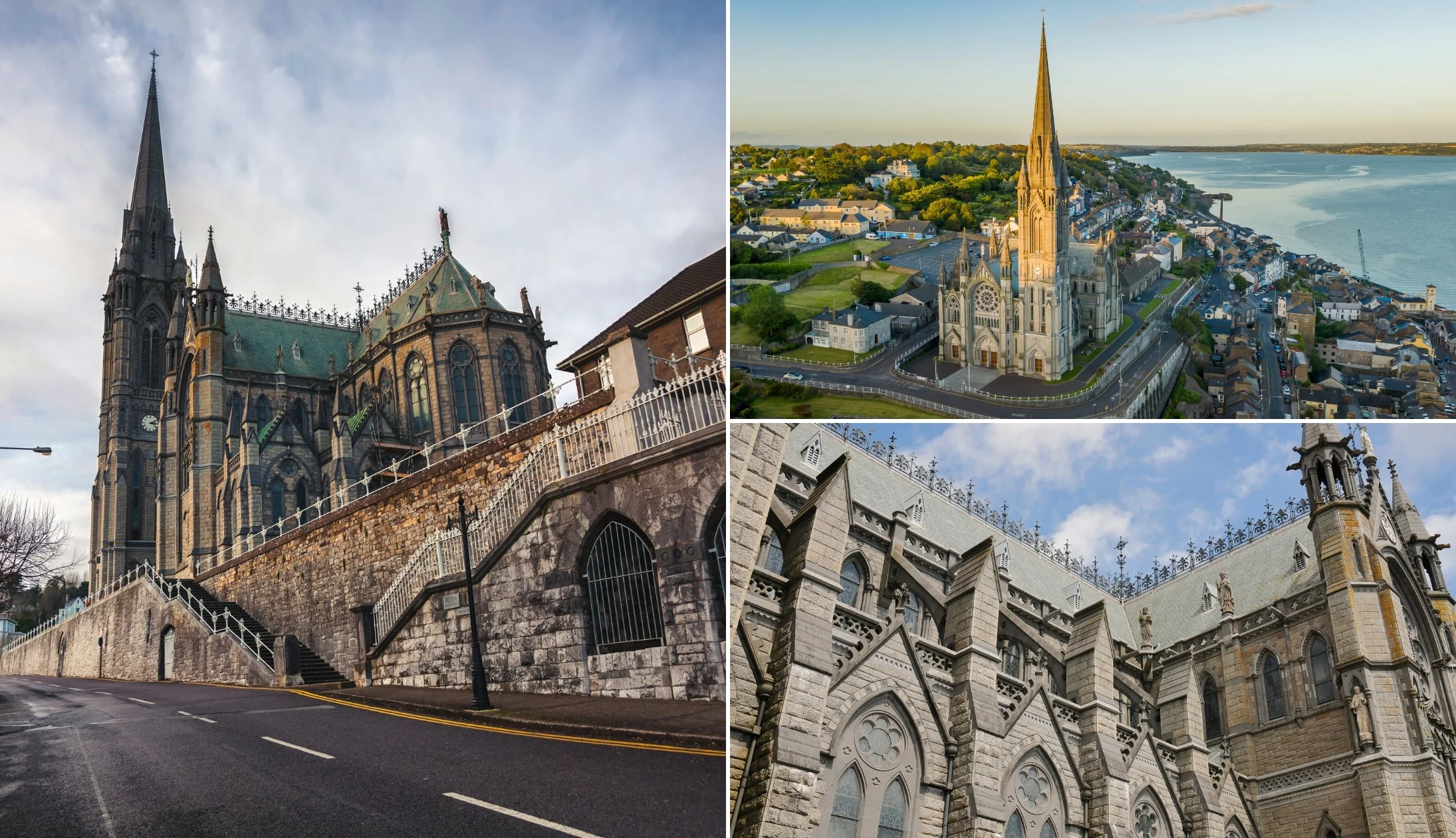
Photos via Shutterstock
Cobh Cathedral, or St. Colman’s Cathedral, is one of Cobh’s iconic landmarks. It’s a gorgeous cathedral with large stained-glass windows, intricate carvings, and an impressive 90-metre spire that dominates the town’s skyline.
It took 51 years from the first cornerstone being laid to the cathedral’s consecration. Building the cathedral was a mammoth project and cost well over the initial budget.
It’s just as beautiful on the inside as it is from the outside, with large stone arches, pillars, and red marble shrines.
The cathedral is on top of a hill, so you’ll have great views over Cork Harbour.
Stop 5: Titanic Experience
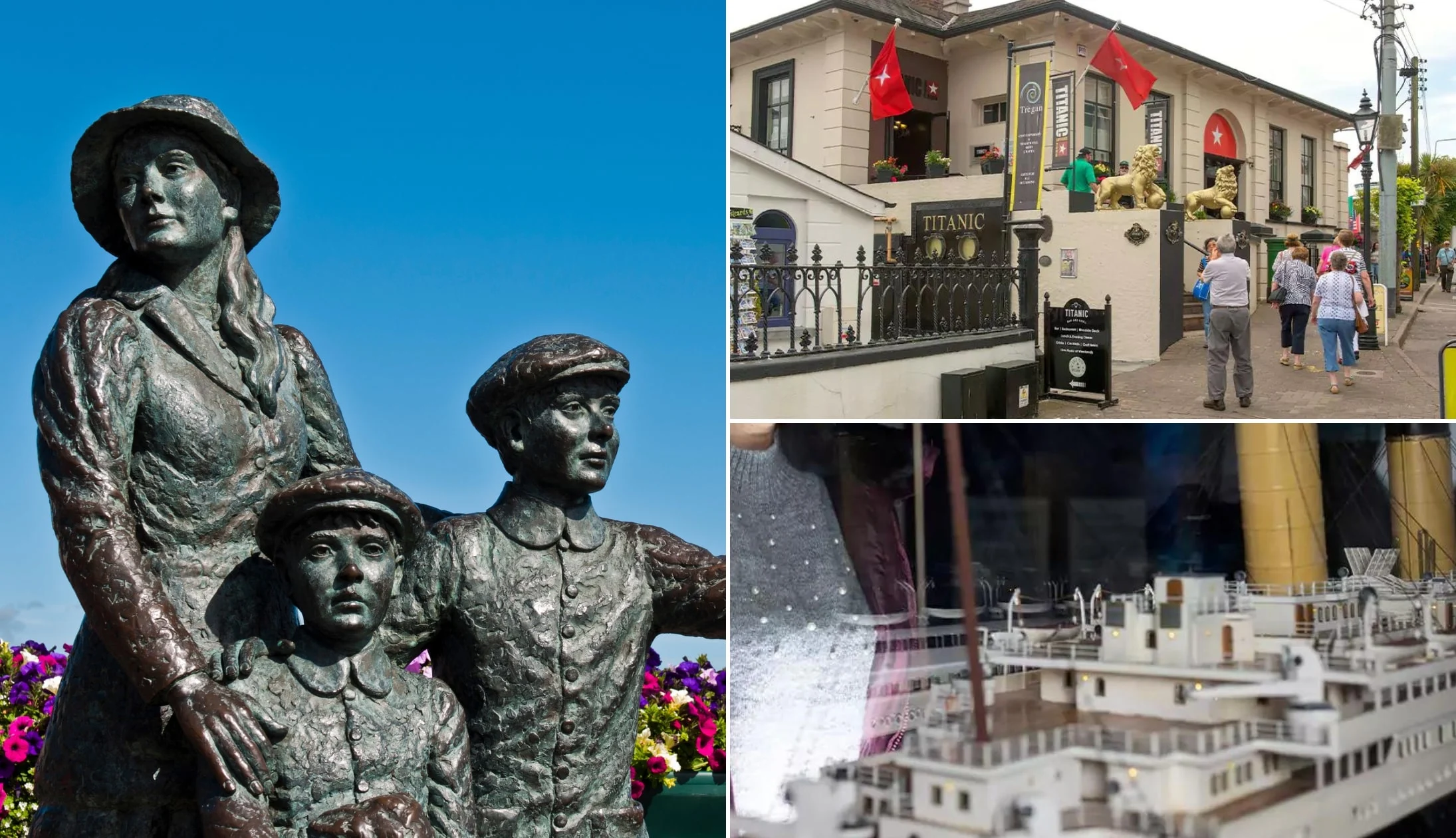
Photo left: Shutterstock. Others: Via Titanic Experience Cobh
The Titanic Experience gives visitors an immersive insight into what life was like aboard the Titanic.
It includes a 30-minute tour where you’ll experience an incredible cinematographic experience of the ship sinking.
Aside from the tour, the experience has several exhibitions telling the personal stories of the passengers, the role of the RMS Carpathia in rescuing survivors, and much more.
Stop 6: Back to Cork for the night

Photos via Sin E on FB
After the day’s activities are finished, it’s time to head back to Cork for your final night.
Tonight, we recommend Tom Barry’s, an institution in the city and a great place for a pint and a pizza. From there, you can walk over to O’sho, a modern little pub with pints and speciality cocktails.
Day 12: Back to Dublin

Photos via Shutterstock
Today depends on your schedule. If you’re flying home, leave Cork early and get to Dublin Airport with enough time to allow for any delays en route.
Here’s what you need to know about your two options for getting from Cork to Dublin.
Option 1: Train
You can get the train direct to Dublin City with Irish Rail from Cork’s Kent Station. The advantages of the train are that it’s nice and comfortable.
The disadvantages are it only goes to Dublin City, so you’ll need to make your way to the airport from there. If you’re getting the train, head to Heuston Station.
From there, you can take the Dublin Express to the airport, which takes between 45 minutes to 1 hour, depending on traffic.
Option 2: Bus
GoBus and Aircoach both get you to Dublin City and Dublin Airport from Cork.
It takes at least 3.5 hours, so make sure to give yourself plenty of time if you need to catch a flight.
And that’s a wrap on this road trip

Photos via Shutterstock
We hope you found the above road trip guide useful. If you have any questions, ask in the comments below and we’ll do our best to help.
Or, if you’d like to browse our other Irish Road Trip itineraries, visit our Road Trip Hub – cheers!
Keith O’Hara has lived in Ireland for 35 years and has spent most of the last 10 creating what is now The Irish Road Trip guide. Over the years, the website has published thousands of meticulously researched Ireland travel guides, welcoming 30 million+ visitors along the way. In 2022, the Irish Road Trip team published the world’s largest collection of Irish Road Trip itineraries. Keith lives in Dublin with his dog Toby and finds writing in the 3rd person minus craic altogether.

